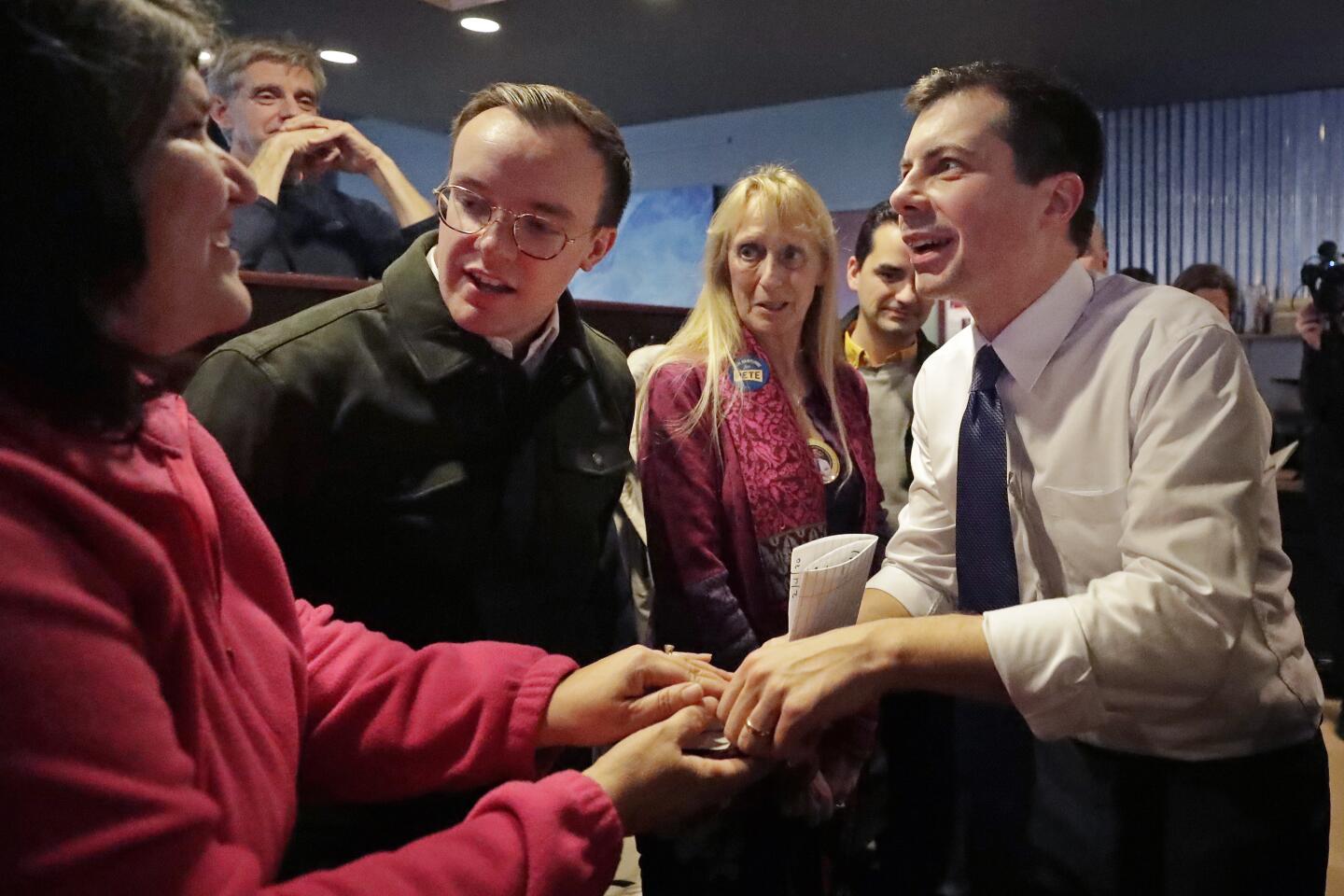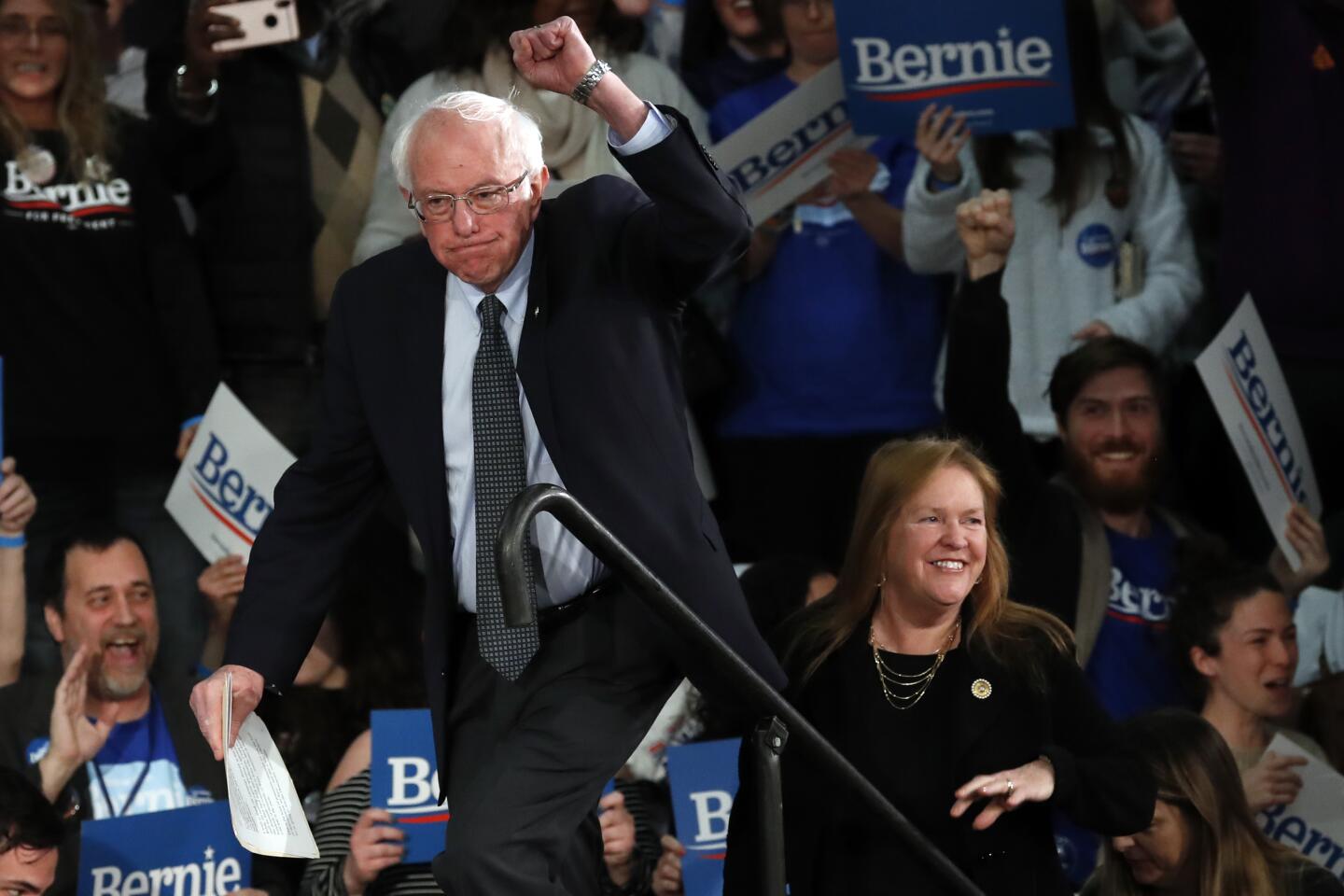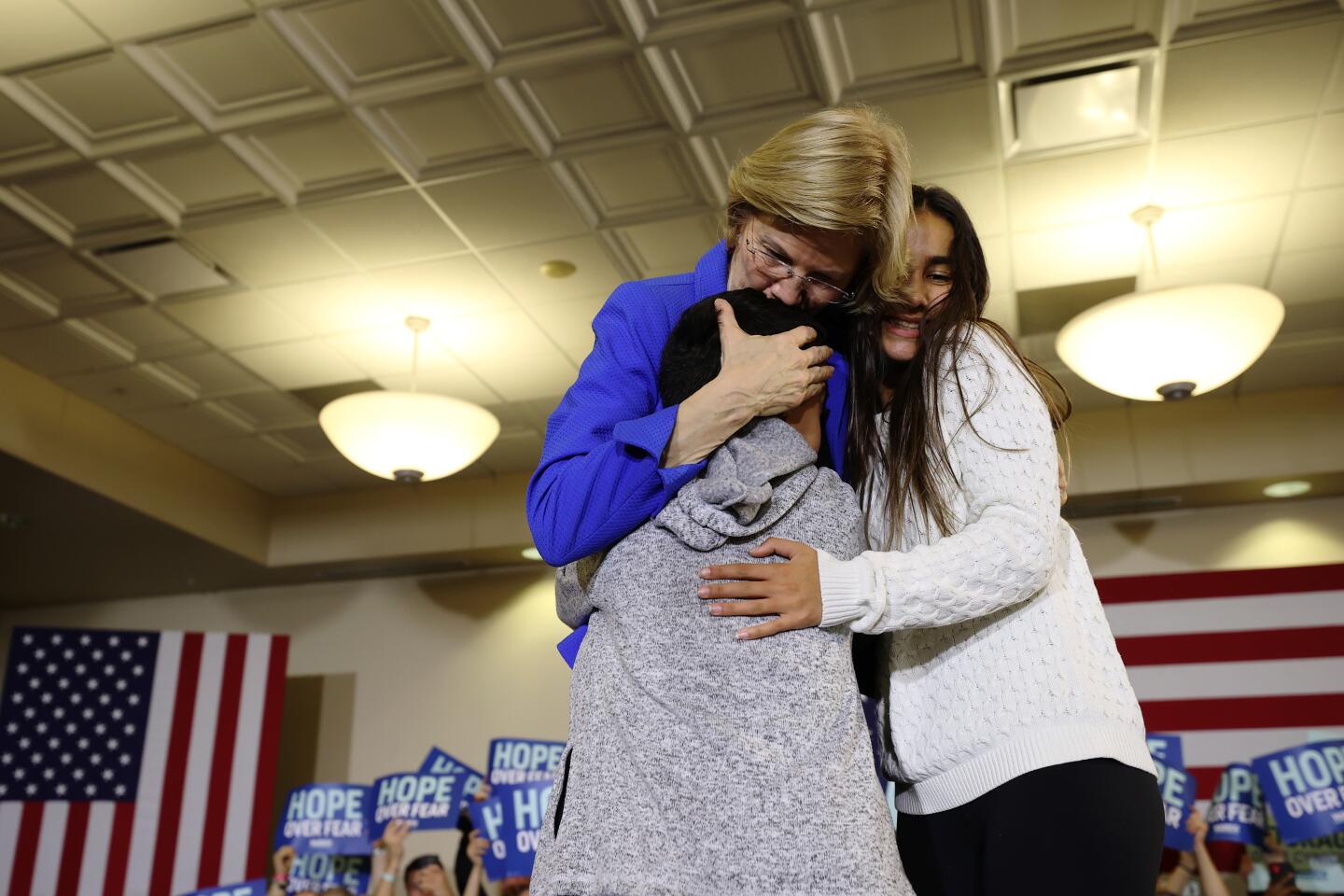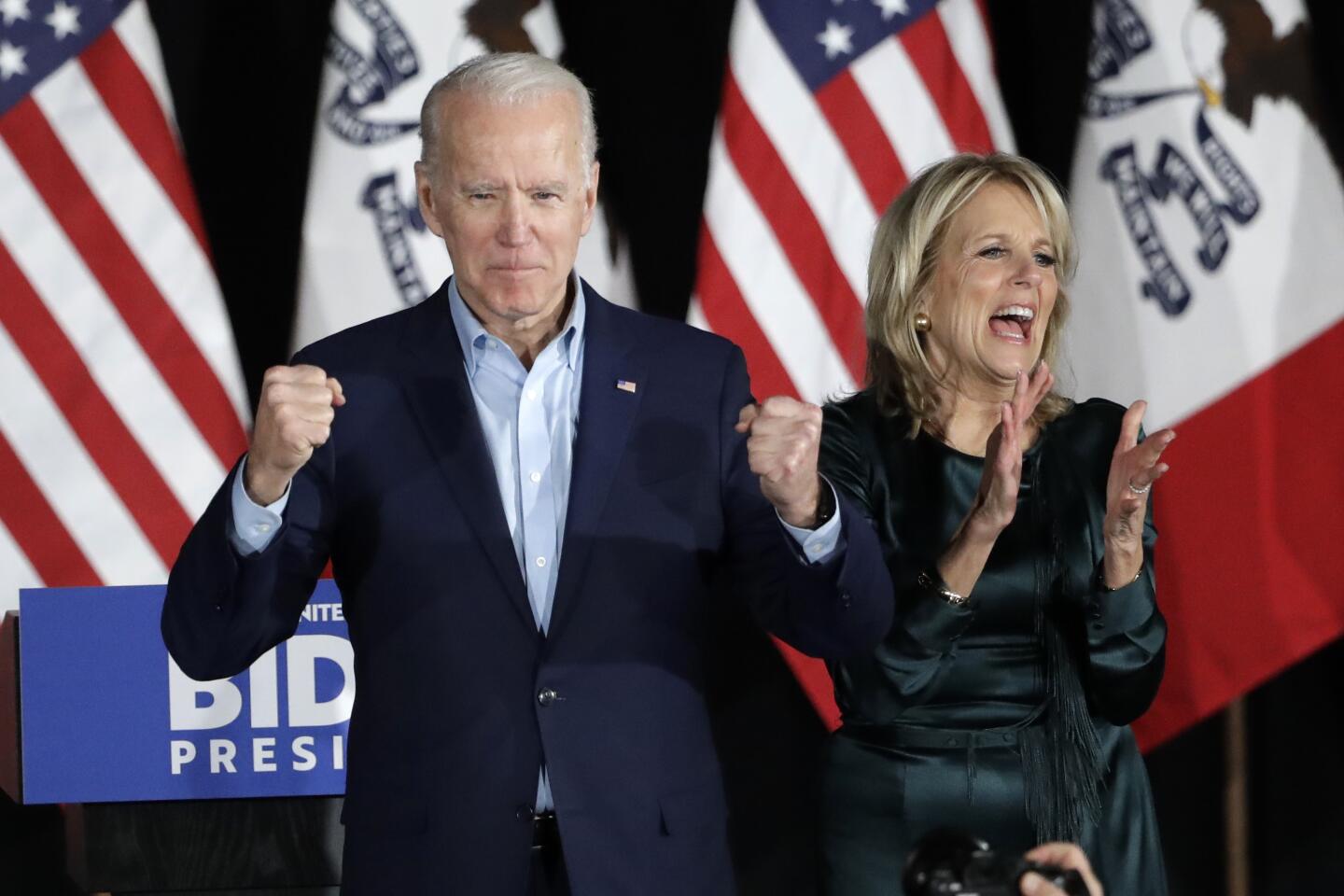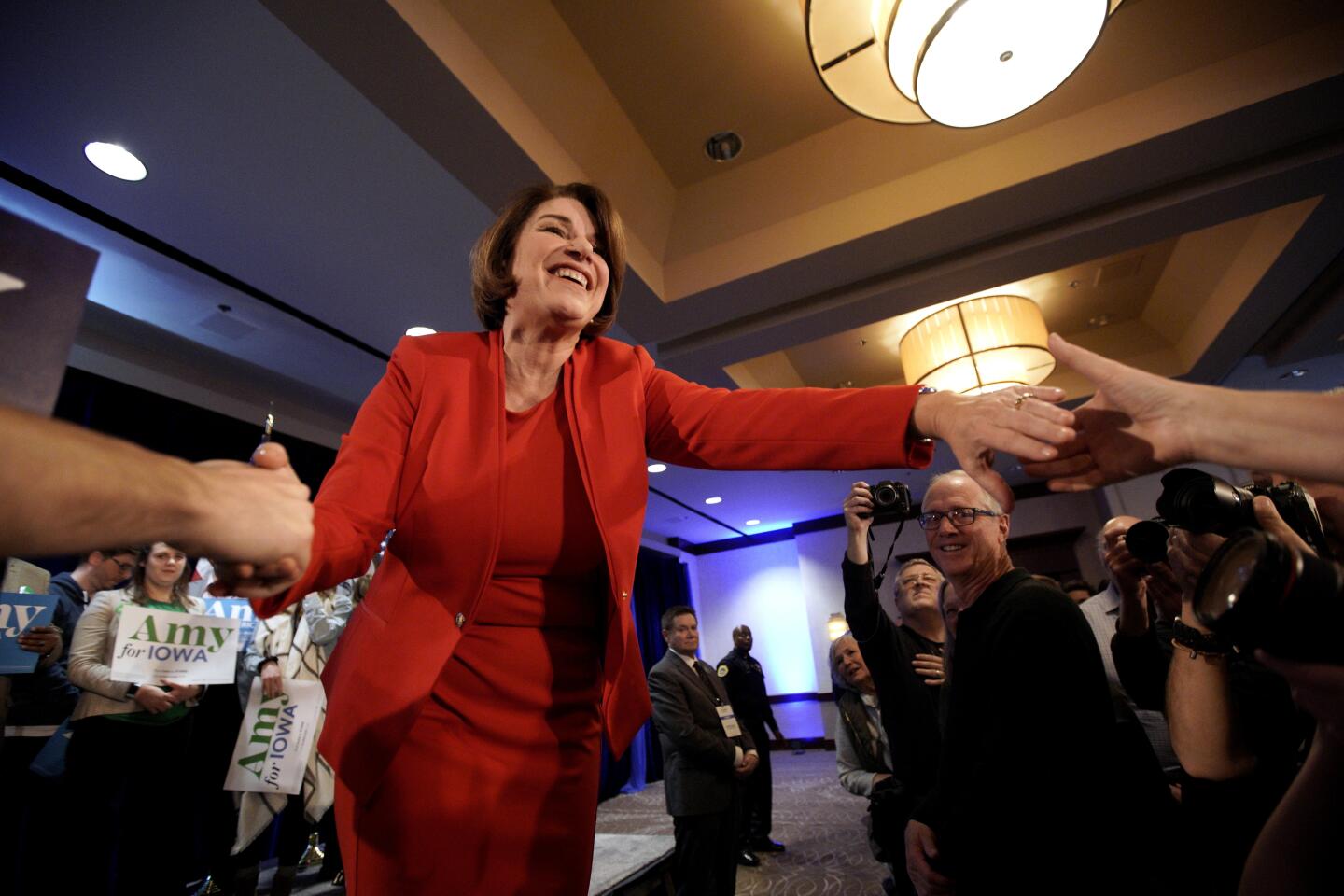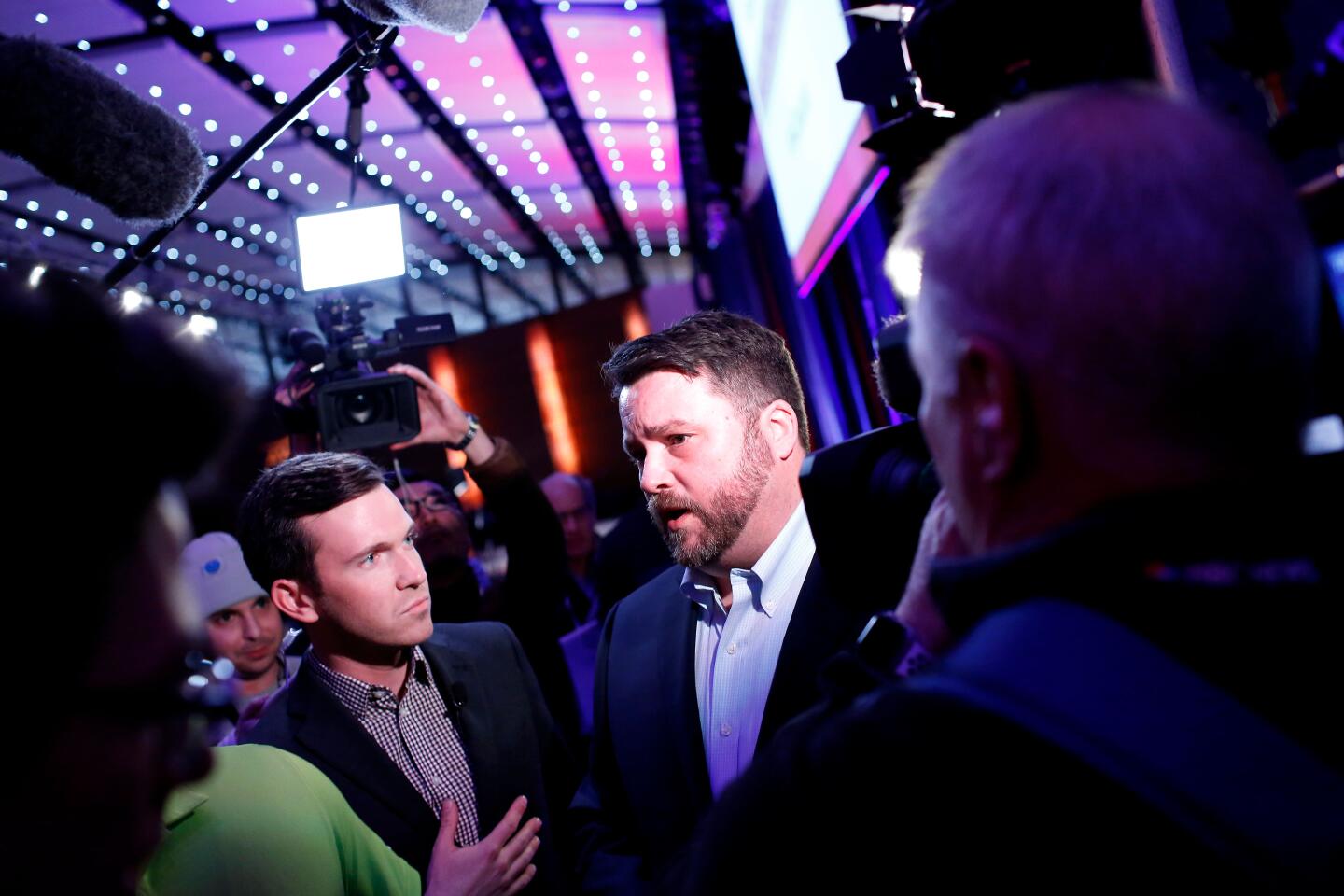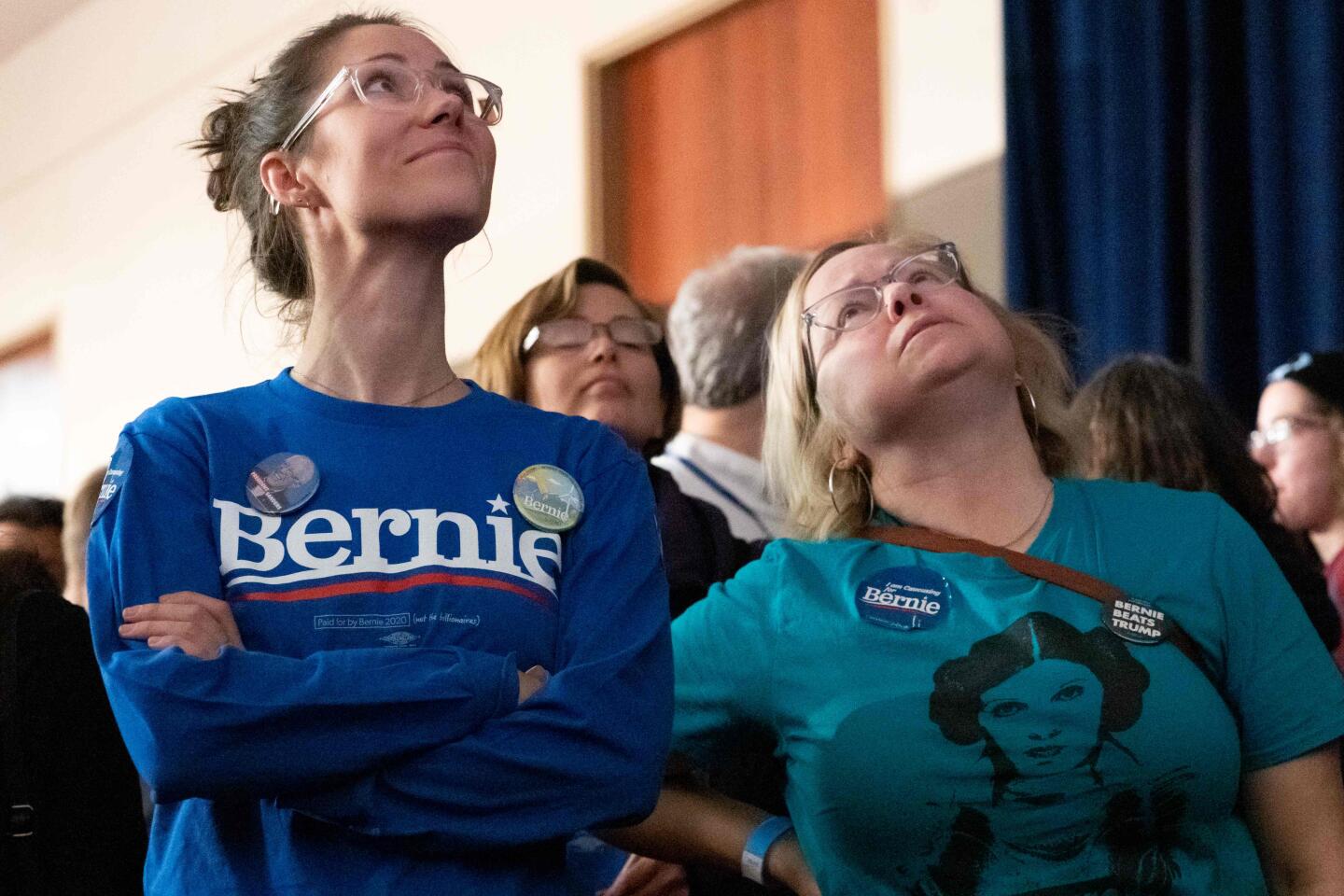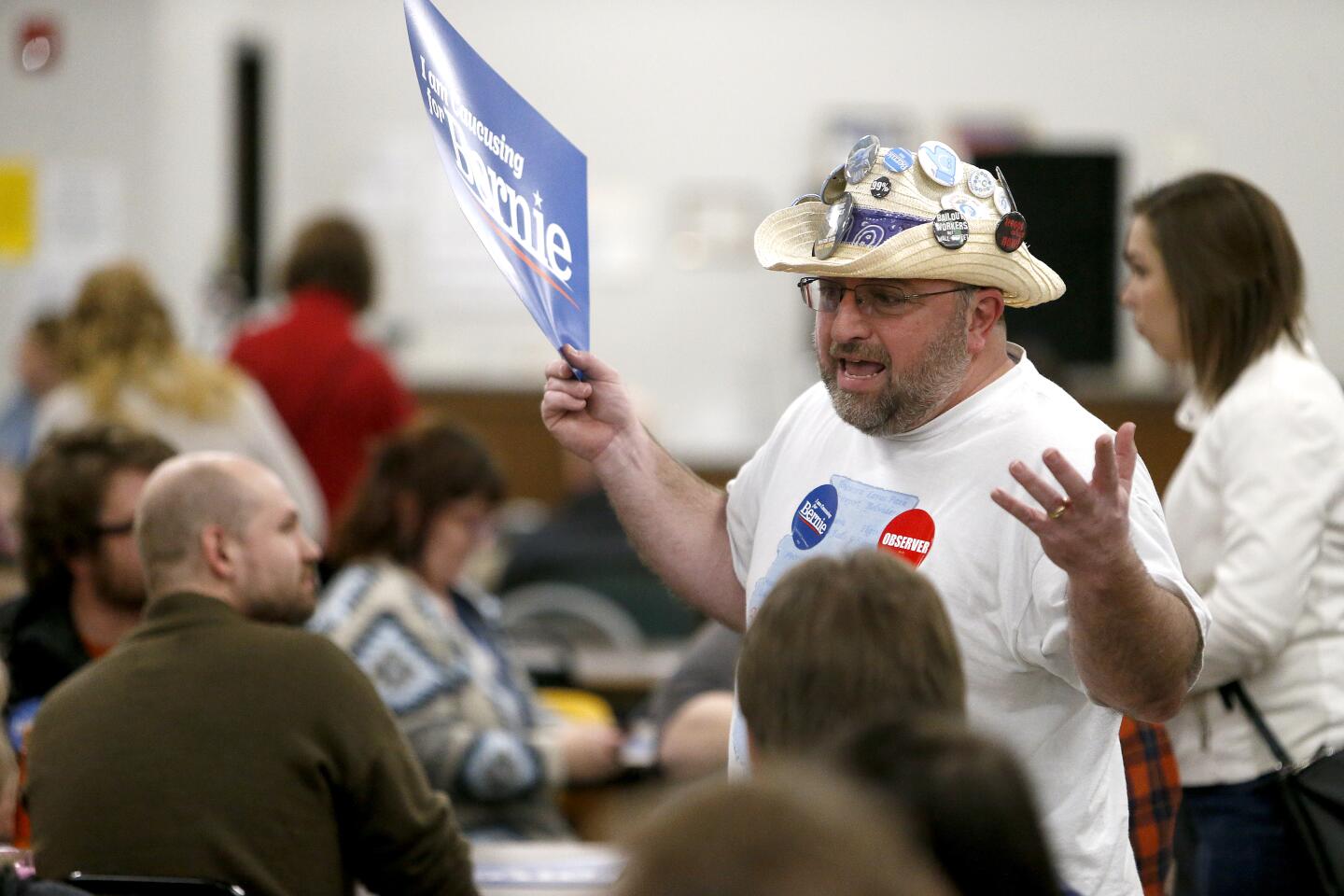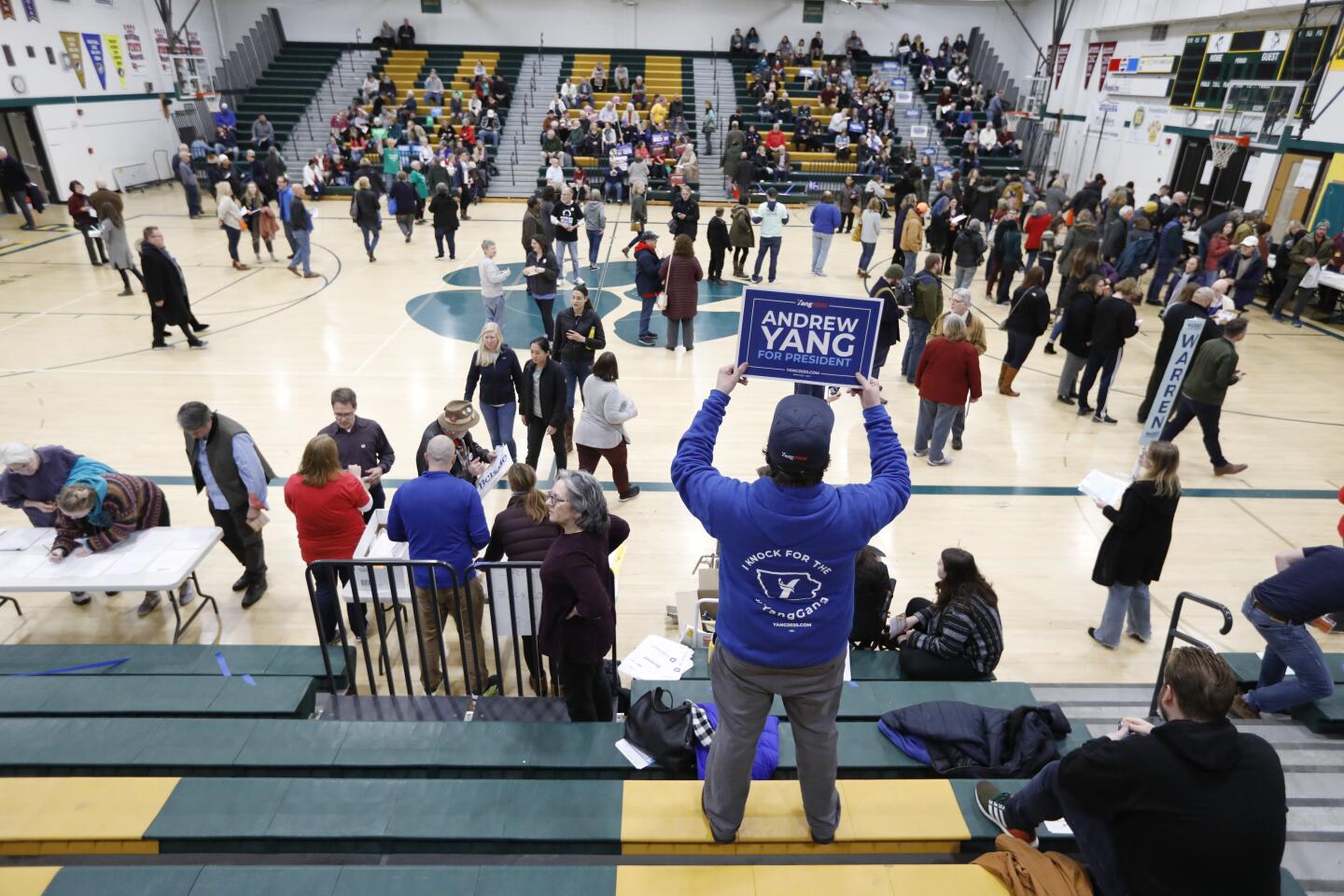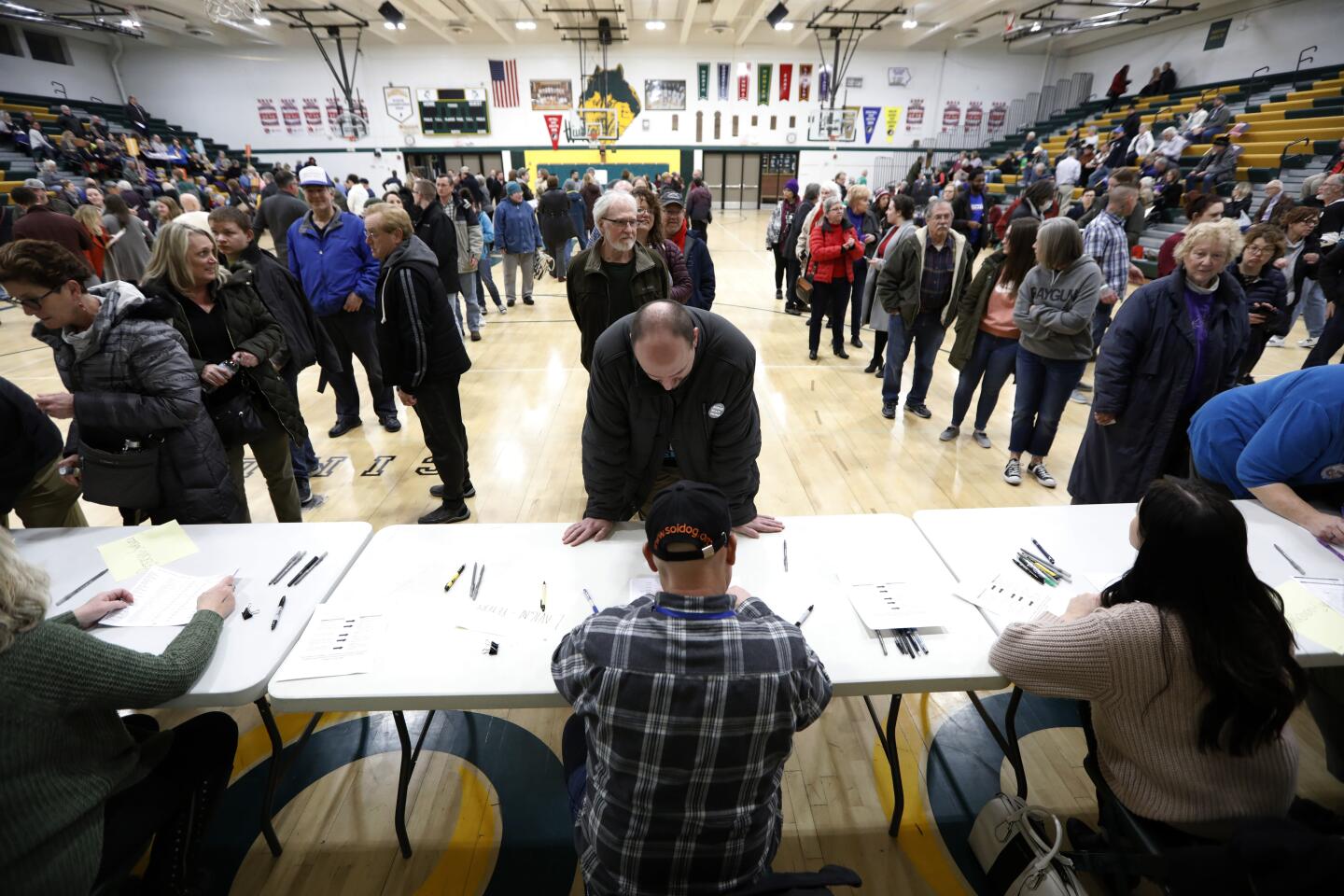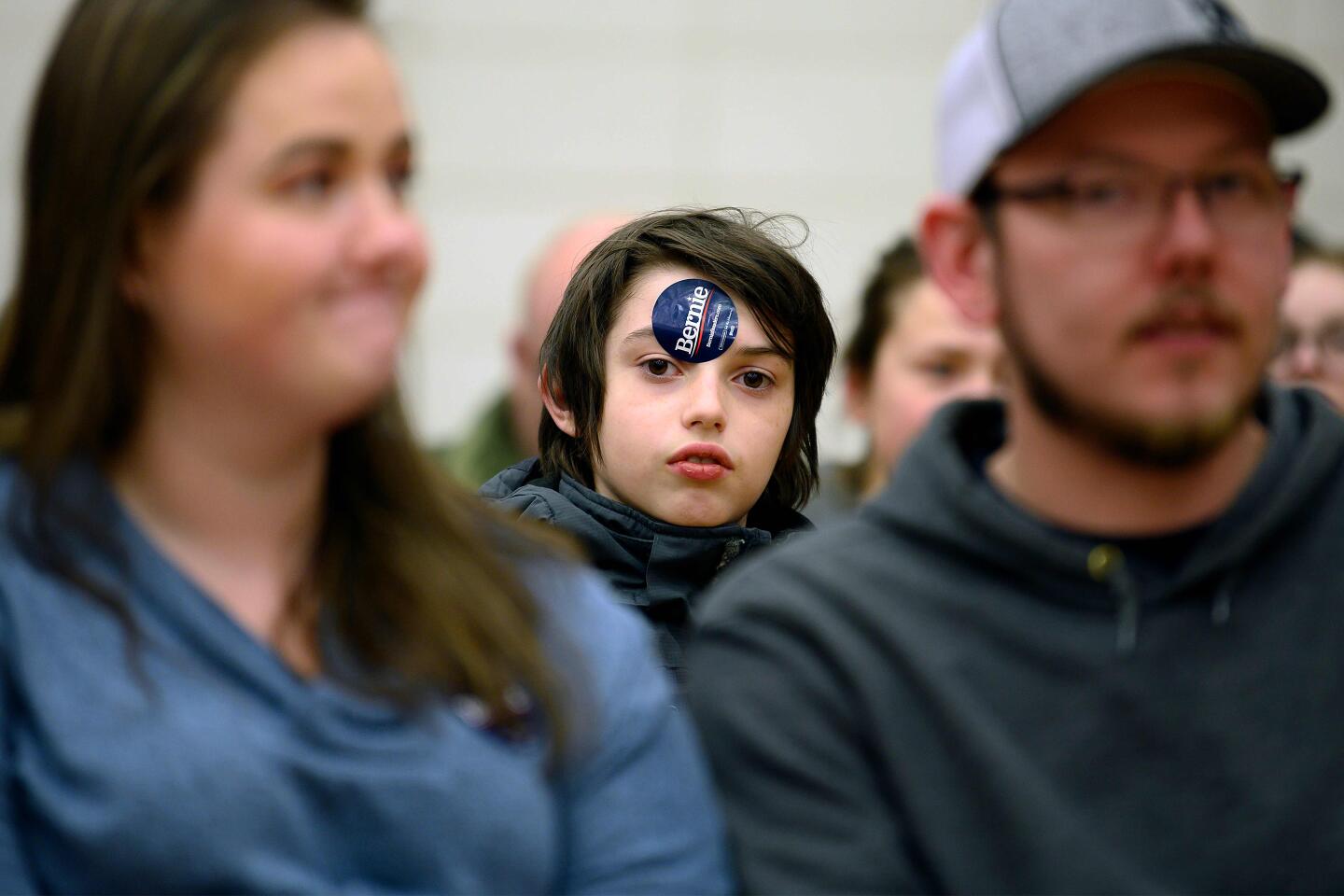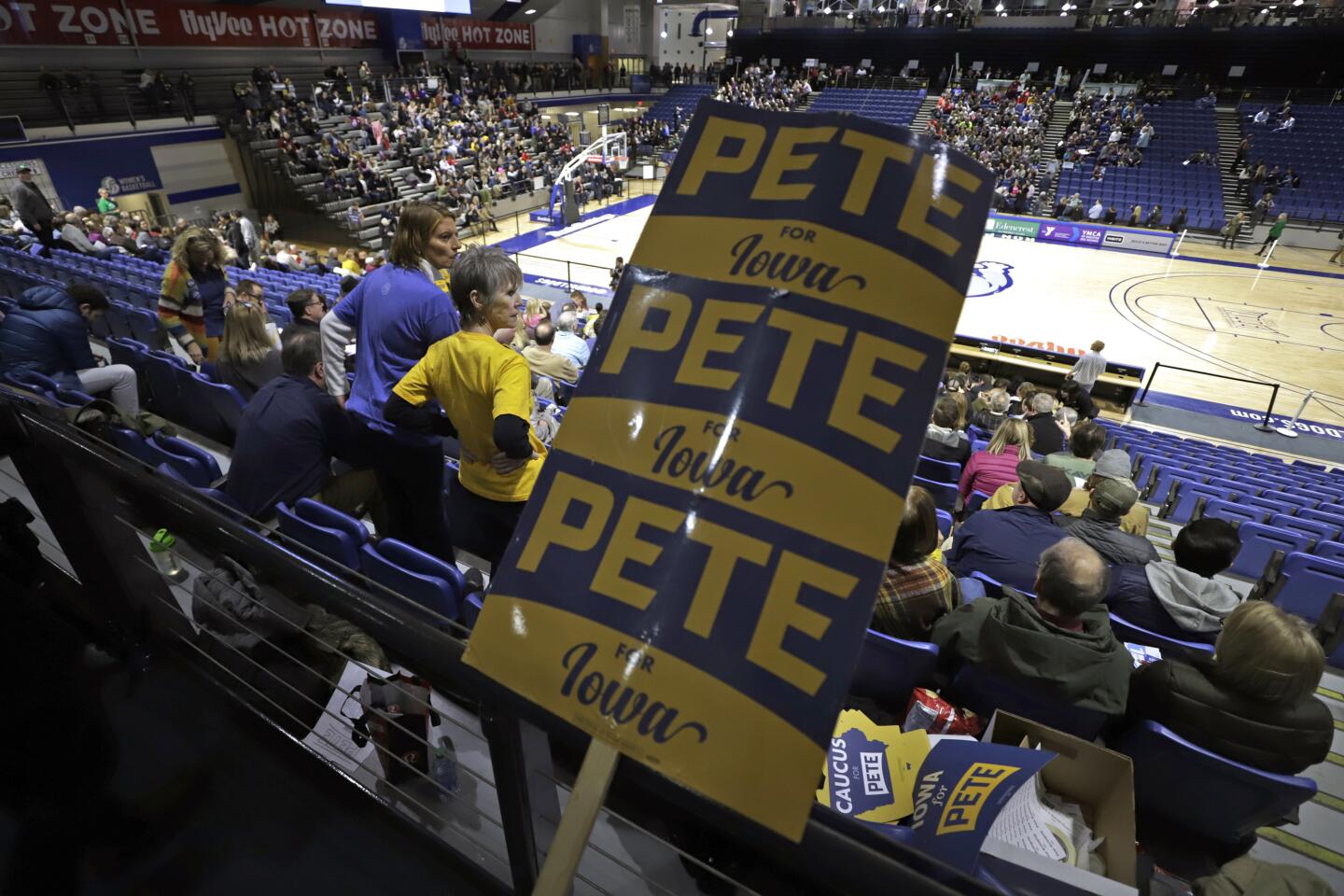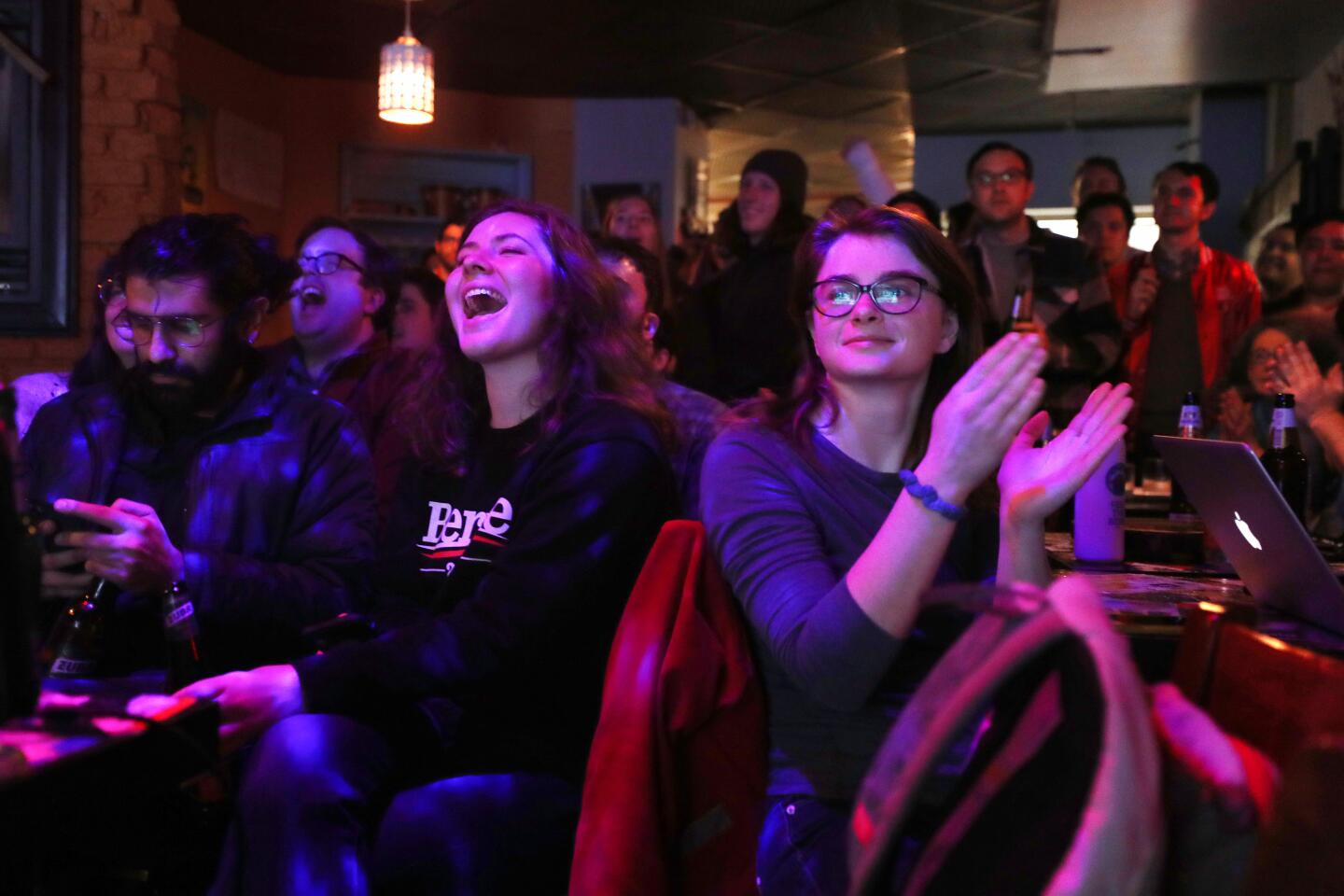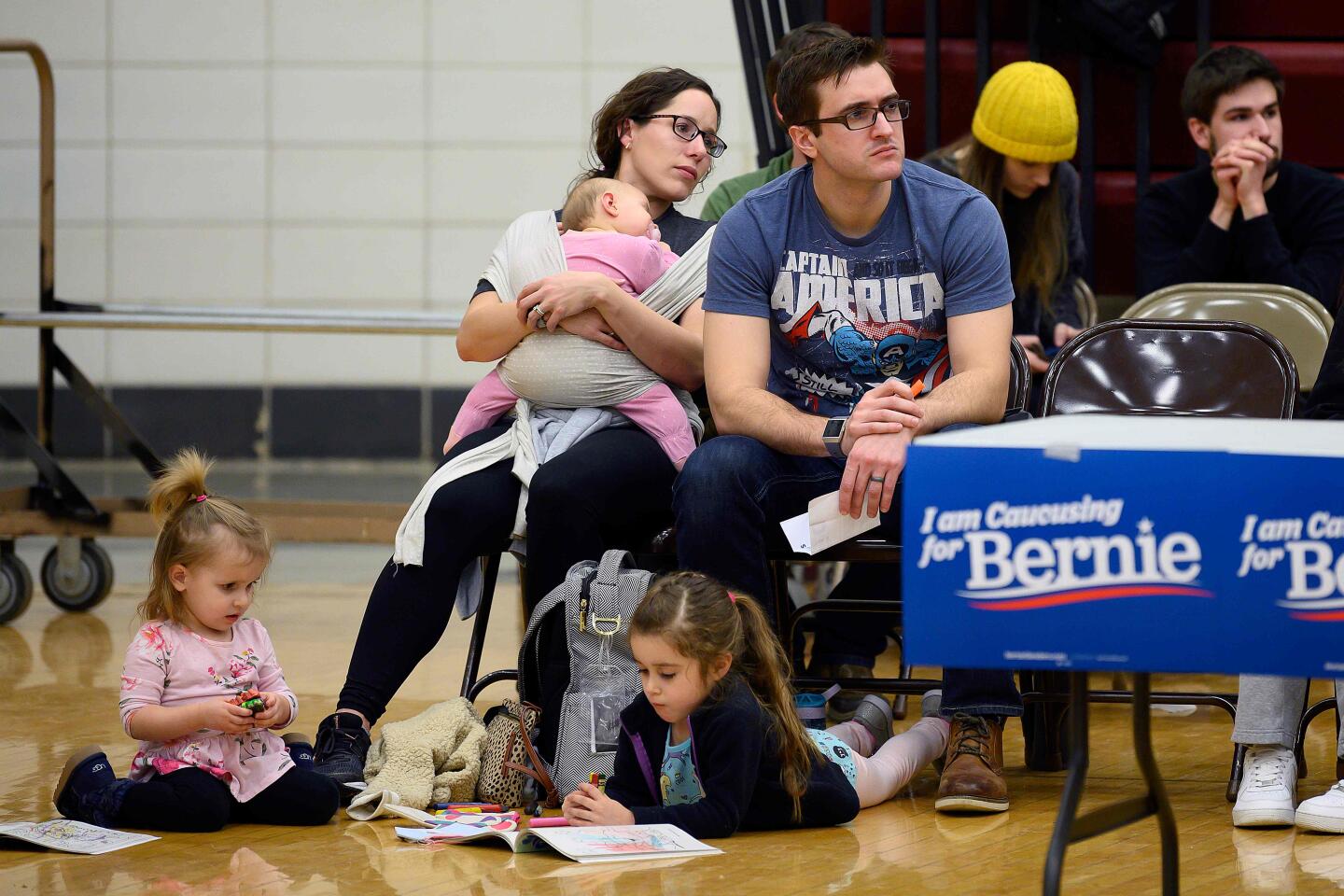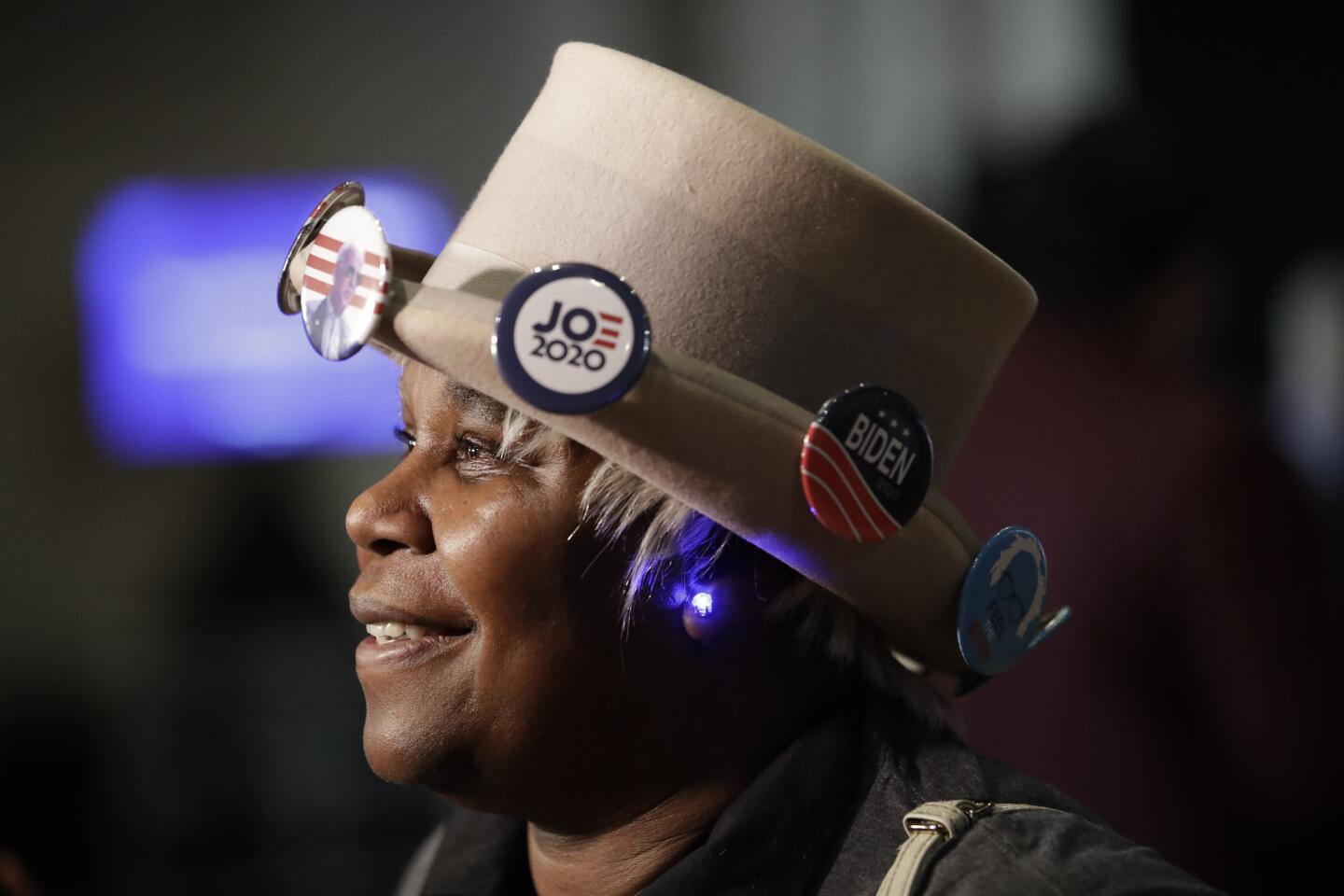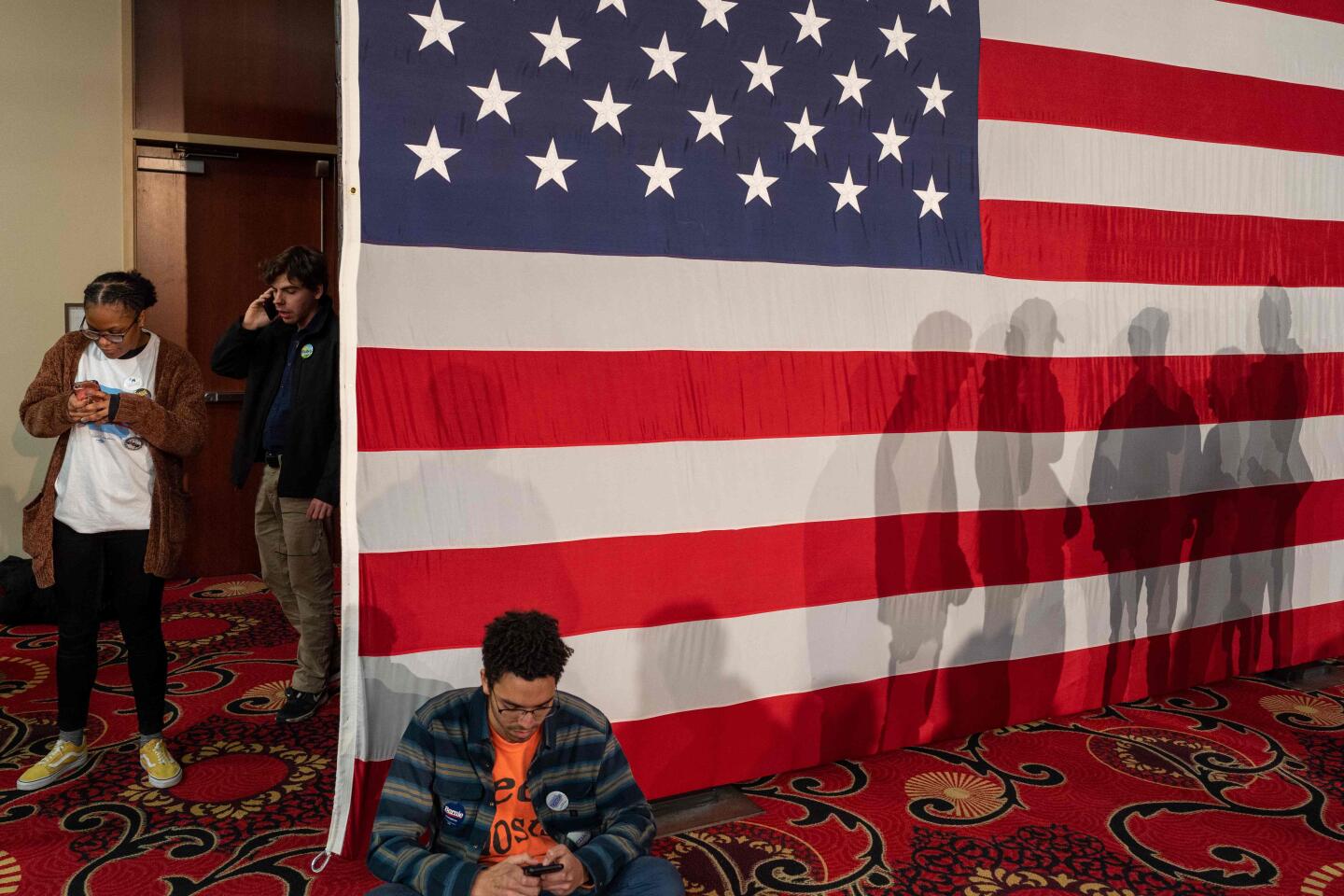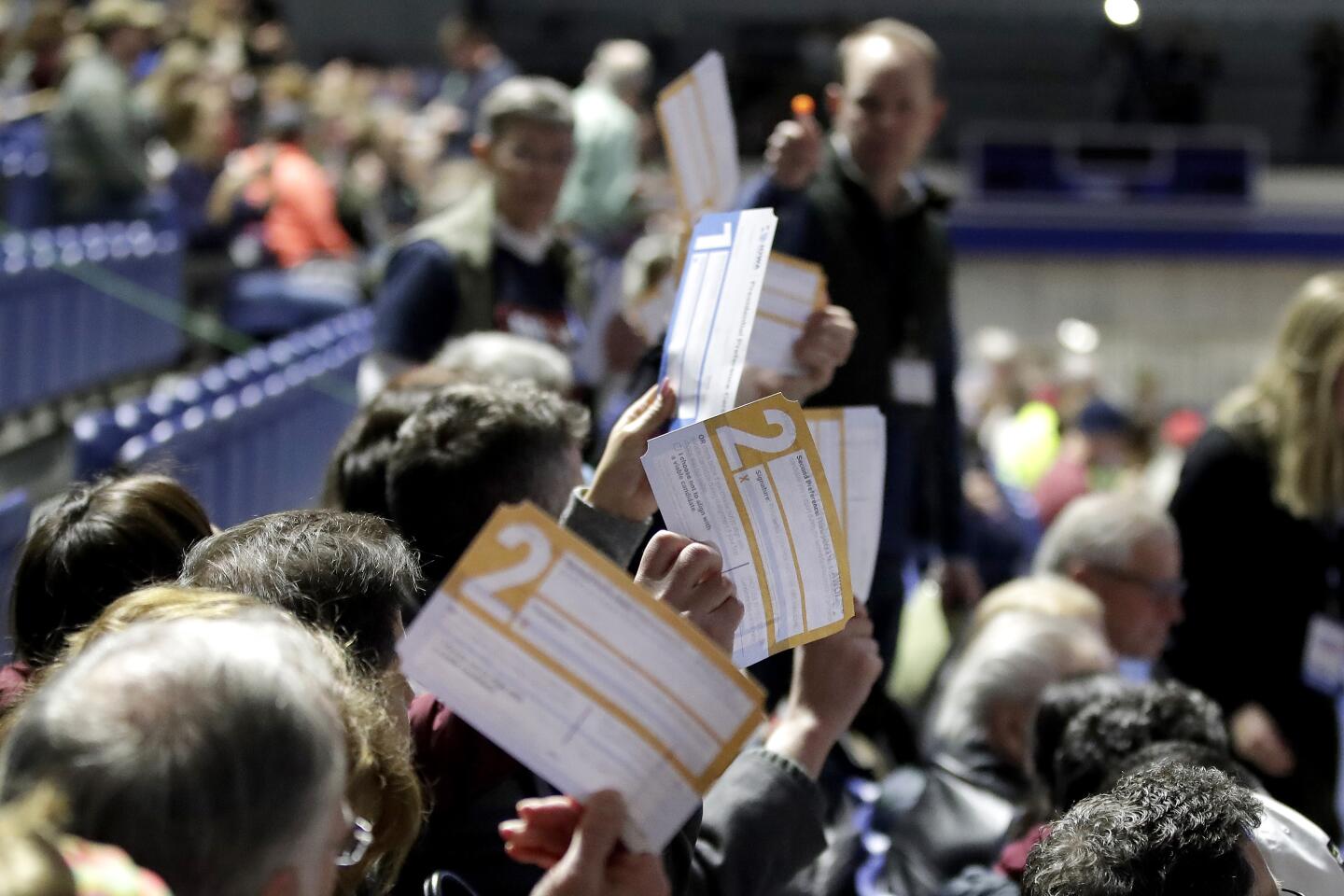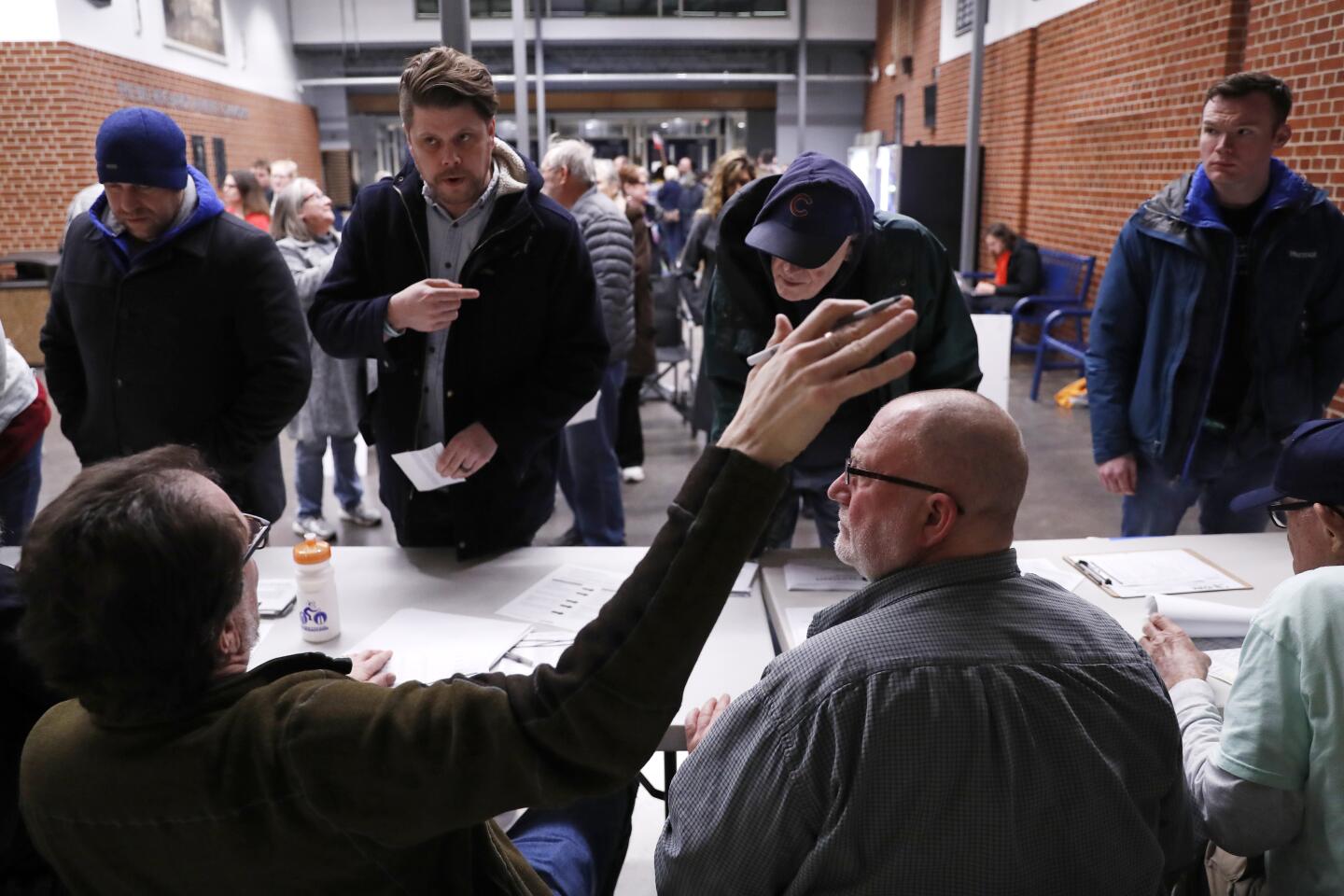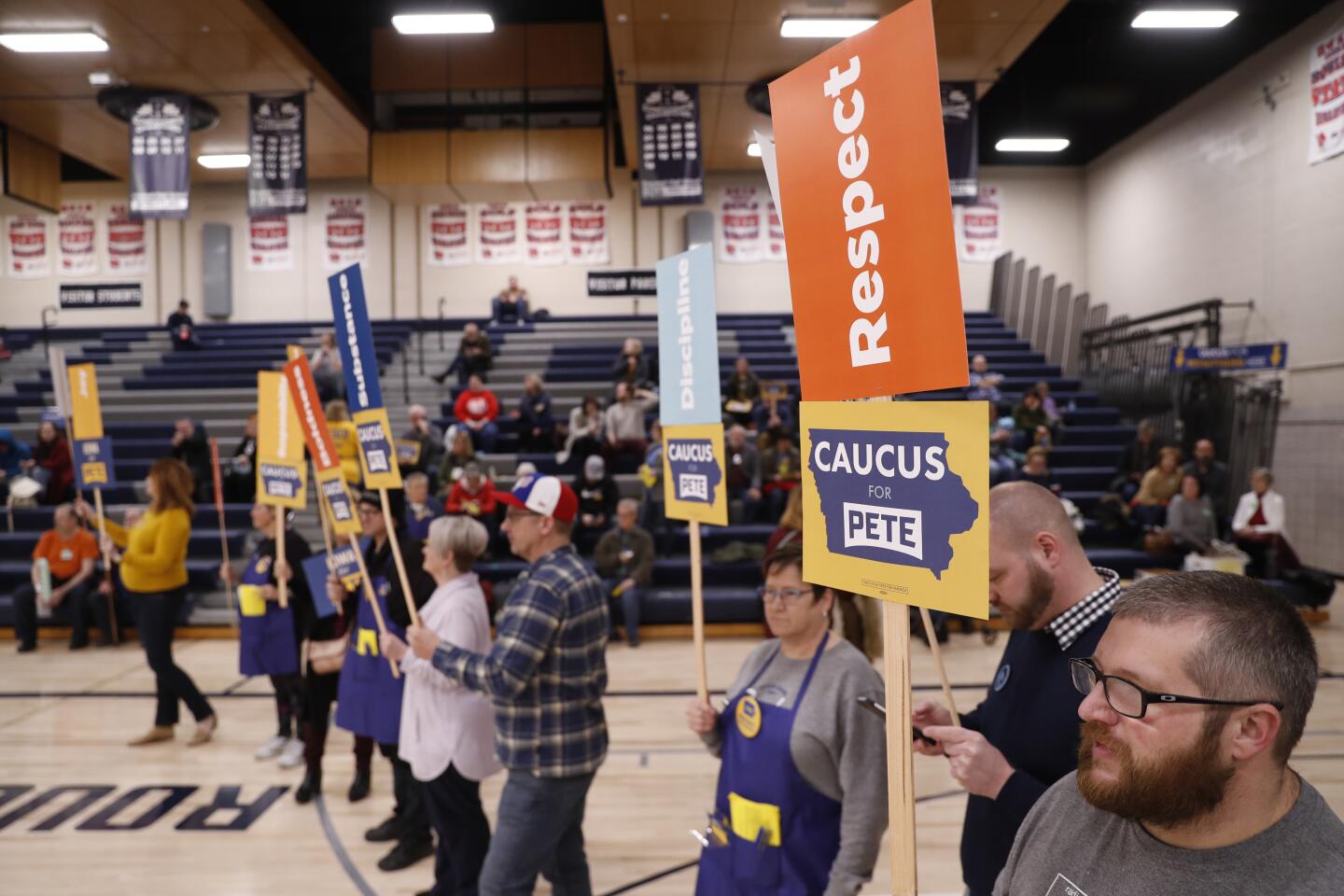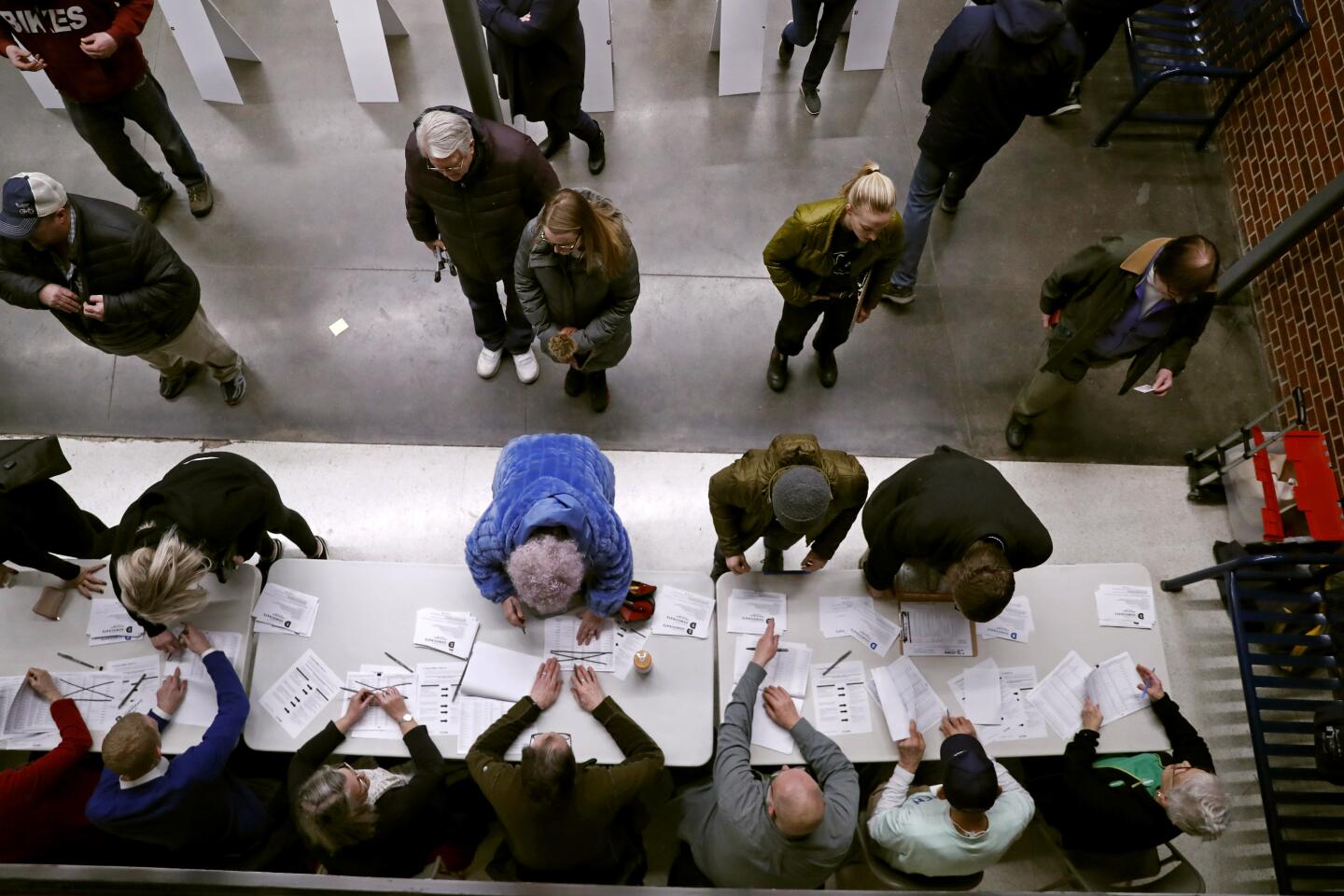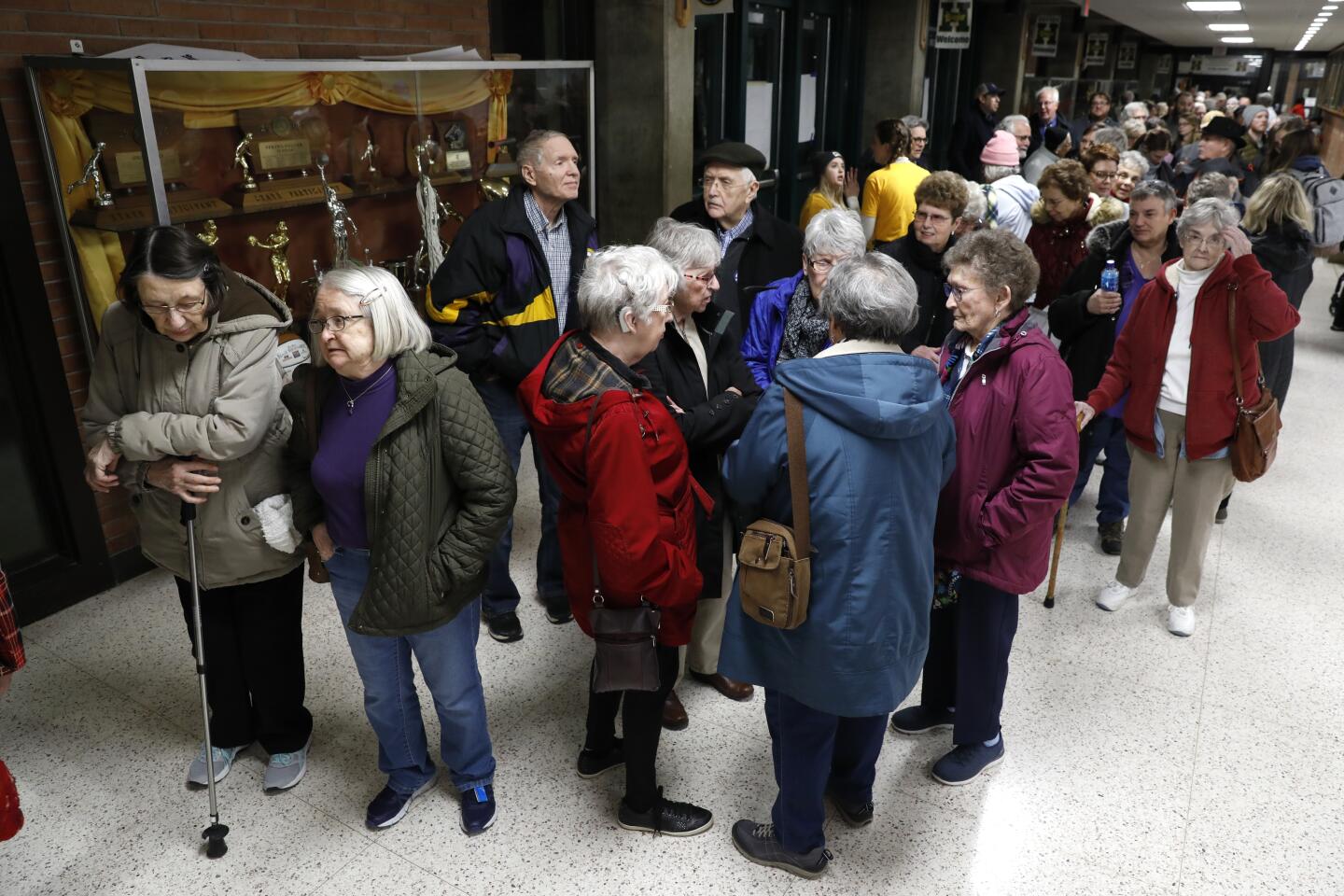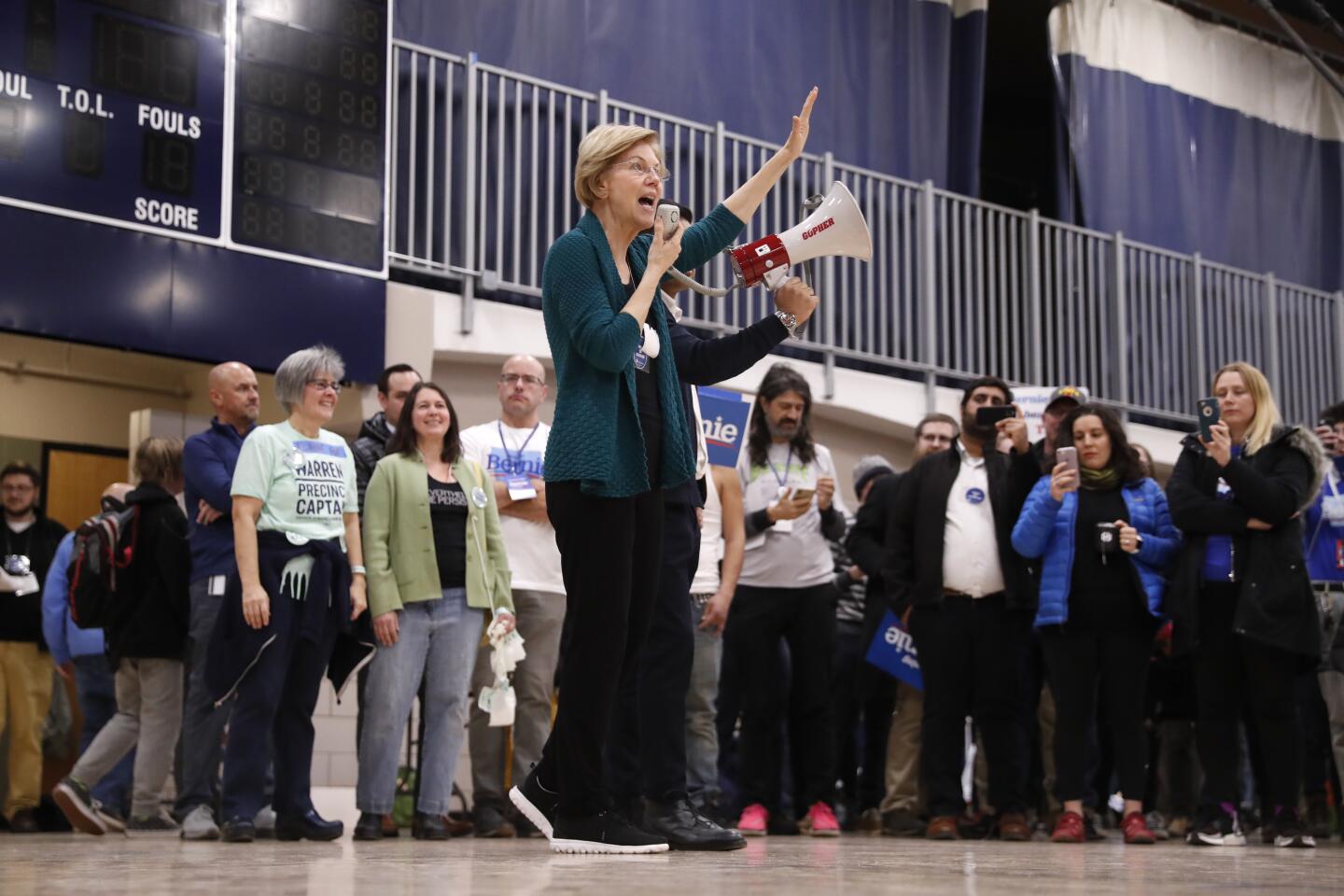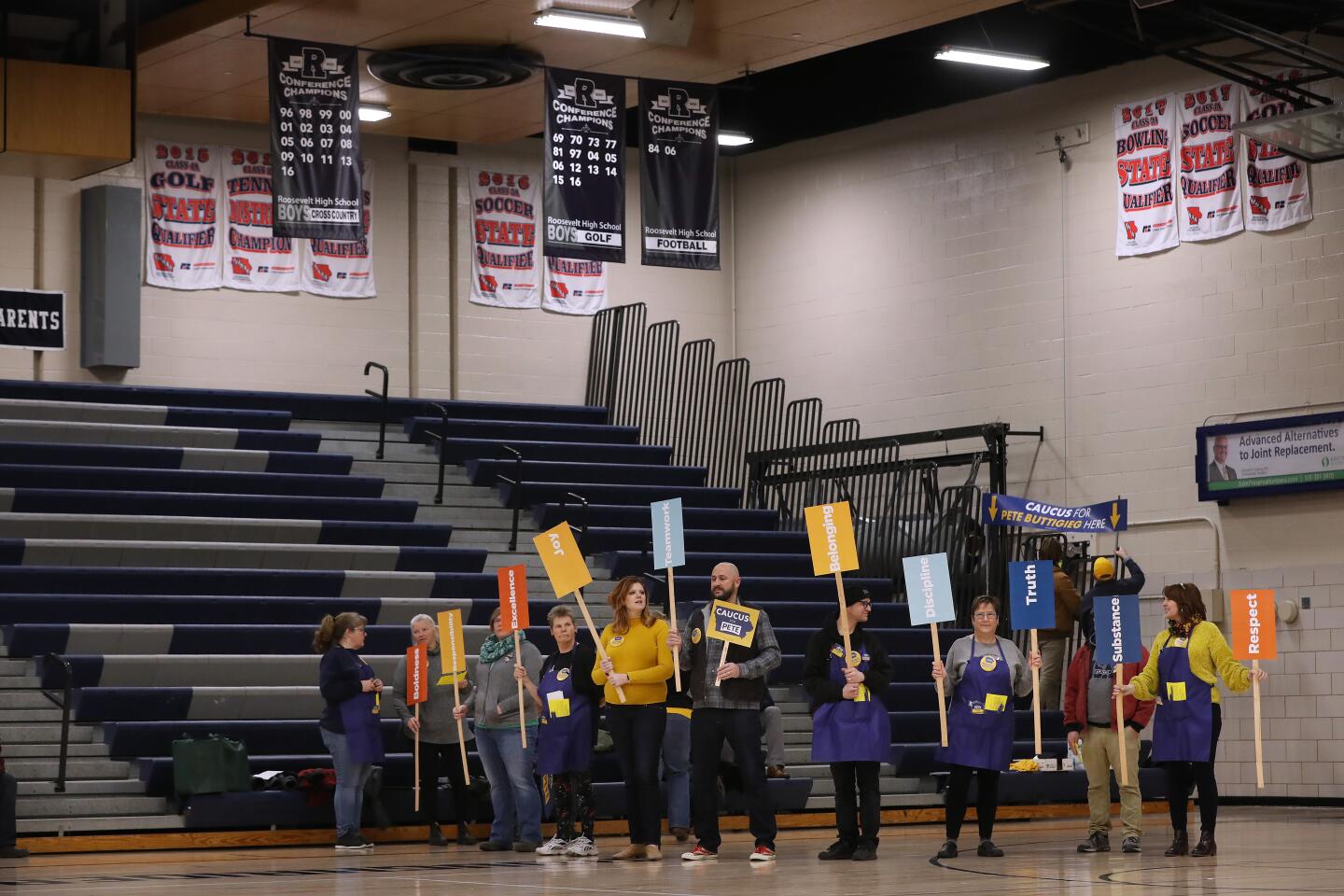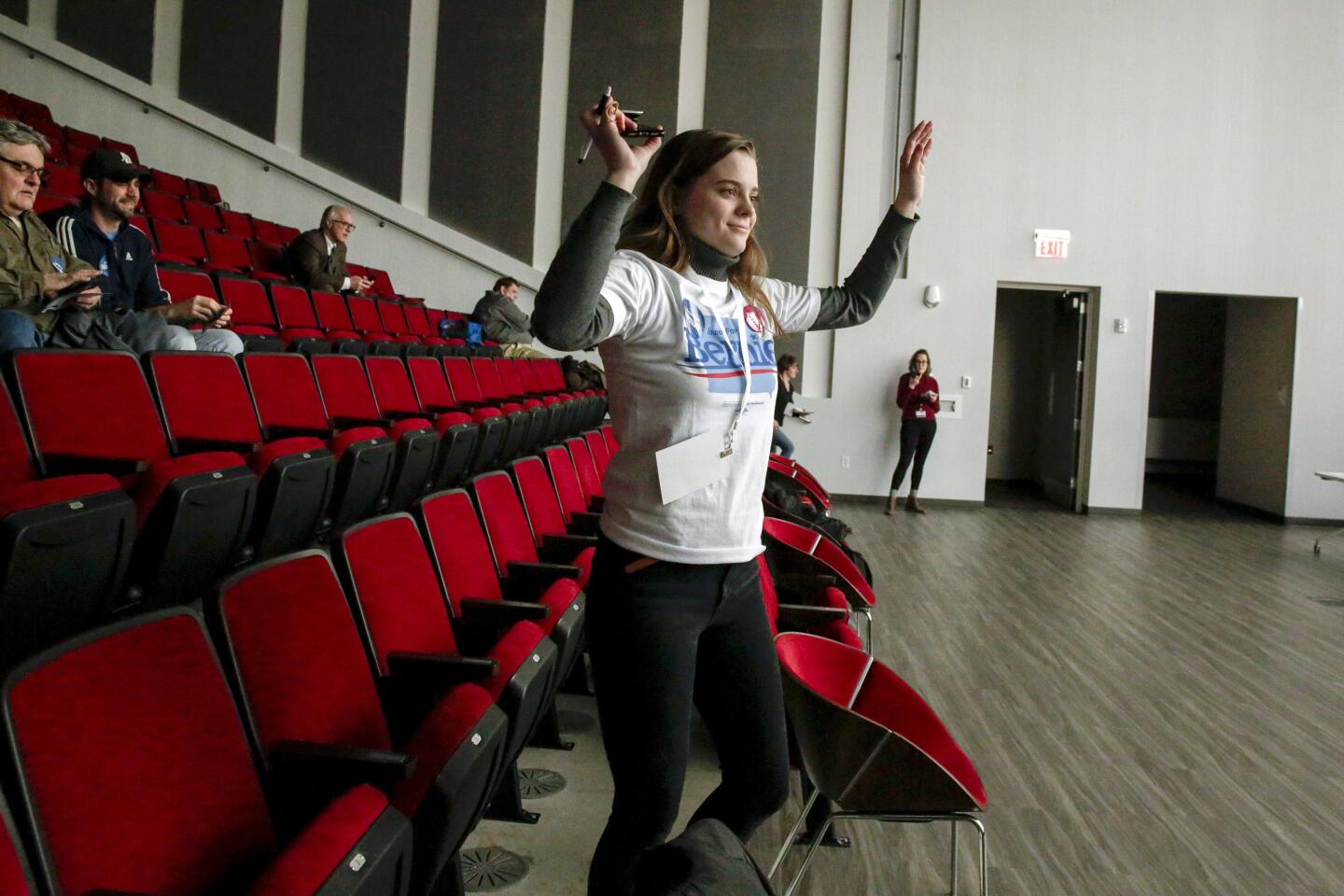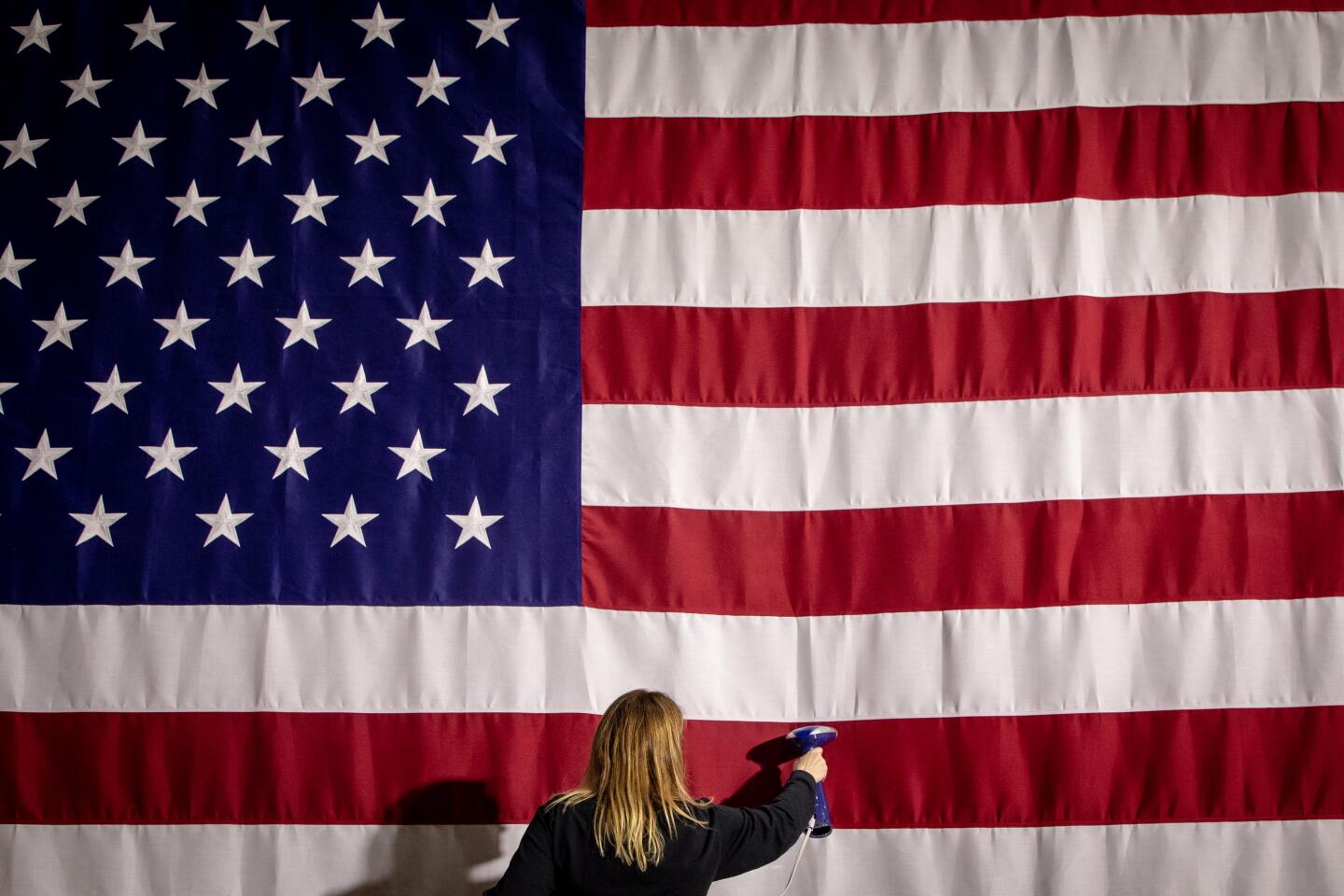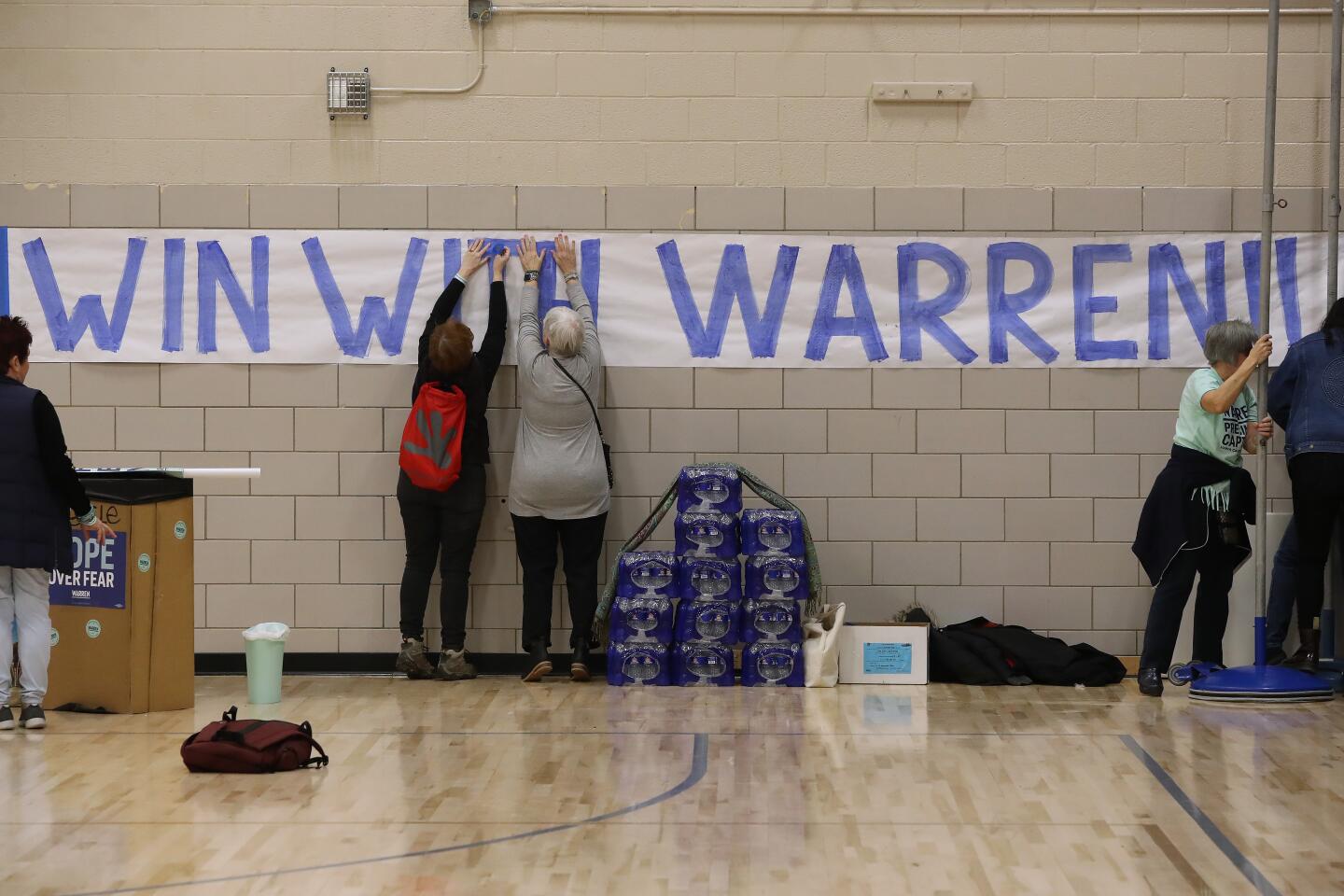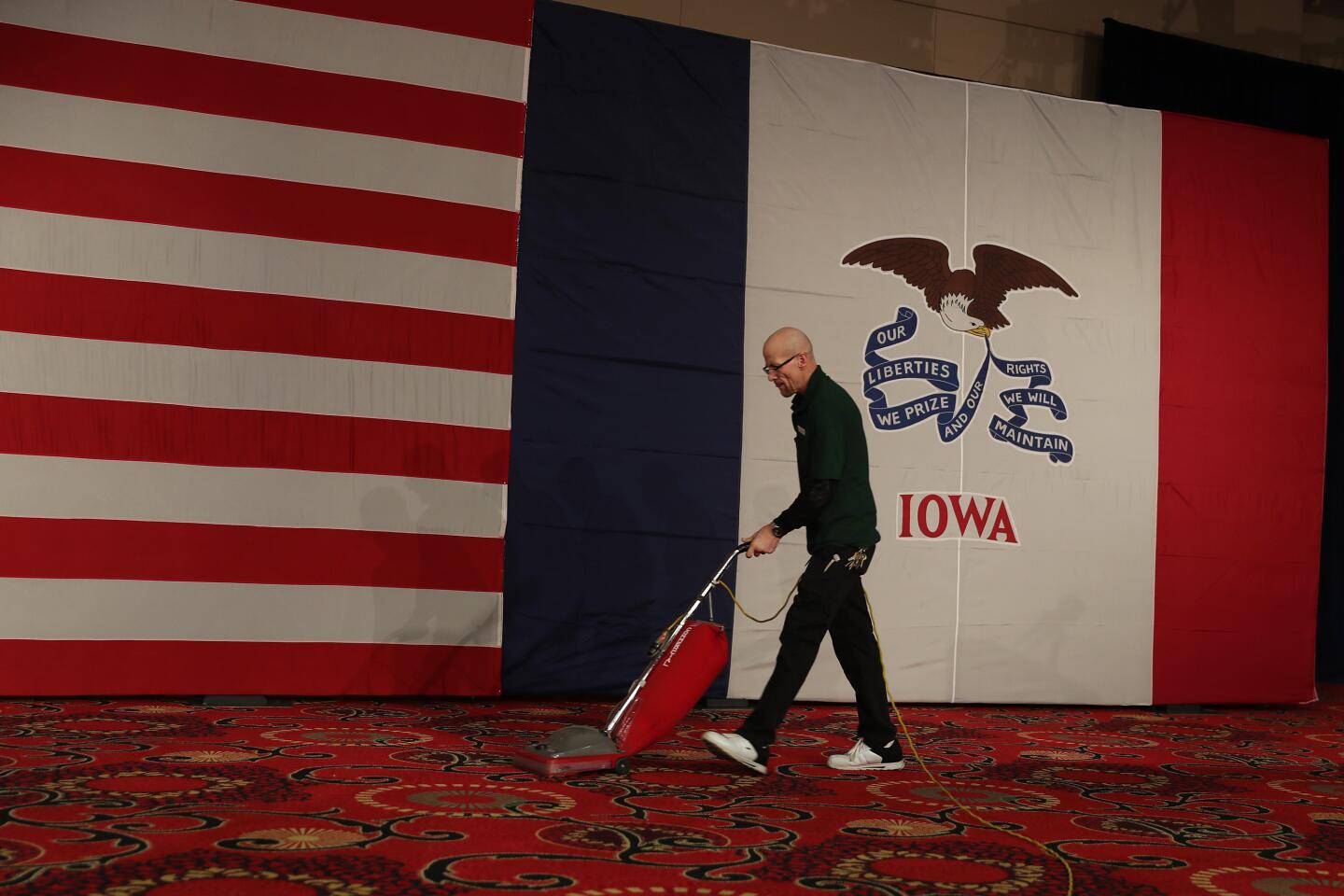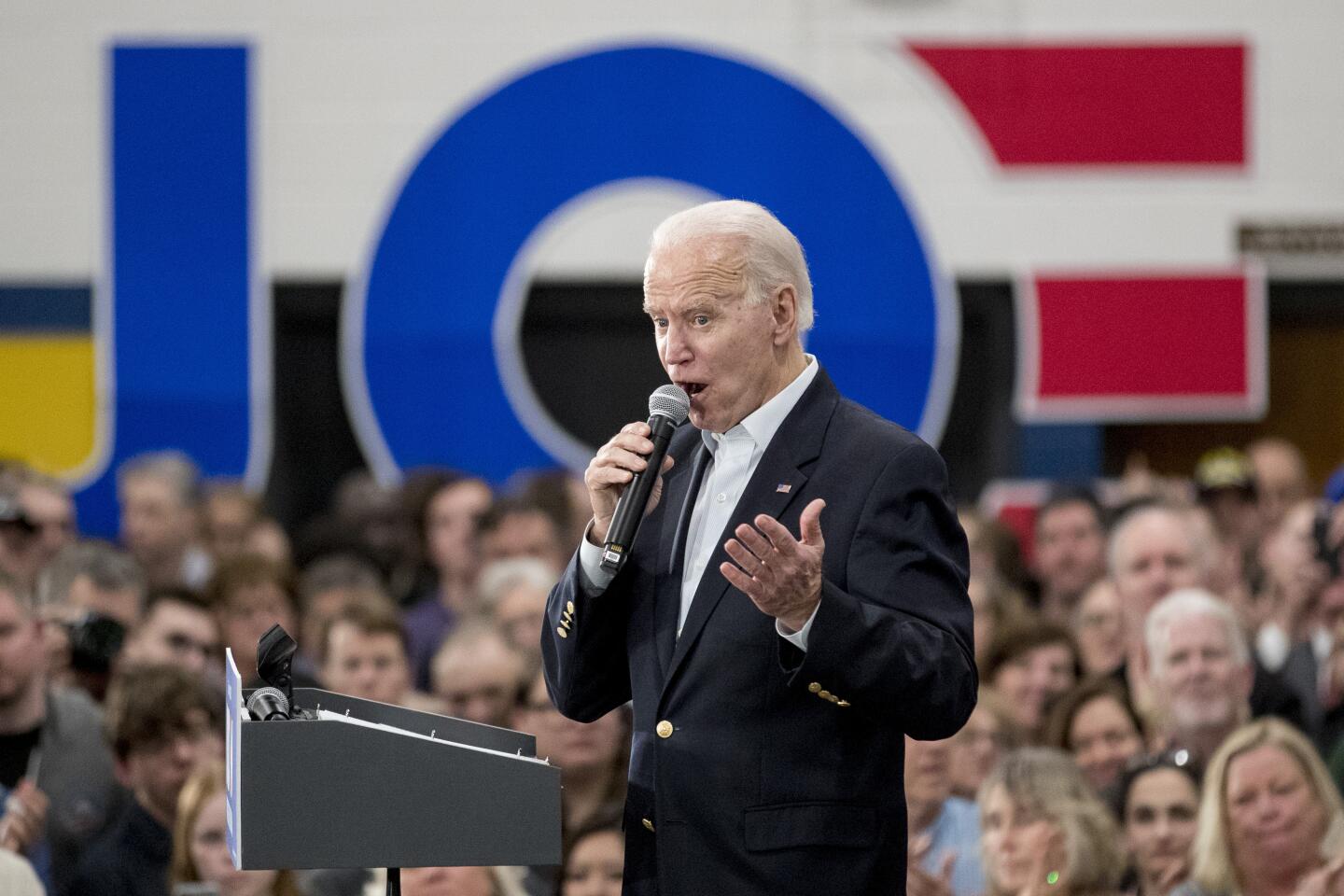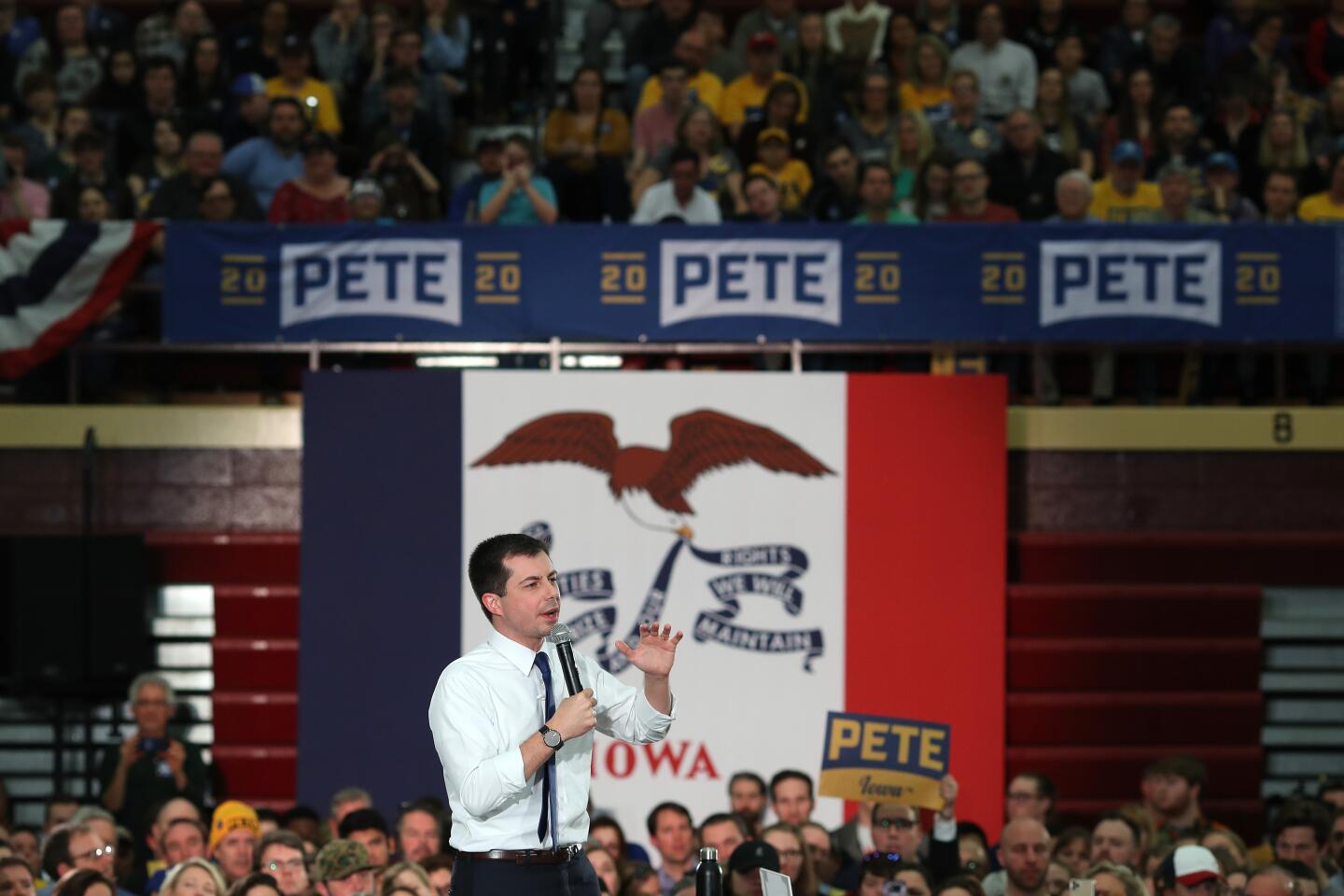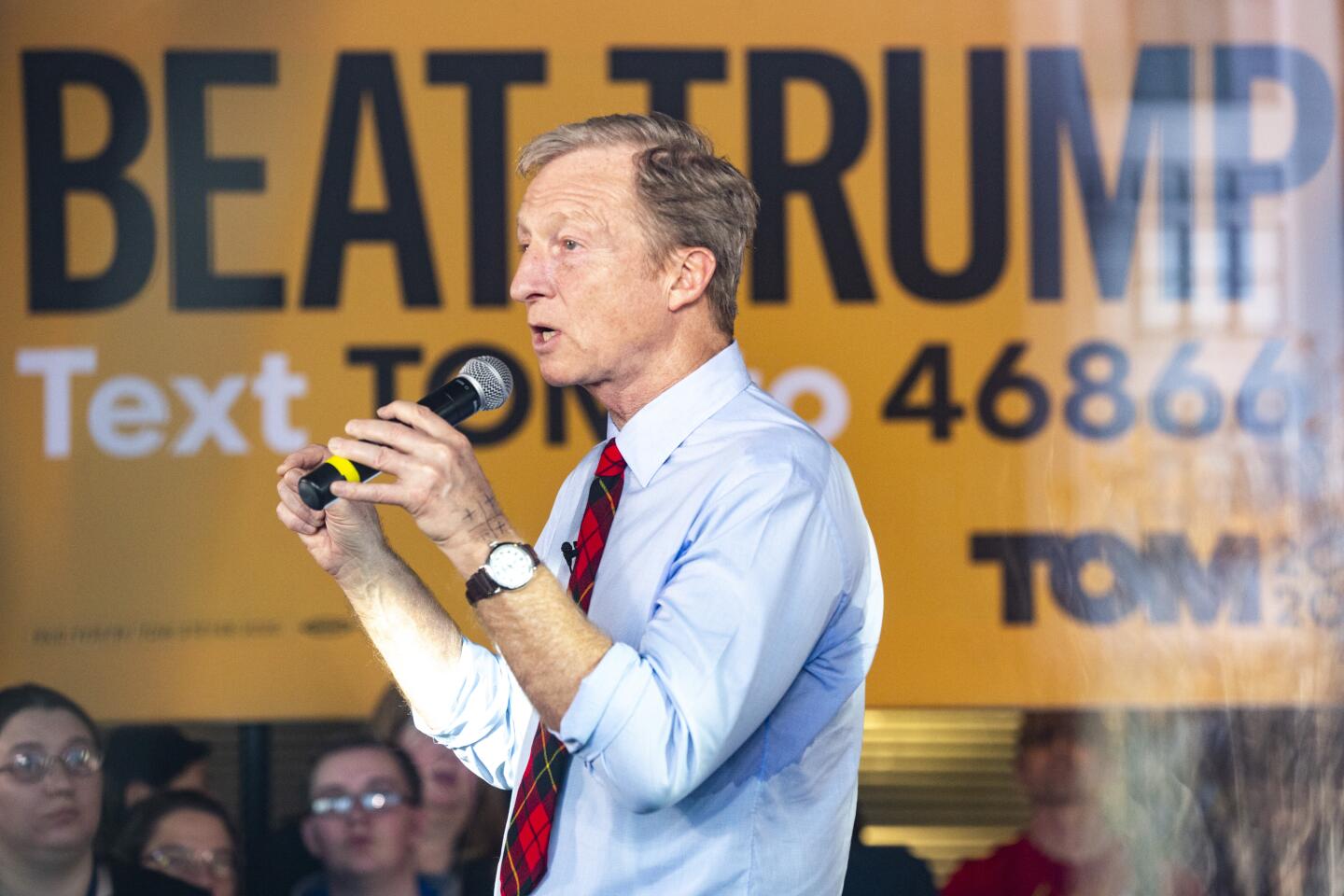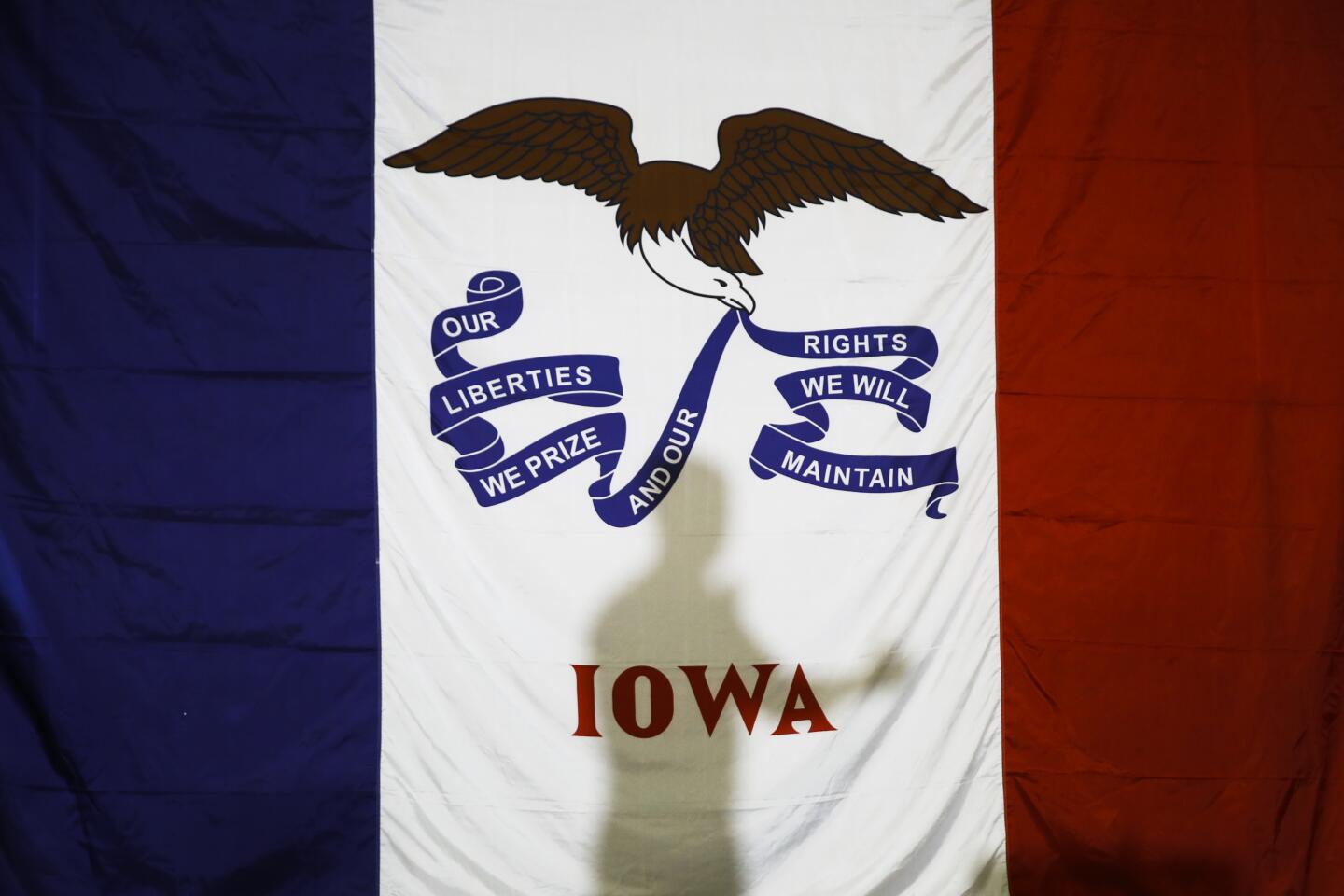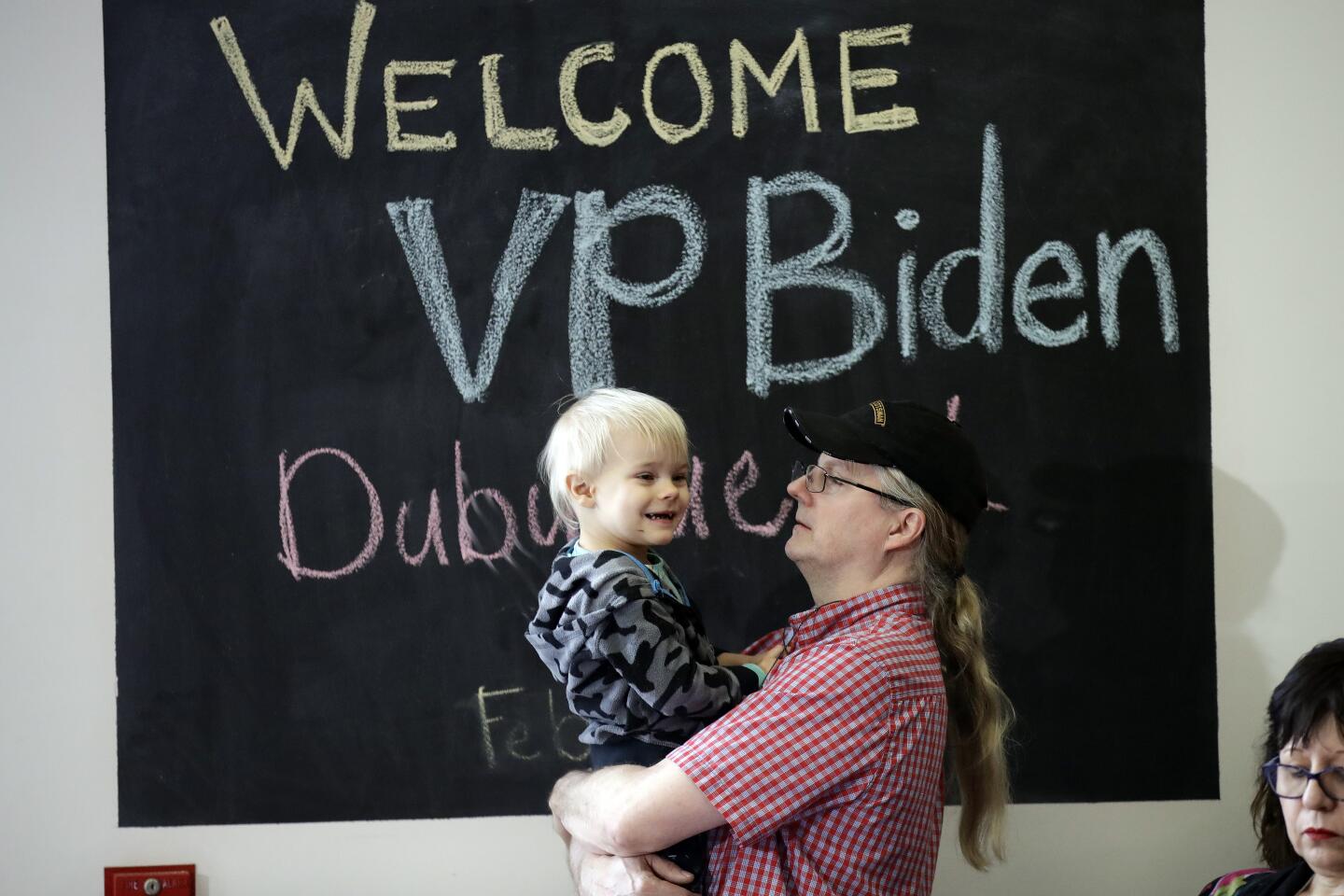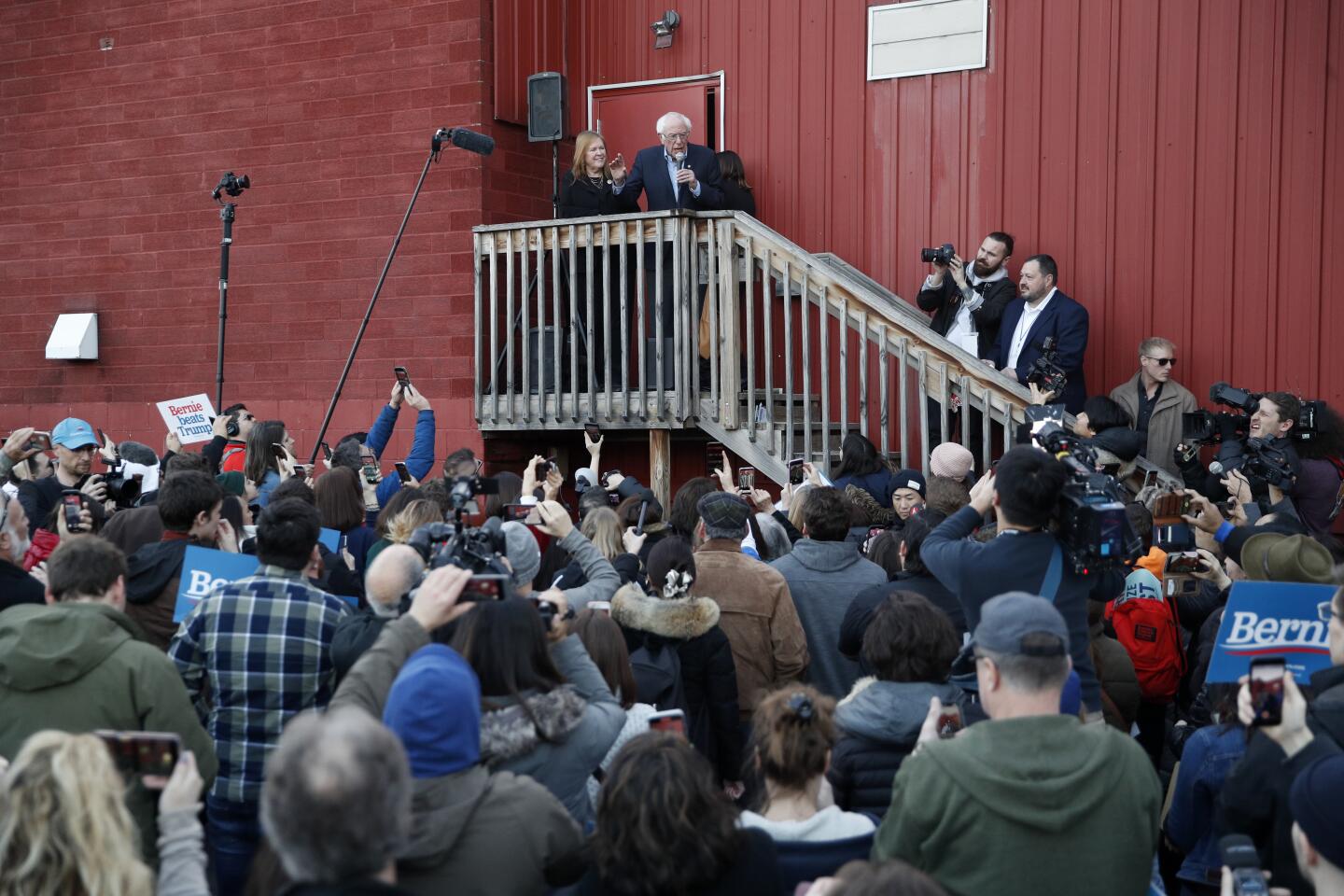With the eyes of the nation upon Iowa, the Democratic candidates for president and their supporters waited for the results of more than 1,600 caucuses across the Hawkeye State.
And they waited and waited.
All are still waiting for results, which are delayed by what the Iowa Democratic Party is calling “inconsistencies” in precincts reporting results in the presidential caucuses.
The party said there was no hack or intrusion into its election system and denied reports that the app used by local precincts to report results had broken down — despite widespread reports that the app indeed did not function.
“The underlying data and paper trail is sound and will simply take time to further report the results,” the party’s communications director Mandy McClure said in a written statement released late Monday night.
The Los Angeles Times has a team of reporters stationed throughout Iowa, and Melanie Mason, Tyrone Beason, Seema Mehta, Matt Pearce and Mark Z. Barabak will continue to report on the ongoing delay and when the results begin to roll in.
- Share via
Tech firm taking heat for unprecedented delay in reporting Iowa caucus results
An app created by a tech firm that received around $60,000 each from the state Democratic parties of Iowa and Nevada is taking heat for the unprecedented delay in reporting Democratic caucus results from Iowa.
The firm behind the app reportedly is Shadow, an affiliate of ACRONYM, a Democratic nonprofit founded in 2017 “to educate, inspire, register, and mobilize voters,” according to its website. Shadow started out as Groundbase, a tech developer co-founded by Gerard Niemira and Krista Davis, who worked for the tech team on Hillary Clinton’s campaign for the 2016 Democratic nomination.
Designed to modernize a system that relied on precinct chairs phoning in their results, Shadow’s caucus app was seen as “a potential target for early election interference,” according to the Des Moines Register.
Instead, results from Monday’s caucuses could not be transmitted to Iowa party headquarters and the delays increased. Results are not expected until later Tuesday.
“We found inconsistencies in the reporting of three sets of results. In addition to the tech systems being used to tabulate results, we are also using photos of results and a paper trail to validate that all results match and ensure that we have confidence and accuracy in the numbers we report,” Iowa Democratic Party communications director Mandy McClure said in a written statement released late Monday night.
“This is simply a reporting issue, the app did not go down and this is not a hack or an intrusion. The underlying data and paper trail is sound and will simply take time to further report the results.”
Shadow did not immediately reply to an email seeking comment.
Nevada’s Democratic caucuses are set for Feb. 22.
- Share via
Delayed Iowa vote count questioned by candidates and mocked by critics
The lack of any election results on the night of the Iowa caucuses left a vacuum for presidential campaigns to exploit, and they lost no time in doing exactly that.
The Iowa vote was roundly castigated as conspiracy theories ran amok on Twitter.
Late into the evening, candidates took the stage in various Des Moines hotels to give what sounded like victory speeches despite a tech fiasco that hindered vote tabulation and prevented a victor from being named Monday night.
Vermont Sen. Bernie Sanders released his own results, based on his campaign’s tally from 40% of precincts. It found — surprise — that Sanders won.
Meanwhile, a top Sanders supporter, former National Nurses United leader RoseAnn DeMoro, mocked Pete Buttigieg for taking a premature victory lap.
“The McKinsey guy declaring victory before votes have even been counted is just a little too on the nose,” she tweeted, alluding to Buttigieg’s work at the management consulting firm McKinsey before he was elected mayor of South Bend, Ind.
Former Vice President Joe Biden, whose opponents suggested he would’ve suffered the biggest blow had the state Democratic Party reported the results Monday night, was quick to question the count’s integrity. His campaign sent a letter to party leaders noting the “acute failures” in the vote count — even as his campaign manager said Biden‘s team was “thrilled with our performance.”
Julián Castro, who dropped out of the race last month after suggesting Democrats should stop holding their first presidential nominating contest in a predominantly white rural state like Iowa, called the outcome “a complete failure.”
“It’s a complete mess,” said Castro, now a supporter of Massachusetts Sen. Elizabeth Warren.
President Trump’s supporters were gleeful. His campaign manager, Brad Parscale, gloated on Twitter. “They can’t even run a caucus and they want to run the government,” he wrote.
Donald Trump Jr., the president’s son, was equally pleased by the Iowa debacle.
“I’m just going to beat the [Democratic National Committee] and CNN to the punch,” he tweeted, “and declare that it was obviously the Russians.”
- Share via
Here are the statements from the Iowa Democratic Party regarding the delays in reporting caucus results
The integrity of the results is paramount. We have experienced a delay in the results due to quality checks and the fact that the IDP is reporting out three data sets for the first time. What we know right now is that around 25% of precincts have reported, and early data indicates turnout is on pace for 2016.
— Email from Iowa Democratic Party Communications Director Mandy McClure at about 7:47 p.m. Pacific on Monday
We found inconsistencies in the reporting of three sets of results. In addition to the tech systems being used to tabulate results, we are also using photos of results and a paper trail to validate that all results match and ensure that we have confidence and accuracy in the numbers we report. This is simply a reporting issue, the app did not go down and this is not a hack or an intrusion. The underlying data and paper trail is sound and will simply take time to further report the results.
— Email from Iowa Democratic Party Communications Director Mandy McClure at about 8:26 p.m. Pacific on Monday
- Share via
Biden campaign asks for ‘full explanations and relevant information’ after caucus results were delayed
As the candidates and campaigns became aware of delays in reporting results from the Iowa caucuses, and the Iowa Democratic Party acknowledged “inconsistencies” in precincts reporting results, the campaign of former Vice President Joe Biden sent this letter to the state party.
In light of delays in reporting results from the Iowa caucuses, the Joe Biden campaign asked for “full explanations and relevant information regarding the methods of quality control.”
- Share via
Computer issues delay caucus results; Democratic officials say data and paper trail are sound
The Iowa Democratic Party said there were “inconsistencies” in precincts reporting results from the state’s presidential caucuses on Monday as questions mounted about how the first electoral contest of the 2020 campaign devolved into an election night fiasco.
The party said there was no hack or intrusion into its election system and denied that the app used by local precincts to report results had broken down — despite widespread reports that it did not function.
“The underlying data and paper trail is sound and will simply take time to further report the results,” party communications director Mandy McClure said in a written statement released late Monday night.
Dallas County Democratic Party Chairman Bryce Smith said the app “crashed” and left many precincts unable to report their results.
“I have people who have been on hold for 20, 30, 40 minutes” with the state party, Smith said. “I have a friend at the IDP who said, ‘Send help if you have anyone.’ ... I just sent about five people to go down to the IDP boiler room” — a term for the state party’s call center — “to help them answer phone calls and help them filling out stuff.”
Derek Eadon, a Bernie Sanders precinct captain in West Des Moines, said the app for reporting results to the state party did not work on Monday night. As a result, caucus staffers tried to report the results on a backup phone line, but were left on hold for more than half an hour.
“This is a first,” said Eadon, a former Iowa Democratic Party chairman. “This is not normal. I’m concerned.”
We found inconsistencies in the reporting of three sets of results. In addition to the tech systems being used to tabulate results, we are also using photos of results and a paper trail to validate that all results match and ensure that we have confidence and accuracy in the numbers we report. This is simply a reporting issue, the app did not go down and this is not a hack or an intrusion. The underlying data and paper trail is sound and will simply take time to further report the results.
— Iowa Democratic Party Communications Director Mandy McClure
The party, which administers the caucuses, said earlier in the evening it was aware of delays in reporting the results, which it attributed to “quality checks.”
“The integrity of the results is paramount. We have experienced a delay in the results due to quality checks and the fact that the IDP is reporting out three data sets for the first time,” McClure said in the initial statement. “What we know right now is that around 25% of precincts have reported, and early data indicates turnout is on pace for 2016.”
Former Lt. Gov. Patty Judge, an official at a Monroe County precinct in rural southwestern Iowa, said she had been struggling to get the reporting app to work for several days.
“I was trying to do the test and I couldn’t get logged on,” she said. “I couldn’t make it work, so I was putting it down to operator error because I’m not the best at those things. ... I couldn’t figure out what I was doing wrong.”
On Monday morning, Judge heard that others were struggling with the app and received an email from the state party with a call-in number. When her caucus of 10 people gathered, Judge tried to report the results.
“It didn’t want me to log in,” she said of the app. “I could put the precinct number in there, but then it wouldn’t let me do the next step. So I abandoned it. I decided I wasn’t going to frustrate myself.”
Judge said she called in her results and only had to wait on hold for three to four minutes before reporting them.
This year, the state party limited the caucuses to two rounds of voting before locking down the results. If a voter’s preferred candidate was deemed viable in the first round, the voter could leave and that vote would still count. These changes were intended to cut down the time the caucuses take.
William Baresel, chaiman of the Floyd County Democrats, had three precincts that were unable to report results to the Iowa Democratic Party, and he spent an hour on hold with the state party before he finally got through to relay his results.
Baresel’s caucus chairs “couldn’t get the app to work,” and so he volunteered to stay up late into the night to phone in the results to the state party.
“Once we got through, everything was fine,” Baresel said.
One caucus chair in Floyd County had few problems reporting the results by phone earlier in the night — she bypassed the app entirely.
“I never used the app because the internet at the site we use is iffy,” said Susan Nelson, who spent about 15 minutes on hold with the state party shortly after her caucus ended at 8 p.m. “No difference from other years.”
- Share via
Voter voices: A mother-daughter duo volunteer for Biden
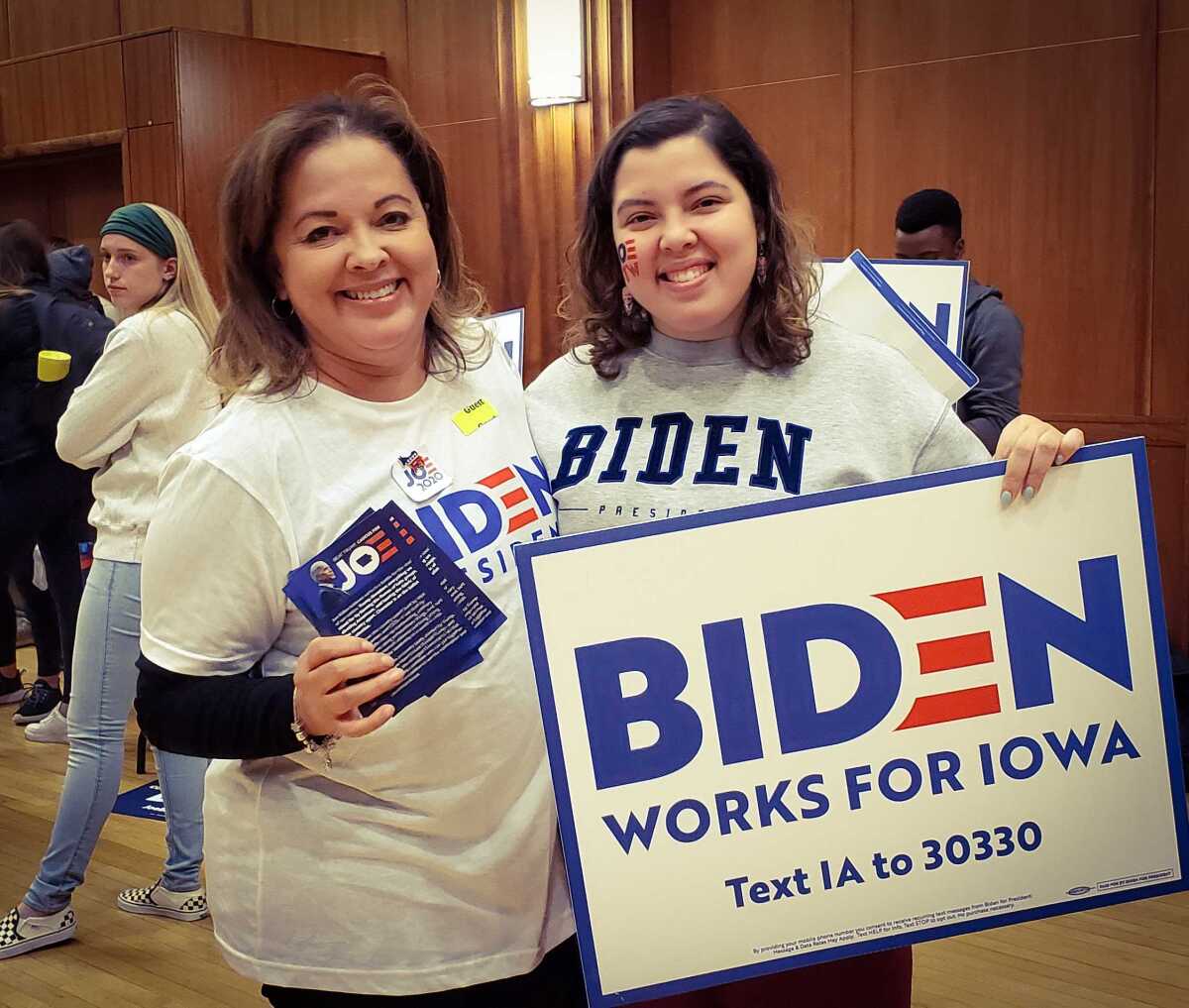
Monica Bousbar of Tampa had a simple explanation for why she traveled all the way from Florida to volunteer for the Joe Biden campaign with her daughter Sabrina, who’s been a field organizer in Iowa since June.
“He’s going to bring everyone together,” said the 47-year-old information technology supervisor.
She noted Biden’s long career in government.
“He really has the experience to get us back in the right direction,” she said.
For mother and daughter, electability is also a major factor.
“The main thing is beating Donald Trump,” said Sabrina Bousbar, 22.
“I know I can trust him with foreign relations. We need someone who’s going to clean up everything Trump has left us,” she added.
- Share via
Voter voices: These Nebraskans drove hundreds of miles just to see Biden
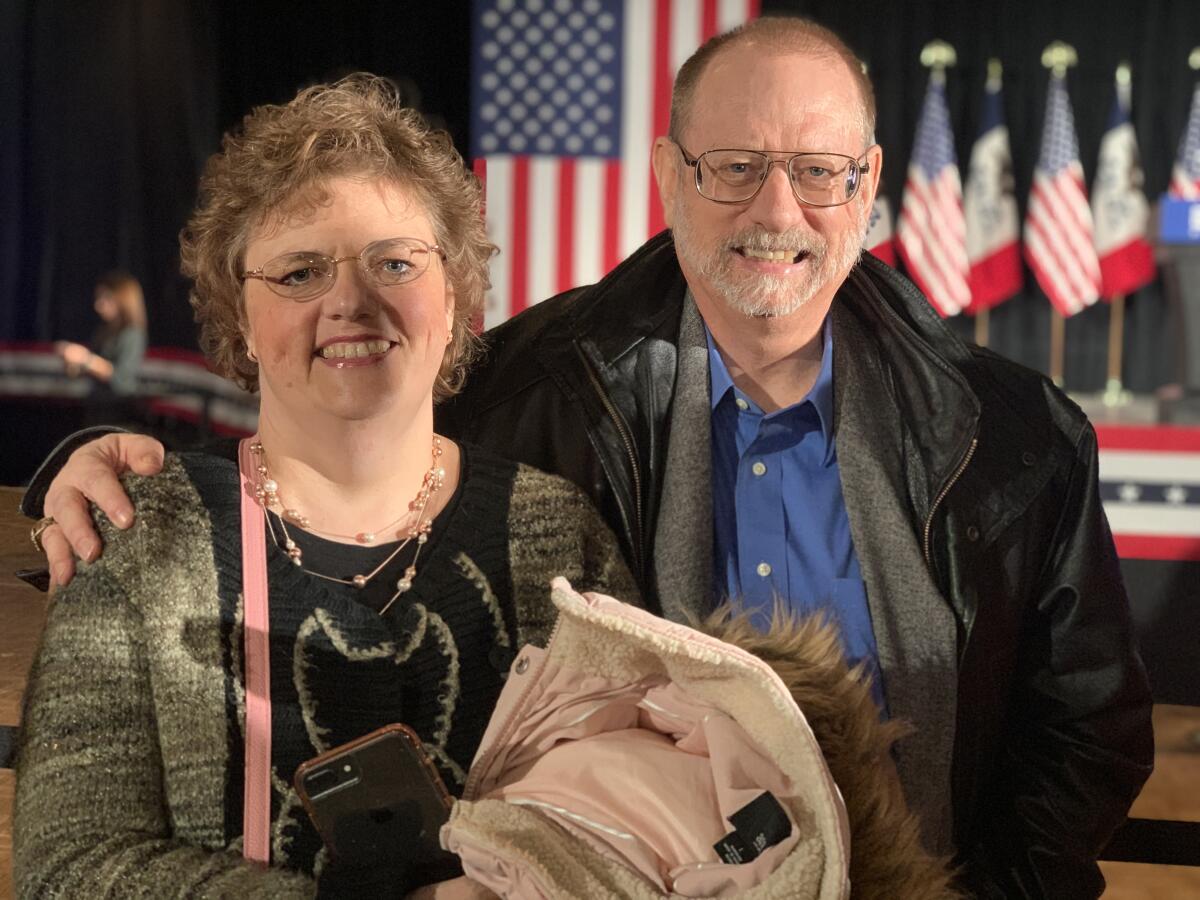
Bud Pettigrew and his wife, Angie, road-tripped seven hours from Valentine, Neb., to show their support for Joe Biden. Their dedication — and lack of caucus responsibilities — landed them at the former vice president’s election night party at Drake University in Des Moines.
Pettigrew, 59, is a Nebraska Democratic Party official and helped with the caucuses in his home state four years ago (and is relieved that this year there will be a primary instead).
His advice for political junkies obsessing over Iowa results: Be patient.
“You don’t know what’s going on until the next day,” Pettigrew said. “There will probably be four people today who will claim victory.”
The biggest metric for success, he said, was candidates being able to move onto the next round.
“Iowa isn’t really representative of the Democratic Party as a whole,” Pettigrew said.
He said that the party’s base will really begin to flex its influence next month, and that “that’s when the vice president will start to shine.”
- Share via
A road trip to caucus for Sanders in Palm Springs brings strangers together

Support for Bernie Sanders brought two Iowans together far from home Monday, and took both 24-year-old Trevor McMahan and 21-year-old Jane Keranen to a remote caucus in Palm Springs.
Keranen, a student at USC, got in touch with the Iowa for Bernie group to see if anyone from the L.A. area was driving out to Palm Springs, and they connected her with McMahan. Together, they made the two-hour drive to caucus for the senator from Vermont.
McMahan, of Orange City, Iowa, wore the trademark blue shirt of the Sanders campaign. He said it had come down to Sanders and Elizabeth Warren for him, but it was Sanders’ call for broad structural changes that won his support.
“I think we need big change,” McMahan said. “It became clear that Bernie was the candidate for that.”
Keranen, of Iowa City, said she also considered Warren, and she had wanted the Massachusetts senator to be her candidate but thought her plans didn’t go far enough.
For Keranen, student loan debt and healthcare were her top issues.
“Her policy was just not big enough, in my opinion,” she said.
- Share via
Voter voices: Klobuchar’s politics sync up with former federal judge’s ‘centrist philosophy’
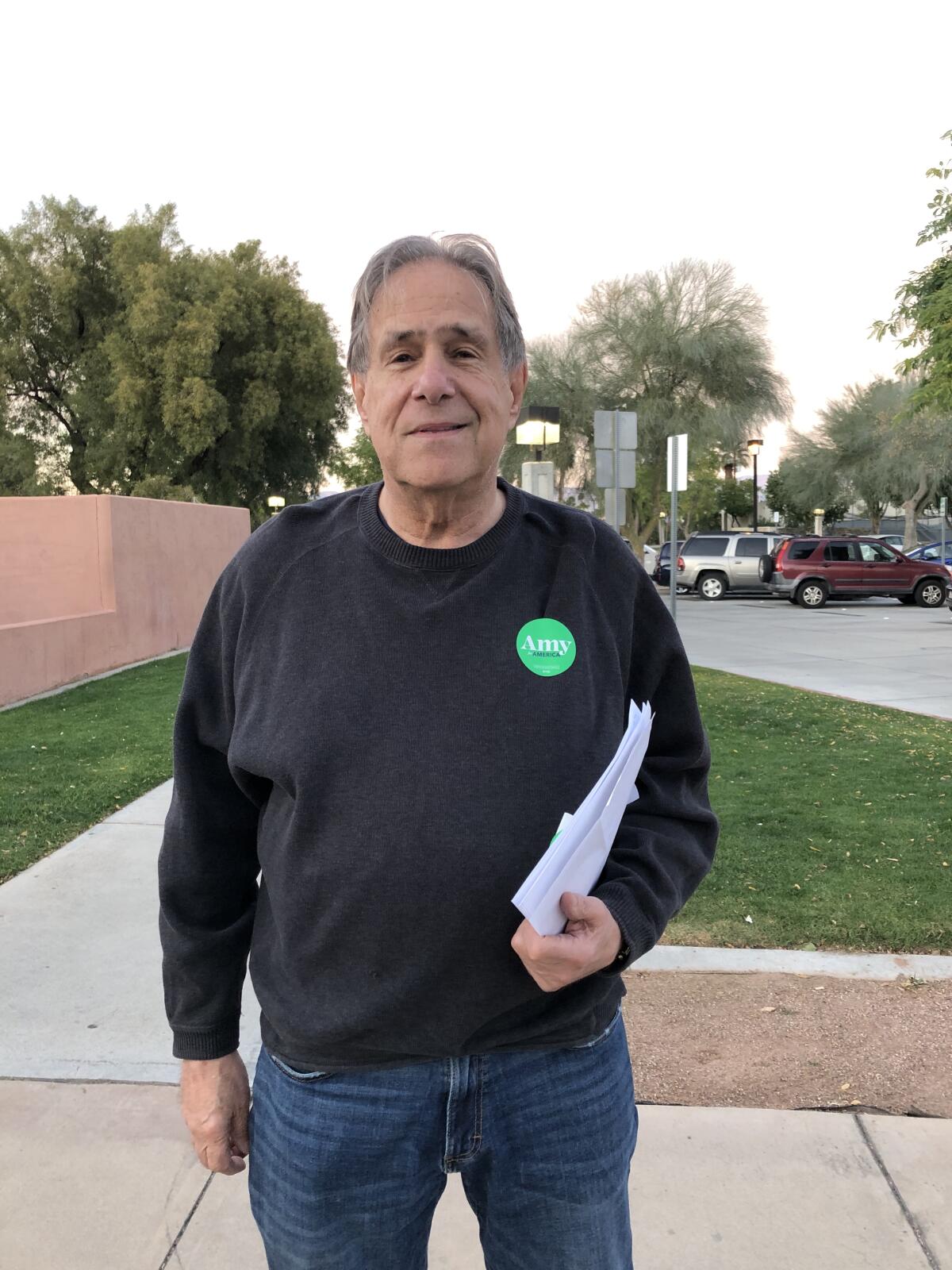
For the first time in 27 years, Mark Bennett of Des Moines will be be able to publicly support a presidential candidate of his choice. Bennett, 69, retired this year after serving as a federal district judge, which required him to keep his politics to himself.
But at the Palm Springs Public Library on Monday, Bennett proudly donned an “Amy” sticker because he planned to caucus for Sen. Amy Klobuchar. He and his wife have been coming to Palm Springs for the last five years.
“Sen. Klobuchar kind of matches my centrist philosophy,” Bennett said. “I think she’s super smart, super gritty.”
“I’m just glad we have the privilege to be able to come out,” he said.
- Share via
Senior citizens decide on their choice in just 30 minutes
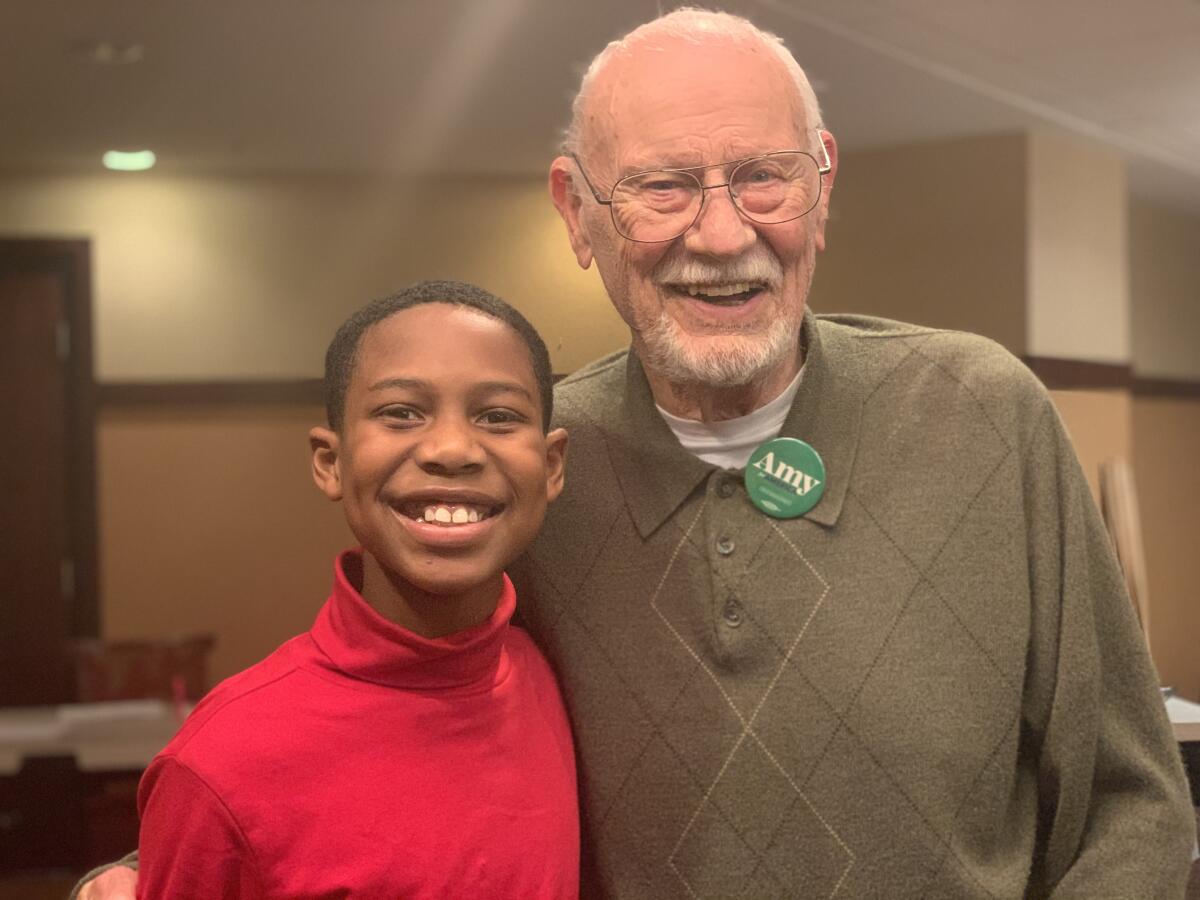
The senior citizens were ruthlessly efficient.
In just 30 minutes, about 50 caucusgoers at the Walnut Ridge Senior Living Center had settled on their preferences and wrapped for the night.
Minnesota Sen. Amy Klobuchar won three delegates, while Joe Biden took two and Pete Buttigieg took one. Gene Cutler, 93, escorted four Warren and Sanders supporters over to the Klobuchar table, linking his arm through his targets and swaying them with offers of Coney hot dogs.
“You’ve got to sweet talk them, or break their kneecaps,” said Cutler, who helped organize the caucus at the senior living facility where he lives.
He was less cheeky in talking about why he was so committed to Klobuchar. “She has the feeling of a real person,” he said. ”She wants a fair education. She wants people to learn to be welders and carpenters — everybody can’t be a PhD.”
And, in a nod to Klobuchar’s septuagenarian competitors, he added, “We need new blood.”
Kenneth Briggs, 77, was one of the Warren supporters whom Cutler put the squeeze on.
“I let him think he did,” Briggs specified.
Briggs, a minister at a United Church of Christ congregation in Truro, Iowa, was not surprised that Warren came up short.
“I knew this community was more connected to Amy — one of her representatives came here,” Briggs said. “Some folks in this age group think Warren is a little bit aggressive.”
- Share via
Watch Live: Voters discuss the Iowa caucuses
Tune in here for live coverage of the Iowa Democratic presidential caucuses tonight at 7:45 p.m. This will be your place to hear from real people about the candidates. Follow along in real time as we track voter sentiment from Iowa, Iowans voting remotely from California, and more.

- Share via
Voter voices: By process of elimination, she’s supporting Biden
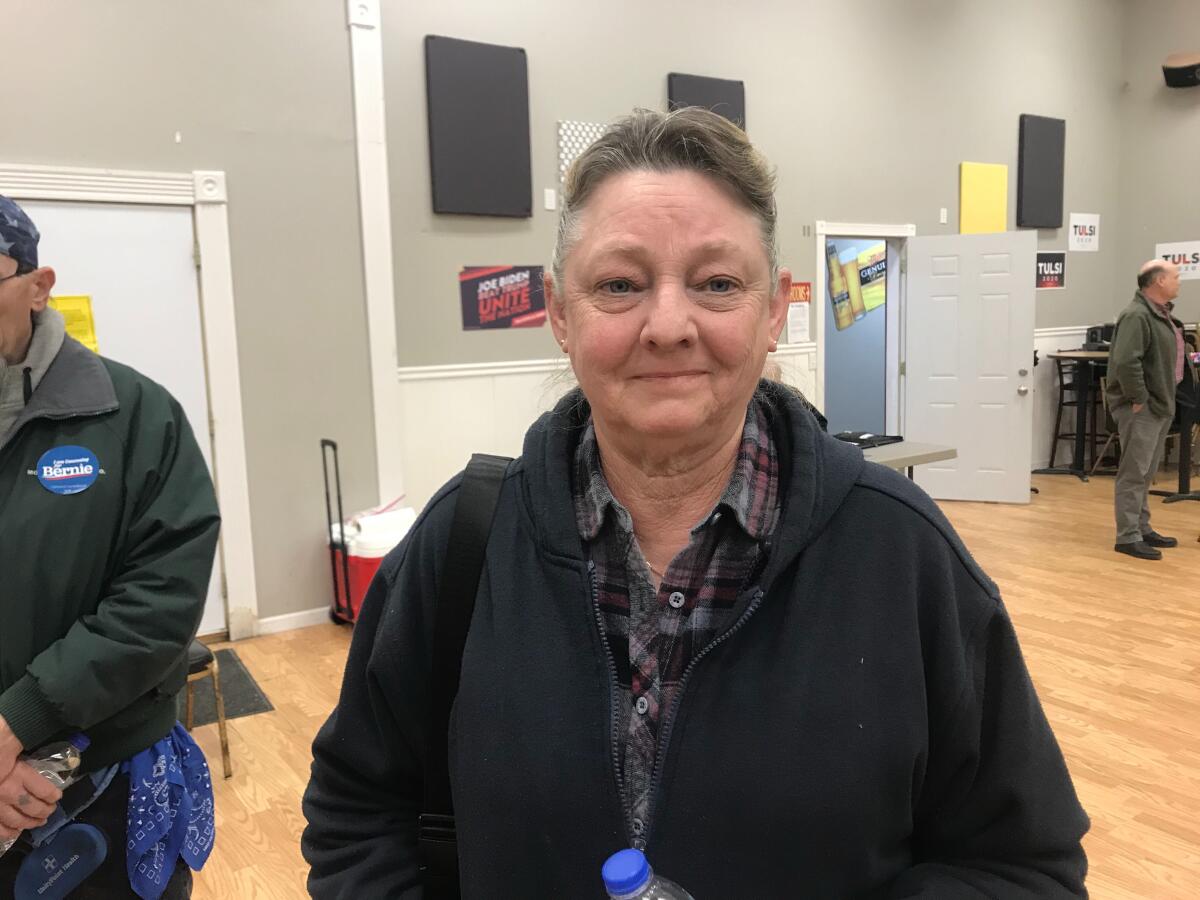
Deanna Manley, 62, is supporting Joe Biden on Monday night at her caucus at a Newton golf course. But it’s not because she loves the former vice president — she’s picking him because she believes the rest of the field is fatally flawed.
“I’m not thrilled about Biden, but there are things I don’t like about the other candidates that led me toward him,” said the retired respiratory therapist. “Bernie [Sanders] is too socialist. [Pete] Buttigieg is a nice young man who has high hopes, but he doesn’t have any experience.”
Elizabeth Warren’s policies are too liberal for Manley, and she is ambivalent about Amy Klobuchar.
She disagrees with policies such as “Medicare for all,” free public college or the Green New Deal, saying they won’t attract voters across the country.
“We have a huge, huge national debt — trillions and trillions of dollars,” she said. “That’s not going to work. That’s not America. We work for what we earn.”
- Share via
Voter voices: Caucusgoer sees a winner in ‘non-politician’ Yang
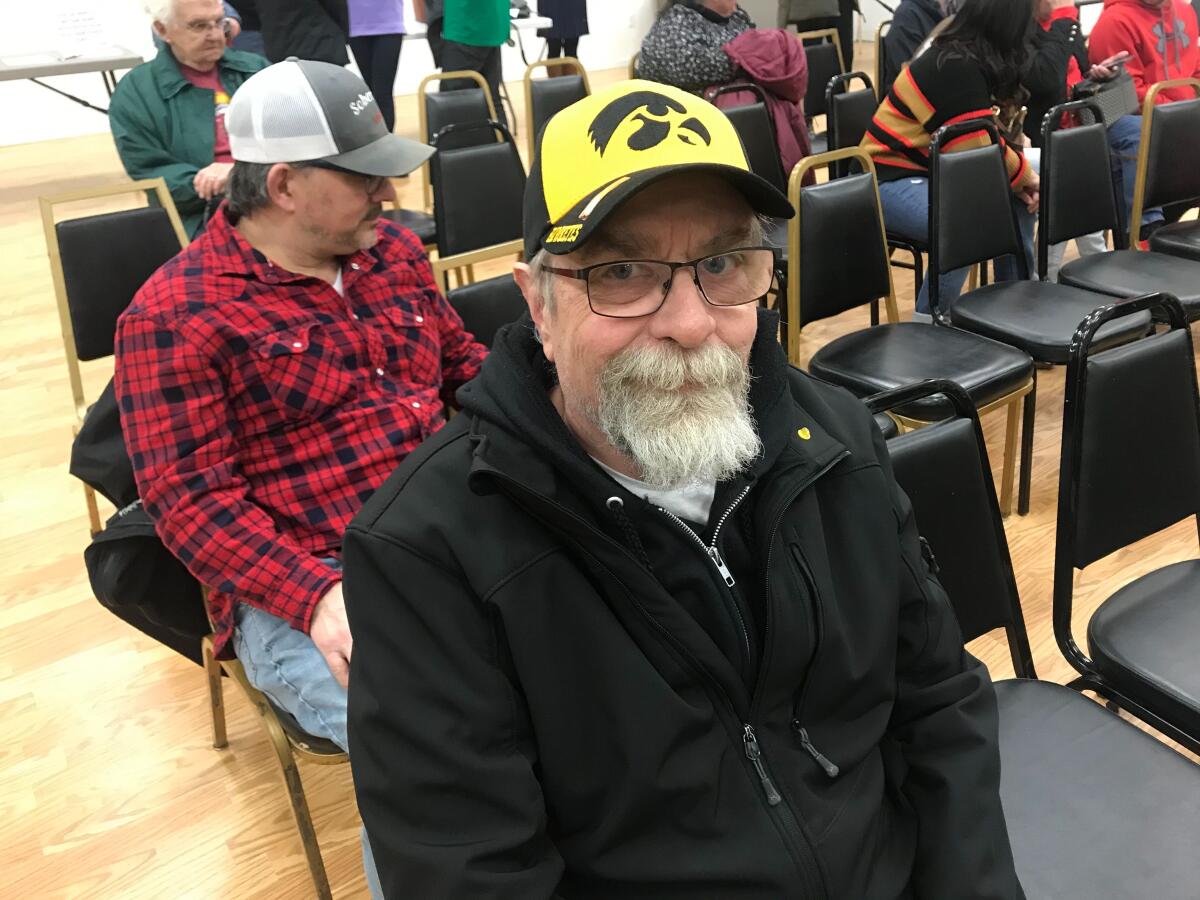
Mark Laehn thinks the only way to beat an unconventional president is to back an unconventional candidate.
So the 60-year-old Reasnor resident is caucusing for Andrew Yang, whose campaign has centered on a promise to give $1,000 each month to every American citizen.
“The only way to beat Trump is a non-politician,” said Laehn, who is a manager at Dollar General.
Laehn said that he also appreciates Yang’s optimistic approach and that the candidate hasn’t savaged President Trump in his television ads.
“He’s our president; love him or hate him, he’s still our president. I’m an American; I feel like I have to respect him, whether I like him or not. And I just think Andrew Yang is doing the right thing by not bashing him,” he said.
Laehn caucused for Bernie Sanders in 2016, but thinks the candidate’s time has passed due to his age and health.
“I just don’t think Bernie can do it; I don’t think he can beat Trump,” he said.
- Share via
Voter voices: ‘Quiet women never make history,’ so she’s voting for Warren
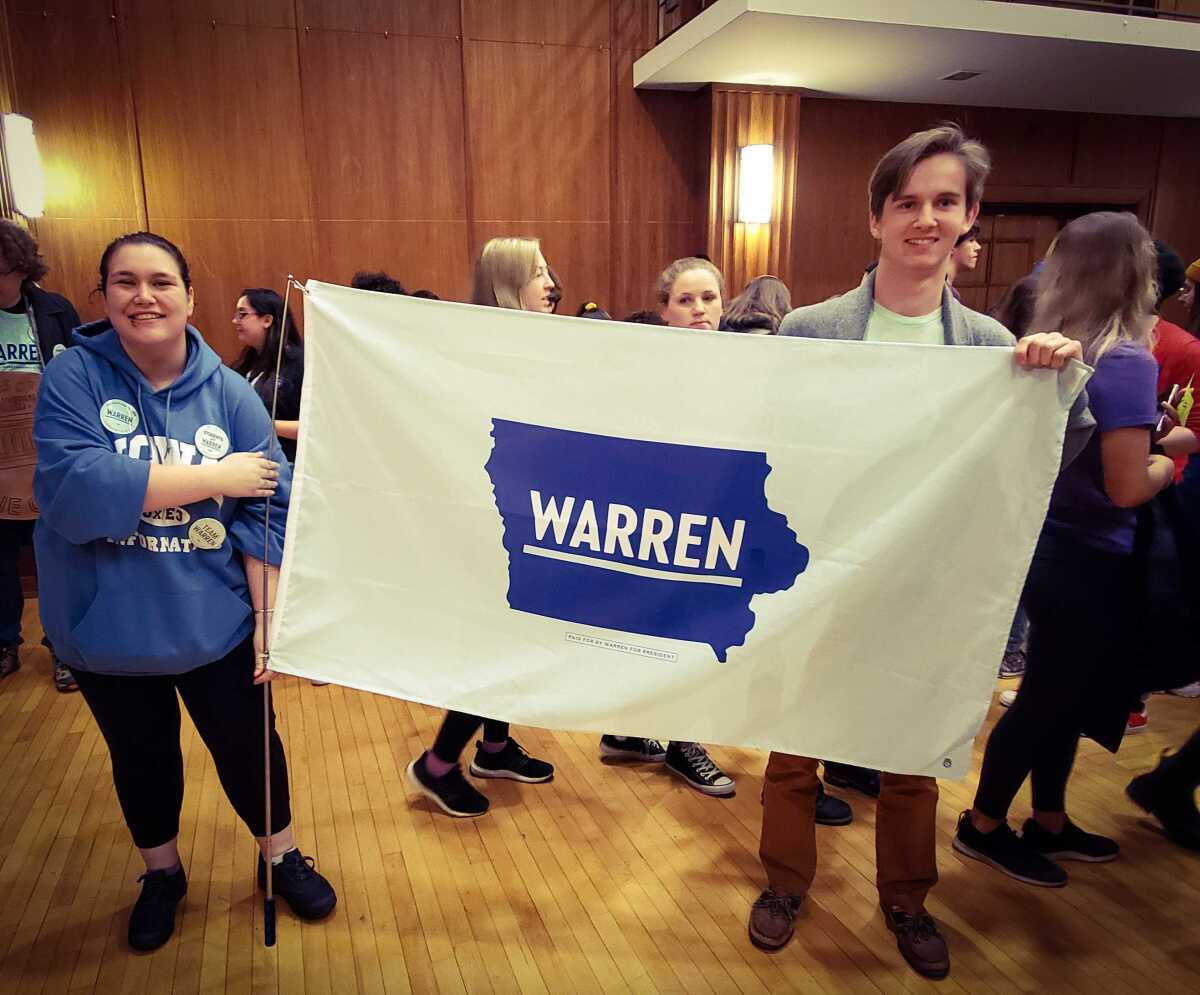
Moments before caucusing started on the University of Iowa campus, Shayla Ides, 19, carried an Elizabeth Warren flag around the student union ballroom as 759 caucusgoers — mostly fellow students — shouted over one another in competing chants for their favorite candidates.
Ides, a junior studying informatics at the college, described the Massachusetts senator as a strong woman whose life and career have inspired her.
Holding up the flag with her friend, Oskar Kaut, 18, Ides said she sees everything she aspires to be in Warren and that’s why she decided to caucus for her tonight.
“It’s really powerful to see someone I want to be like up on that stage,” said Ides, who’s from Pensacola, Fla. “What’s the quote? ‘Quiet women never make history.’ She would set an incredible example.”
- Share via
Lights go out at the University of Iowa ballroom
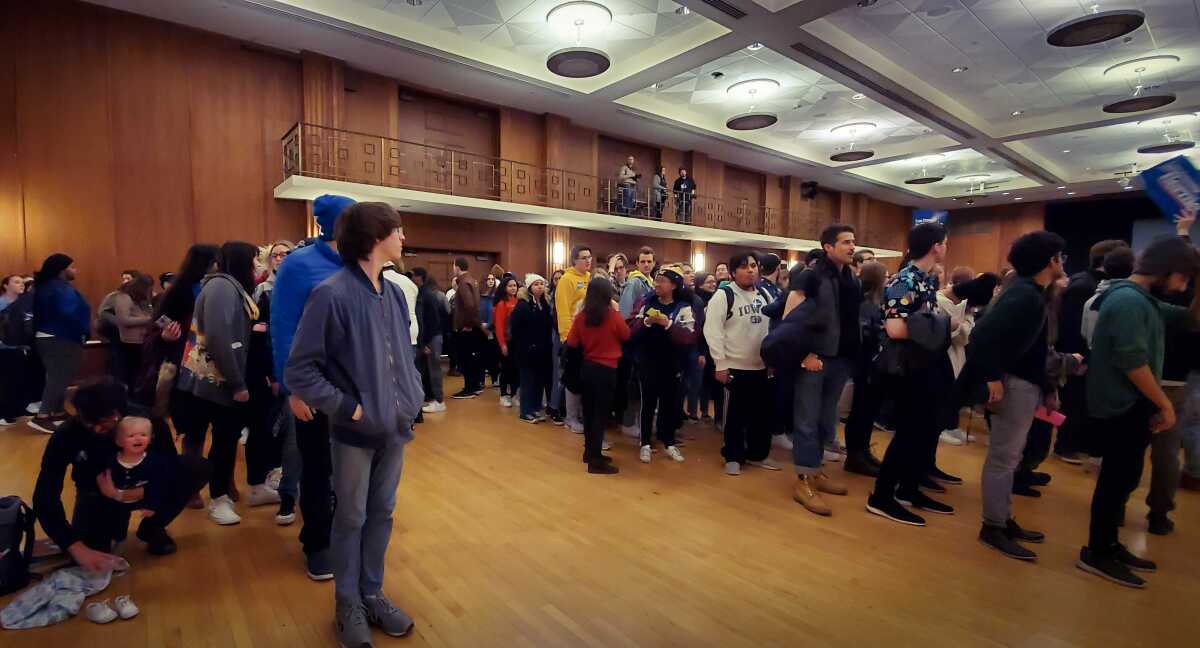
Sitting for a Democratic caucus on school grounds, voters at the University of Iowa precinct site had to line up single file, lunchroom-style, in rows representing each presidential candidate.
“Please, keep it nice, keep it neat!” a caucus organizer shouted as voters got ready to fill out candidate preference cards.
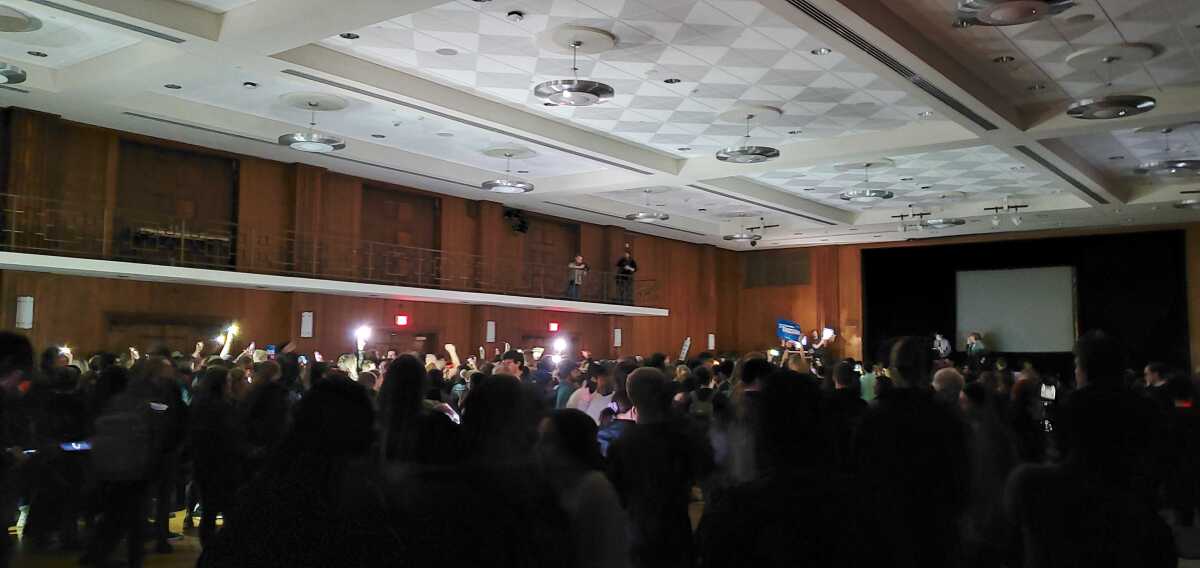
Earlier, the lights just mysteriously went out for five minutes in the University of Iowa ballroom where 759 caucusgoers were listening to opening remarks. Not to be distracted on such a potentially consequential night, the speaker on stage kept going.
- Share via
Voter voices: Caucus at senior center caters to residents, staff and their families
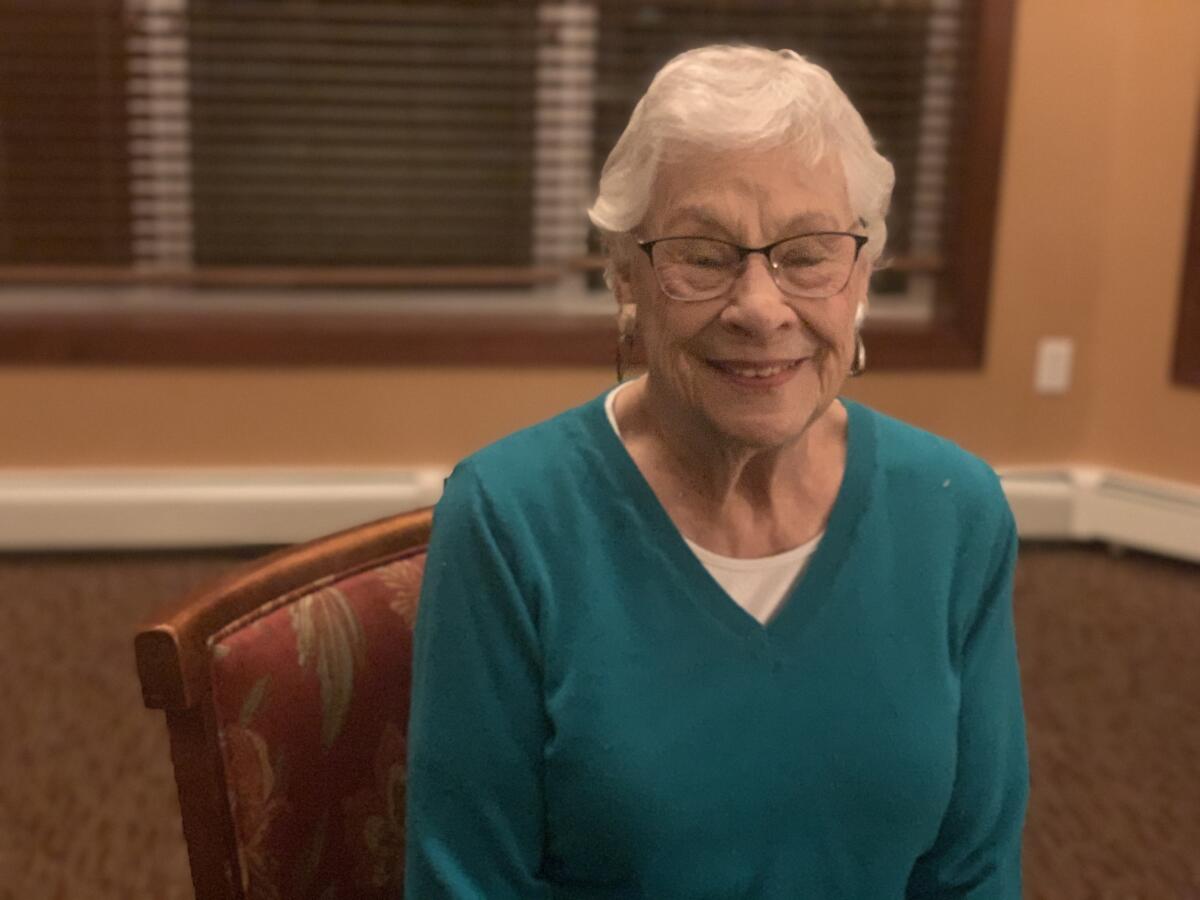
Presidential candidates often urge Iowa caucusgoers to stand in their corner on election night. But at the caucus at Walnut Ridge Senior Living in Clive, Iowa, a more apt request would be to sit at their table.
The caucus site in a Des Moines suburb is specifically geared toward the senior housing complex’s residents, along with their families and members of the staff.
The accommodations in a converted dining hall include more seating and a relatively low-volume atmosphere — perfect for caucusgoers like Ruthanne Free, who find standing for hours on end to be a daunting prospect.
“It just gives me an opportunity as an elderly person to be part of this whole process,” said Free, 90, who has never caucused before. She sat at the table for former Vice President Joe Biden, who she described as “experienced, composed and civilized.”
Even before the caucus began, it was clear which candidates would perform well at this location, which hosted about 50 people. The Klobuchar and Biden clusters required extra tables to accommodate their growing ranks.
Karen Cameron and her daughter Abby Vens sat at a more sparsely populated Buttigieg table, while Cameron’s parents, who are residents of the facility, sat with the Biden group.
“I thought it would be less hectic,” Cameron, a 61-year-old nurse, said of her decision to caucus at the site.
Cameron said she and her daughter were both open to other candidates, including Biden and Klobuchar. When a caucus site organizer came by to ask who at the Buttigieg table would be responsible for keeping track of the count of supporters, Cameron pointed to her daughter.
“What?” said Vens, a 23-year-old teacher. “I don’t know enough!”
- Share via
At Waukee precinct caucus, a place for the uncommitted
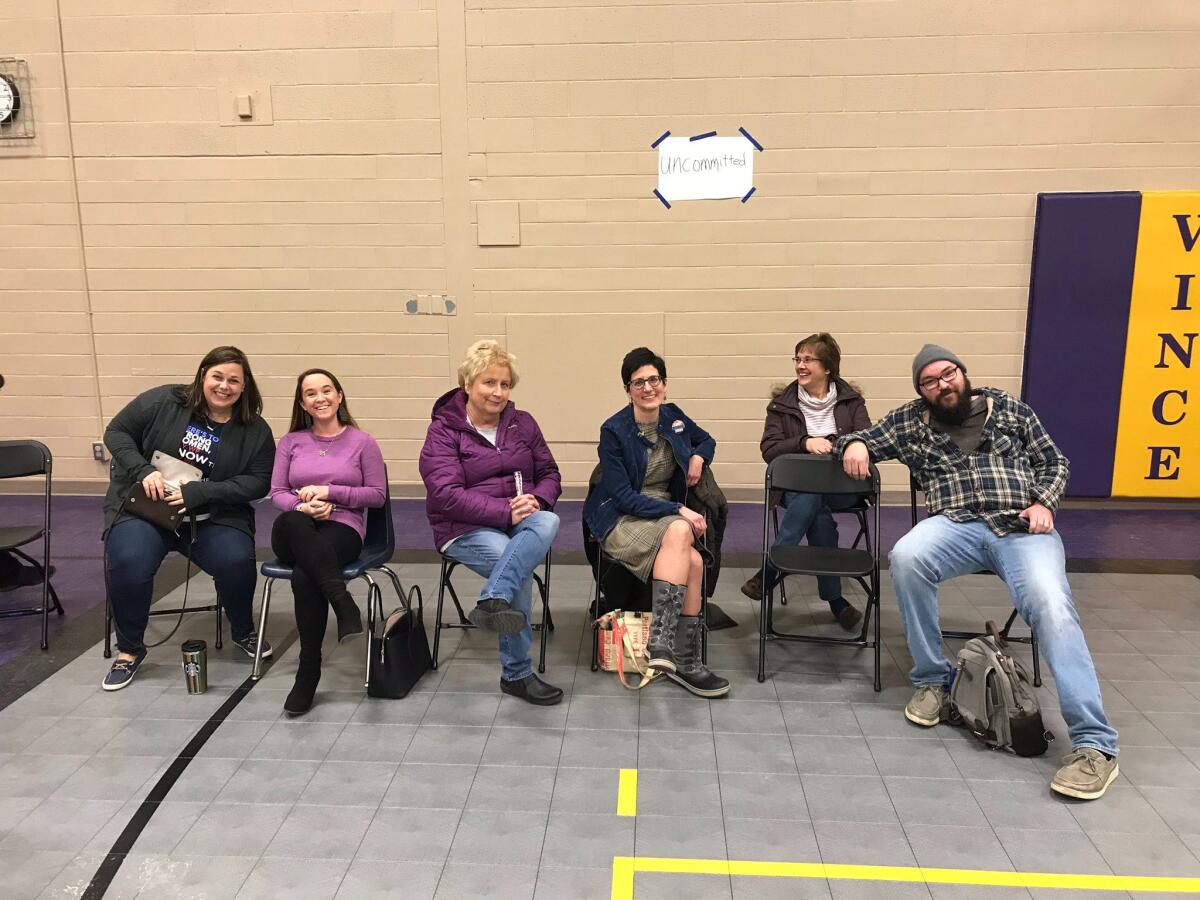
As Iowans filed into a gym in Waukee, many of them congregated in front of the candidates’ signs posted along the walls: Biden. Buttigieg. Klobuchar. Sanders. Warren. Yang.
But a smaller group of the Waukee Precinct 1 caucusgoers sat in chairs in front of a small sign that said, “Uncommitted.”
Uncommitted. Even after all this time. Even on the night of the caucus. It will be the job of their fellow caucusgoers to woo them to their candidate.
“I just don’t feel like there’s anybody who’s pulling in front for me,” said one of the uncommitted, Kelli Hansen, 37, an officer manager at a radio station. “I’m a little bit nervous about who can actually beat Trump. I’m just not ready, with so many candidates right now, to commit to one.”
It also happens to be Hansen’s first caucus; she recently moved to Iowa from Nebraska. So she’s ready to hear the arguments from her fellow caucusgoers and “really excited to see how it all goes down.”
- Share via
How has Dubuque tried to become a welcoming place for people of color

The nearly all-white city of Dubuque, Iowa is trying to shed its racist reputation. Video by Jackeline Luna and Maggie Beidelman.
Every four years, Iowa and its voters face widespread criticism that the state is too white, too rural and its residents too parochial to play such an outsize role in the presidential primary process.
In Dubuque, where African Americans make up just 4% of the population, city officials have launched several unity campaigns to combat a history of cross burnings and racial tensions
The Los Angeles Times’ Tyrone Beason spoke with Dubuque residents, government officials and activists about the city’s efforts to shed its racist image and become a welcoming place for people of color.
- Share via
Voter voices: She’s volunteering for Buttigieg after hearing him talk about his faith
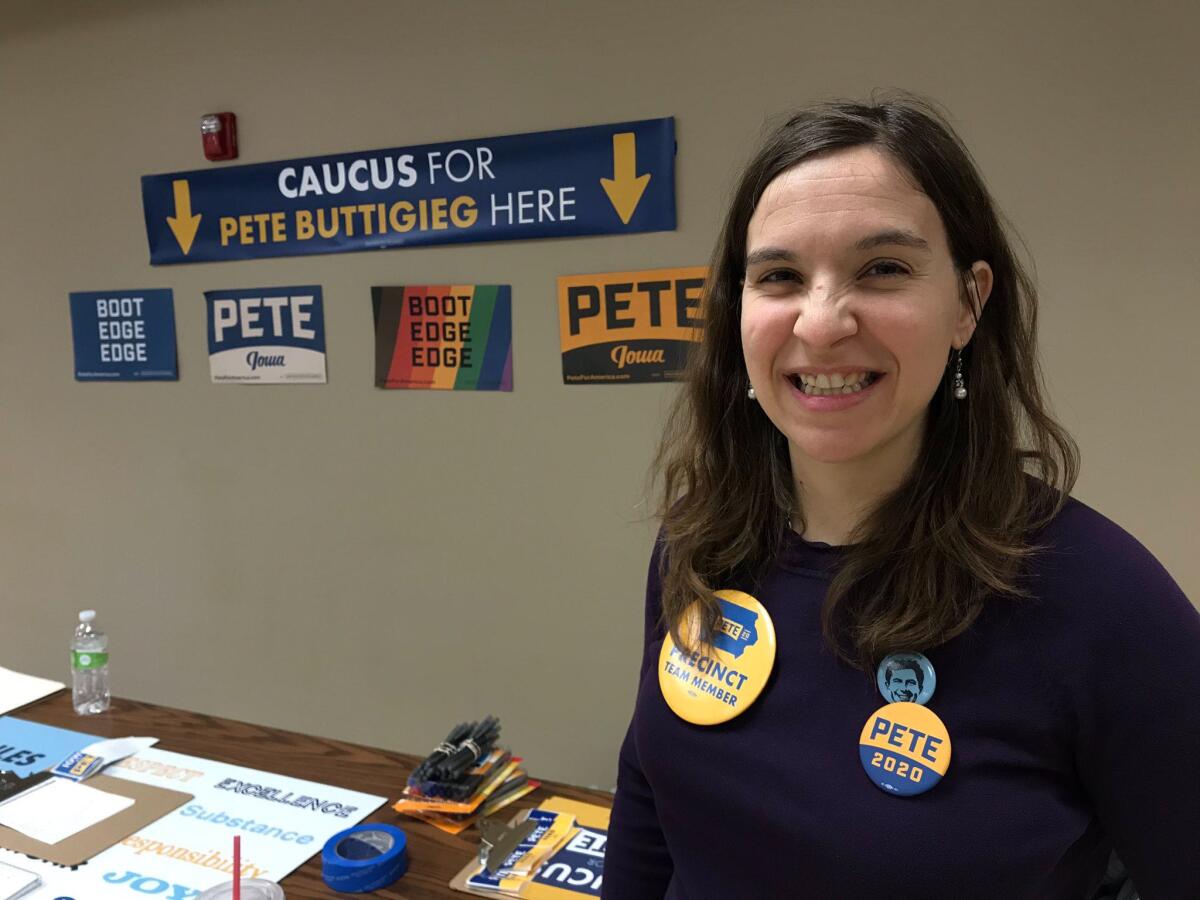
Lena Rydberg Freese, a 37-year-old physician from Waukee, decided to start volunteering for Pete Buttigieg’s campaign after hearing him speak about his faith at a local event about a month ago.
Freese, who has four children, said she has struggled to explain why some of President Trump’s remarks in office were inappropriate, and “I know I wouldn’t have that situation with Pete.”
- Share via
Follow live results from the Iowa caucuses
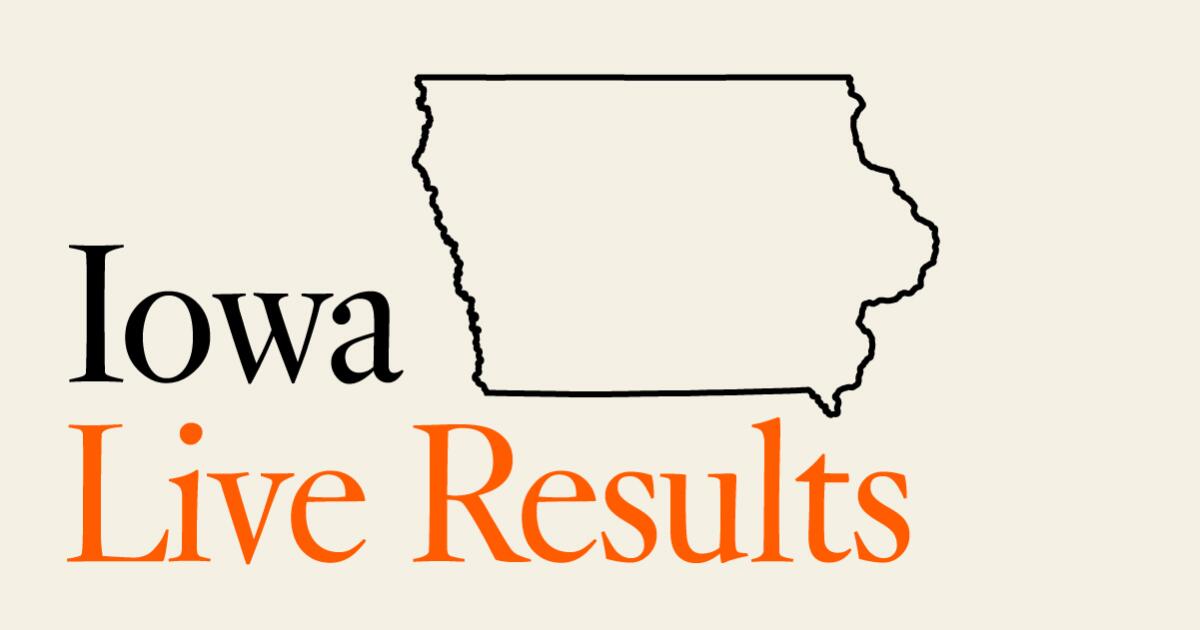
Voters in Iowa gather tonight to support their candidate of choice in the first nominating contest of the 2020 election. Forty-one delegates are at stake. Follow the results live on latimes.com.
- Share via
Voter voices: Sanders support from 2016 ready to make the case in 2020

‘He’s been a consistent legislator who hasn’t swayed in his policy positions.’
— Vit Baccam, a 46-year-old account manager caucusing in Waukee
- Share via
Voter voices: Warren’s anti-corruption messaging has this Iowan excited to caucus
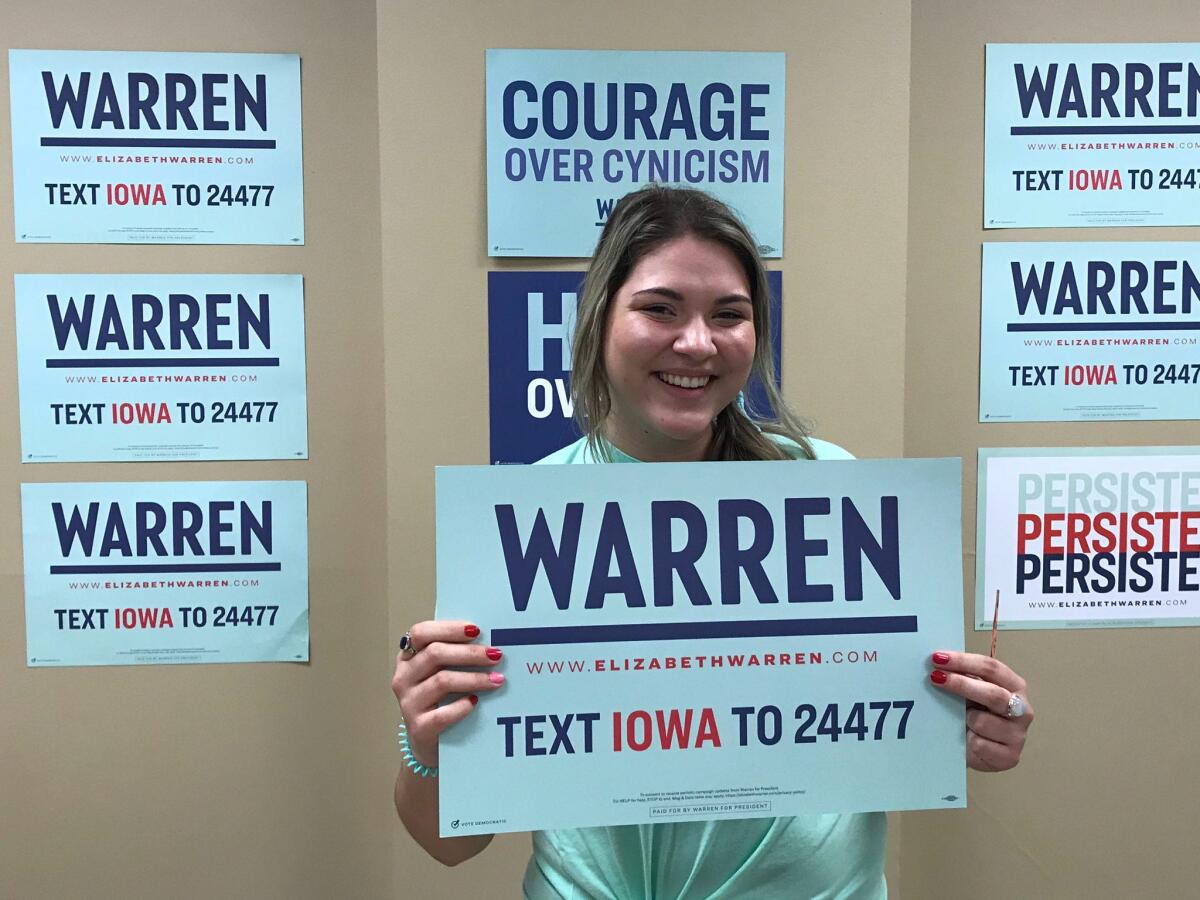
I’m so hyped
— Kiara Fish, a 24-year-old resident of Waukee, Iowa, who didn’t participate in the 2016 caucuses because she was so disengaged with politics
- Share via
Voter voices: It’s time to elect a woman for president
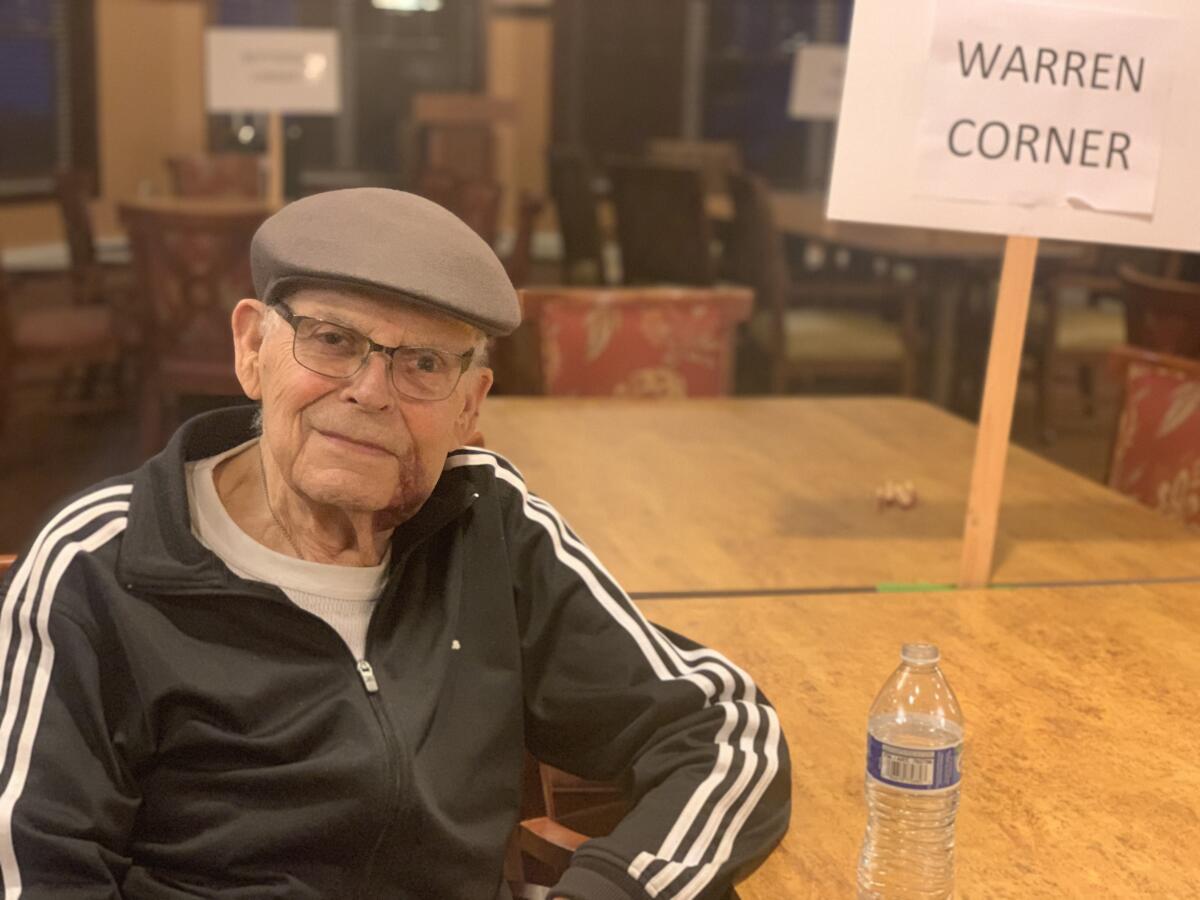
I like her aggressiveness and her experience in the Senate. And it’s about time for the United States to elect a woman for president.
— John Economos, a 93-year-old retiree who lives in an assisted living facility in a suburb of Des Moines
- Share via
Voter voices: Single mother sees hope in Sanders
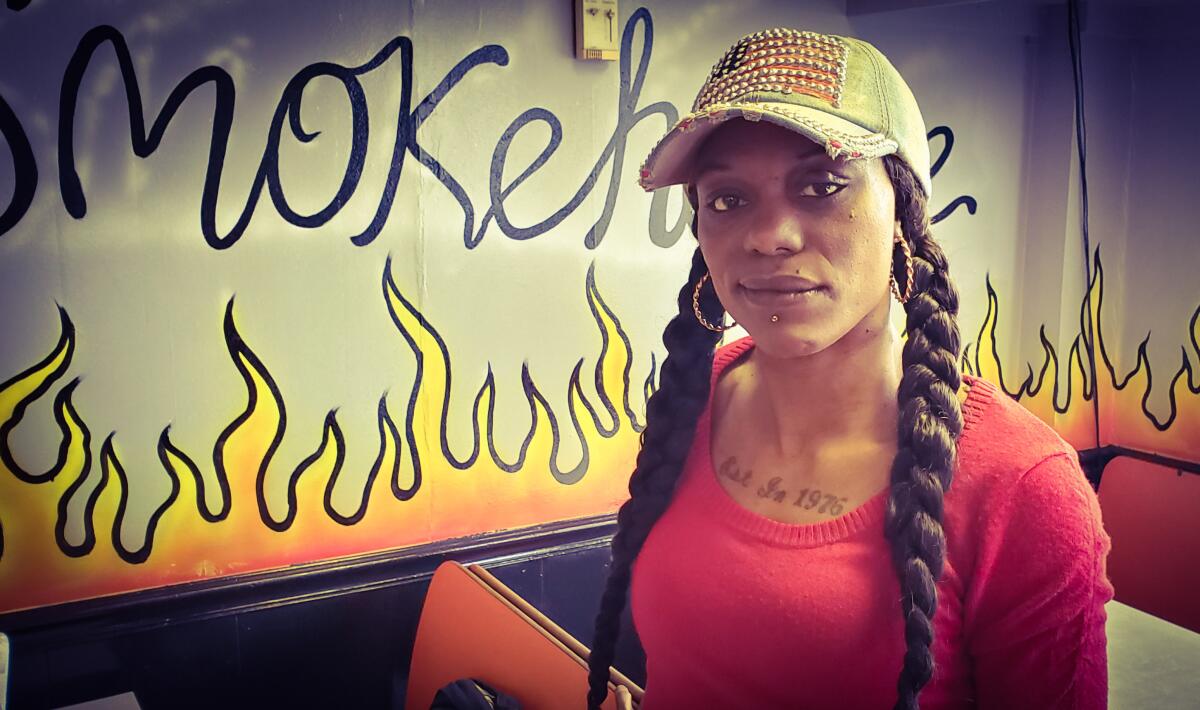
‘It’s hard – you’re either working so many hours and you can’t focus on your family, or you’re focused on your family and worrying about paying the bills.’
— Almetha McCollins, a server at McNeal’s Smokehouse restaurant and a warehouse worker in Davenport, who plans to caucus for Bernie Sanders
- Share via
Voter voices: Yang’s politics speaks to some
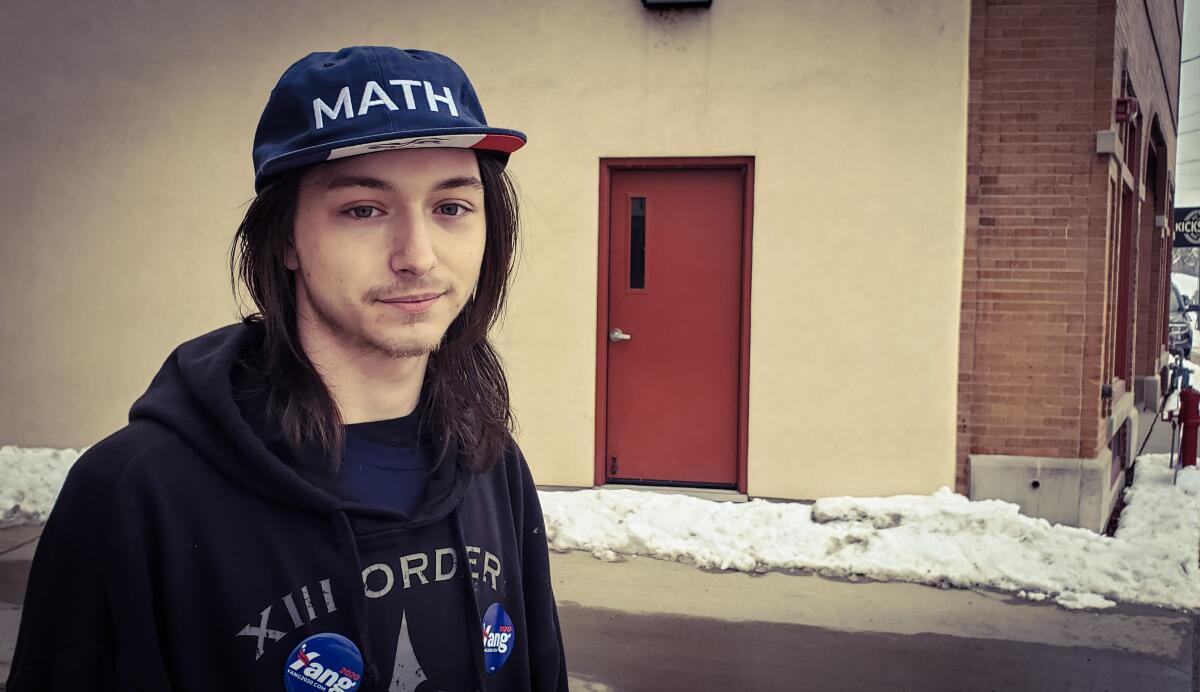
‘With my friends, I trust them with my life. With Andrew, I would trust him with my well-being.’
— Ethan Erlacker, a 21-year-old gas station employee from Cedar Rapids who plans to caucus for Andrew Yang
- Share via
Trump children appear in Iowa ahead of caucuses
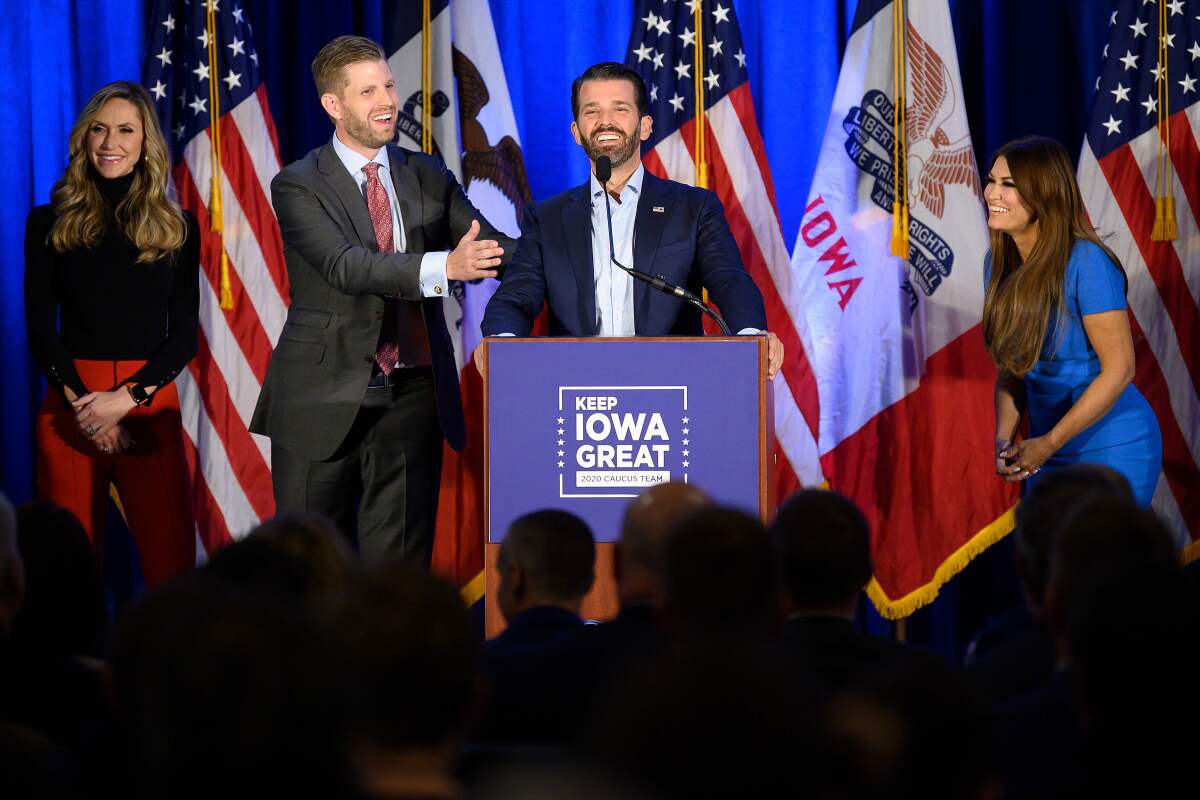
WEST DES MOINES, Iowa — Hours before Iowans head to caucus, Donald Trump Jr. said Monday that his father’s reelection campaign would swamp whichever candidate Democrats ultimately pick as their nominee.
“I promise you, over the next 10 months Donald Trump will make this very, very entertaining for you all,” the president’s eldest son said at a campaign event.
A protester interrupted Trump Jr., screaming that the president was responsible for growing anti-Semitism. He was dragged out of the event by security.
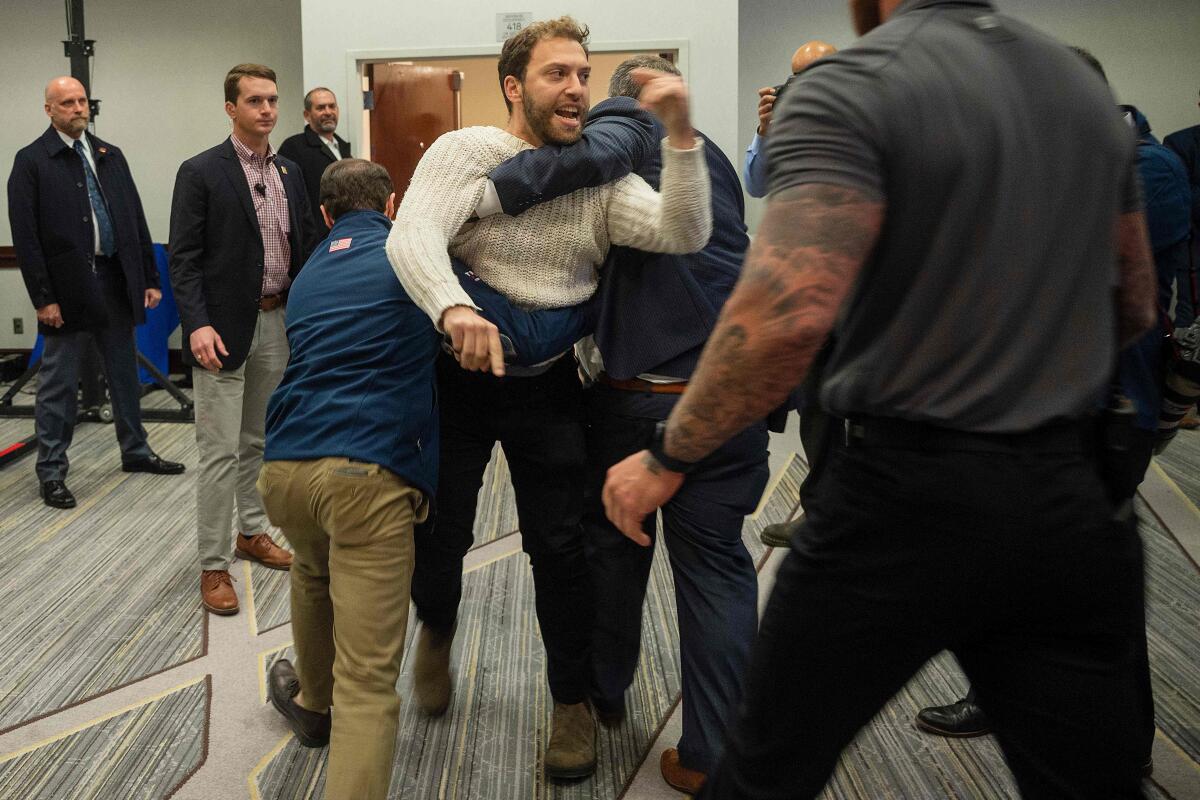
Trump Jr. appeared with his girlfriend, Kimberly Guilfoyle, his brother Eric Trump, sister-in-law Lara Trump and the president’s reelection campaign manager, Brad Parscale.
The quintet are among 80 Trump supporters who fanned out across Iowa on Monday to campaign for the president.
“We’ve built the largest grass-roots army the Republican Party, the country has ever seen,” Parscale said in a bit of campaign hyperbole. “We built a well-oiled machine, and today’s the first test of that machine.”
Eric Trump predicted that Trump would run stronger than he did in 2016, when the family was new to politics.
“We are going to beat them so much bigger this time than we beat them before,” he said, noting that Trump won Iowa in 2016 by nearly 10 percentage points over Hillary Clinton. “We had no advantage back then. We had no idea what we were doing. We were a family that had never run for anything. We literally didn’t know what caucuses were.”
Although most of the attention has focused on Iowa’s Democratic caucuses, Republicans will caucus tonight as well. Two Republican challengers have campaigned in the state, but they pose virtually no threat to Trump’s reelection bid.
Guilfoyle, a senior advisor to Trump’s campaign, pointed to the messages from the Democratic candidates as a reason for Republicans to remain united behind the president.
“Everything is on the line because the liberals, the Democrats, the socialists, the communists — that’s the other side, right? That’s the juxtaposition,” she said. “They have lost their minds. We have not lost our way, and with the help of God we will get this done.”
- Share via
For political ‘tourists,’ Iowa is the place to be

In the days and weeks before the Democratic presidential primary’s first contest in Iowa, some Iowans have been sheltering in their homes and not picking up the phone to avoid the furious campaigning of this year’s competitive race. They’re ready for this thing to be over.
But not the roving bands of caucus tourists who have descended on Iowa from across the country, who are thrilled to get a chance to see the candidates up close. Some will even get to witness Iowa’s caucus system unfold Monday night.
Ethan Appleby, 35, a tech entrepreneur from New York City, saw the hit musical “Hamilton” the same week that Donald Trump was elected in November 2016, and he realized he needed to learn more about the history and current state of the country.
In the following year, Appleby read three dozen books about the founding fathers before embarking on several trips to middle America, including one in 2019 to the Iowa State Fair, where he saw several presidential candidates speak.
The Times’ Matt Pearce caught up with Appleby and others in Iowa, where they took part in the caucus process.
- Share via
In Scotland, Iowans back Bernie Sanders during remote caucus
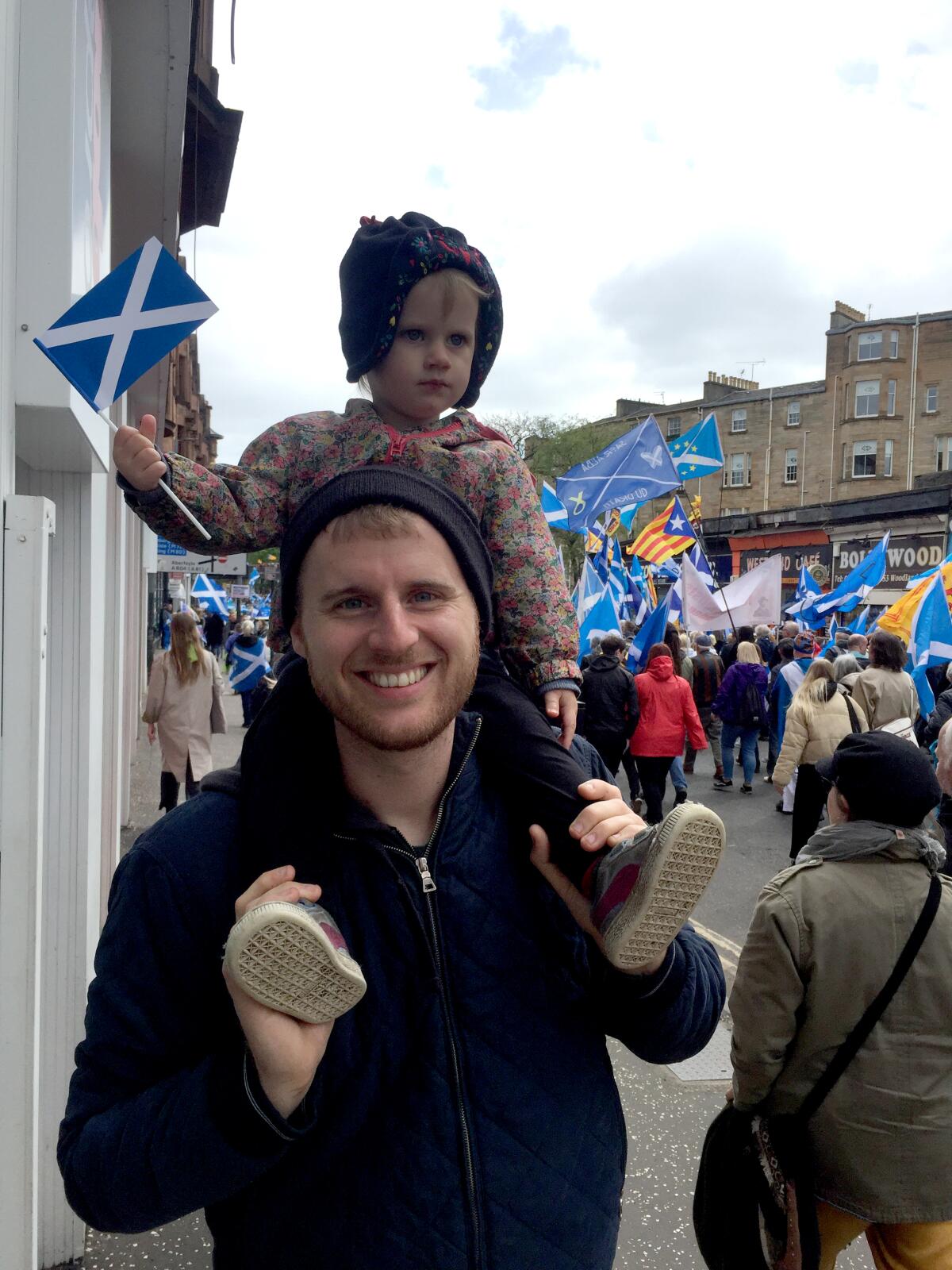
Bernie Sanders can claim victory at Iowa’s remote caucus in Scotland.
Of the 19 voters who caucused in Glasgow, nine backed the Vermont senator, six supported Elizabeth Warren, three voted for Pete Buttigieg and one voter refused to realign.
“It was everything I wanted it to be — spirited, lively, friendly,” said Colyn Burbank, a 31-year-old master’s student in social work at the University of Strathclyde, who hosted the remote satellite caucus at his flat in Glasgow’s West End neighborhood.
His friends decorated the space for the occasion, complete with cornstalks, Iowa flags and slogans from the movie “Field of Dreams.” In a bid to bring a bit of home to Glasgow, they also served Iowan and American snacks: popcorn, chips and salsa, and “puppy chow” -- a mix of Chex cereal, chocolate and peanut butter.
The caucus began at 7 p.m. in Scotland — 1 p.m. in Des Moines — and took a little more than hour to complete in Burbank’s living room.
In the first round, the alignment was more varied, including one voter for Amy Klobuchar and two for Andrew Yang. But when those candidates failed to reach the 15% threshold, their supporters went around the living room to listen to pitches from voters whose candidates qualified.
Two of them went with Warren. One didn’t cast a second vote.
Speaking afterward from his local pub, Burbank, a native of Des Moines who supports Sanders, said he was gratified that his first choice won. Living abroad has strengthened his belief that America needs a major healthcare system overhaul.
“Universal healthcare is a no-brainer,” he said. “The healthcare system is not perfect in Scotland, but it’s a heck a lot of better than in America. This is Bernie’s thing.”
Initially, Burbank and his wife, Hilary, planned to host a few voters living across the United Kingdom — longtime Iowan friends whose political leanings they know. But the event doubled in size as more Iowans signed up.
Although Burbank said he hoped the result boded well for Sanders, he wasn’t sure his small band of voters who traveled to the caucus from Edinburgh, London and St. Andrews were a representative sample of Iowa.
“Iowans traveling to a caucus in Glasgow,” he said. “We’re a bubble within a bubble within a bubble.”
Still, he noted, he was happy to find that Sanders’ supporters spanned young and old.
“It was just very positive,” he said. “Everyone was Iowa nice.”
- Share via
For some Iowa Democrats, anything is preferable to Trump. Even a potato
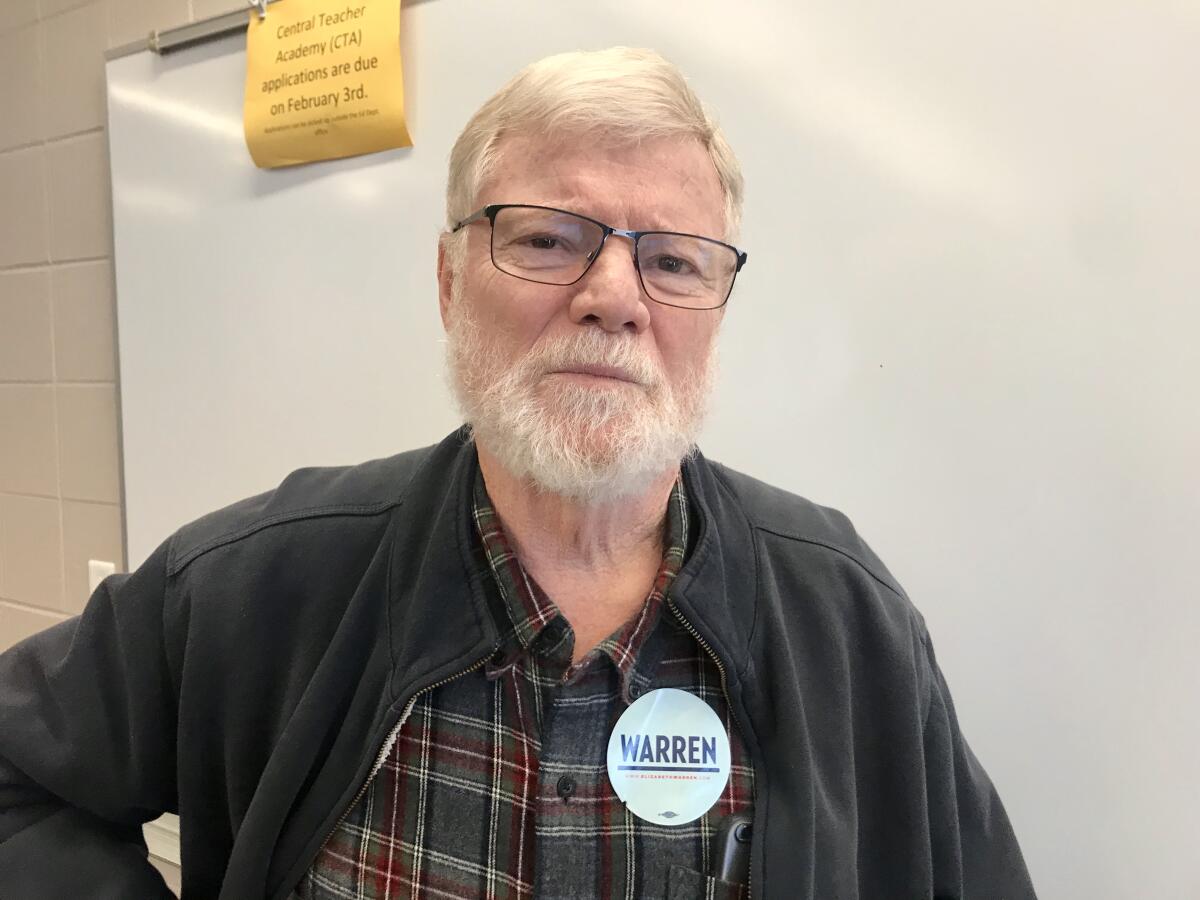
Voters across Iowa may have completely different takes on Sanders vs. Biden or Warren vs. Buttigieg. But one thing many seem to agree on is that anyone — or anything — is an improvement on President Trump.
“I’ll vote for a dead body right now,” said Pete Peterson, who plans to caucus Monday for Massachusetts Sen. Elizabeth Warren. “Frankly, I don’t care who it is.”
At a campaign event for Minnesota Sen. Amy Klobuchar, Lucinda Harms, a 60-year-old pharmacist, said she would vote for “any responsible adult” running against Trump.
“I would vote for a potato,” one woman quipped to presidential hopeful Pete Buttigieg, the former mayor of South Bend, Ind.
Electability has been a dominant theme as 11 candidates compete for the Democratic nomination. But even as voters in Iowa argue about which candidate will have the best shot against Trump, many admit they will back anyone but the current occupant of the White House.
“I will vote for Satan himself,” said Melissa Snydacker, who is supporting Sen. Bernie Sanders of Vermont.
Su Groff-VanArendonk, 65, who supports former Vice President Joe Biden, said he’d be willing to choose Sanders, Biden’s progressive counterpart, or, if it came down to it, a donkey, “if they put him on the ticket.”
Online, one Twitter user said voting for a potato was “an easy vote.”
“I’d vote for a damn raisin. I’d vote for an expired can of tuna,” the user continued. “I’d vote for a warm glass of prune juice.”
And on the podcast “Hacks on Tap,” GOP consultant Mike Murphy noted that Trump’s low approval numbers were a good sign for progressive candidate Sanders, who leads some of the recent Iowa polls. “Not being Trump gets you close,” he said, “even if you’re a bag of cement.”
Times staff writers Mark Z. Barabak, Matt Pearce and Michael Finnegan contributed to this report.
- Share via
Democratic presidential candidate Michael Bloomberg brings his campaign to California
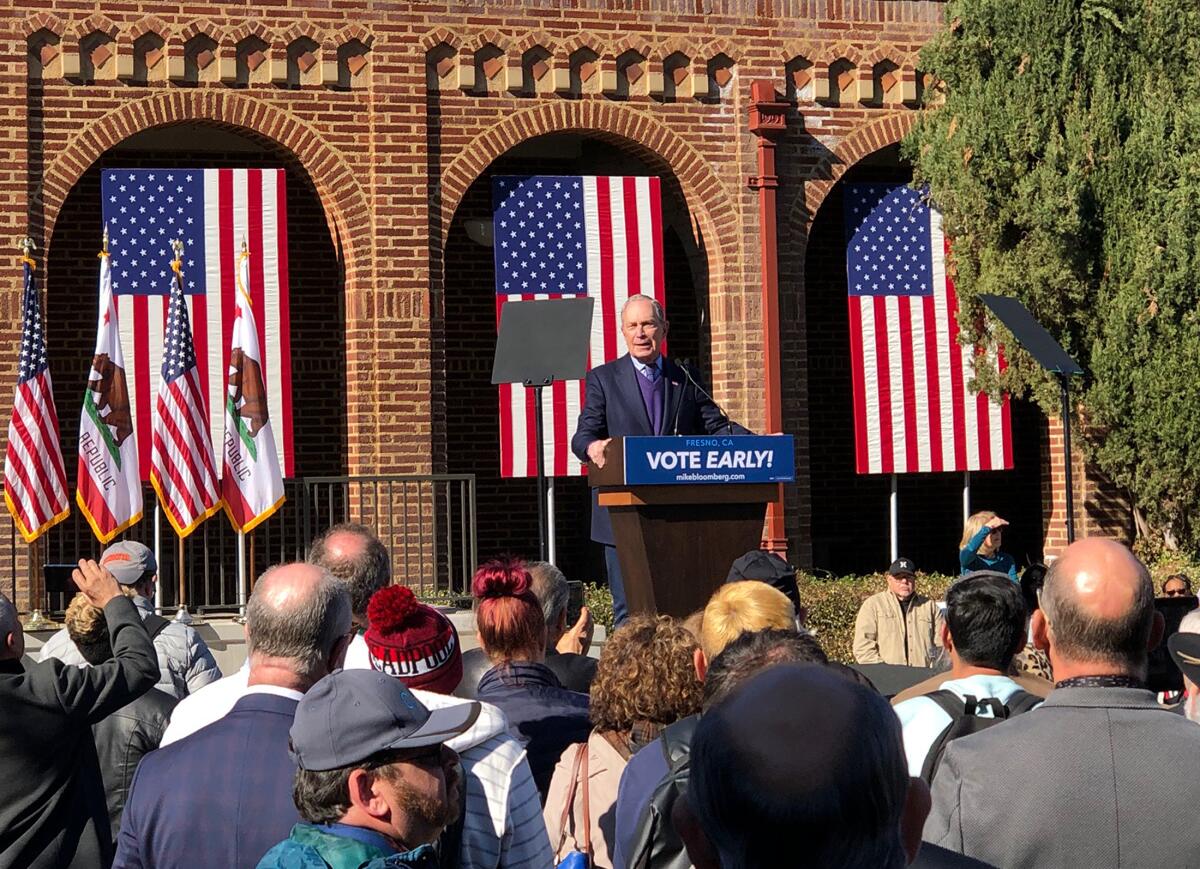
FRESNO — After a weekend of weathering insults from President Trump, billionaire Michael R. Bloomberg argued Monday that he was a tough New Yorker who could stand up to the “bully” if he were to win the Democratic nomination.
“There is nothing that Trump can do or can say that will hurt me,” the former New York City mayor told a small crowd in a courtyard of Fresno City College. It was the third stop of his two-day California campaign swing.
Accompanying Bloomberg was former Los Angeles Mayor Antonio Villaraigosa, who said Trump, with his weekend mocking of Bloomberg’s 5-foot-8 height, came off like a “crybaby.”
Trump falsely accused Bloomberg of negotiating with Democratic leaders for a box to stand on if he qualified to participate in the party’s presidential debates.
“I’m a New Yorker, and I’ve never backed down from a bully or run away from a fight,” Bloomberg told about 100 people in Fresno.
As most of his Democratic rivals were wrapping up their campaigning for Monday’s Iowa caucuses, Bloomberg was traveling across California, with morning stops in Sacramento and Fresno before a planned afternoon visit to Compton.
Californians start voting by mail this week for the state’s March 3 presidential primary. Bloomberg joined the race so late — on Thanksgiving weekend — that it was virtually impossible to compete in Iowa and the other three states with contests in February: New Hampshire, Nevada and South Carolina.
But he has spent more than $300 million on advertising in more than two dozen other states that hold contests in March and beyond, according to Advertising Analytics, an ad tracking firm.
In California alone, he has already plowed $35 million into television, radio and digital advertising — an enormous sum for any campaign to spend more than a month before election day, far eclipsing the amount spent by all of his rivals combined.
By the end of the week, Bloomberg will be employing 300 full-time campaign staff members in California, and by next week 500 more temporary workers will be on the payroll, said Dan Kanninen, the director of his state operations.
- Share via
Iowa’s electorate — very small, not very representative
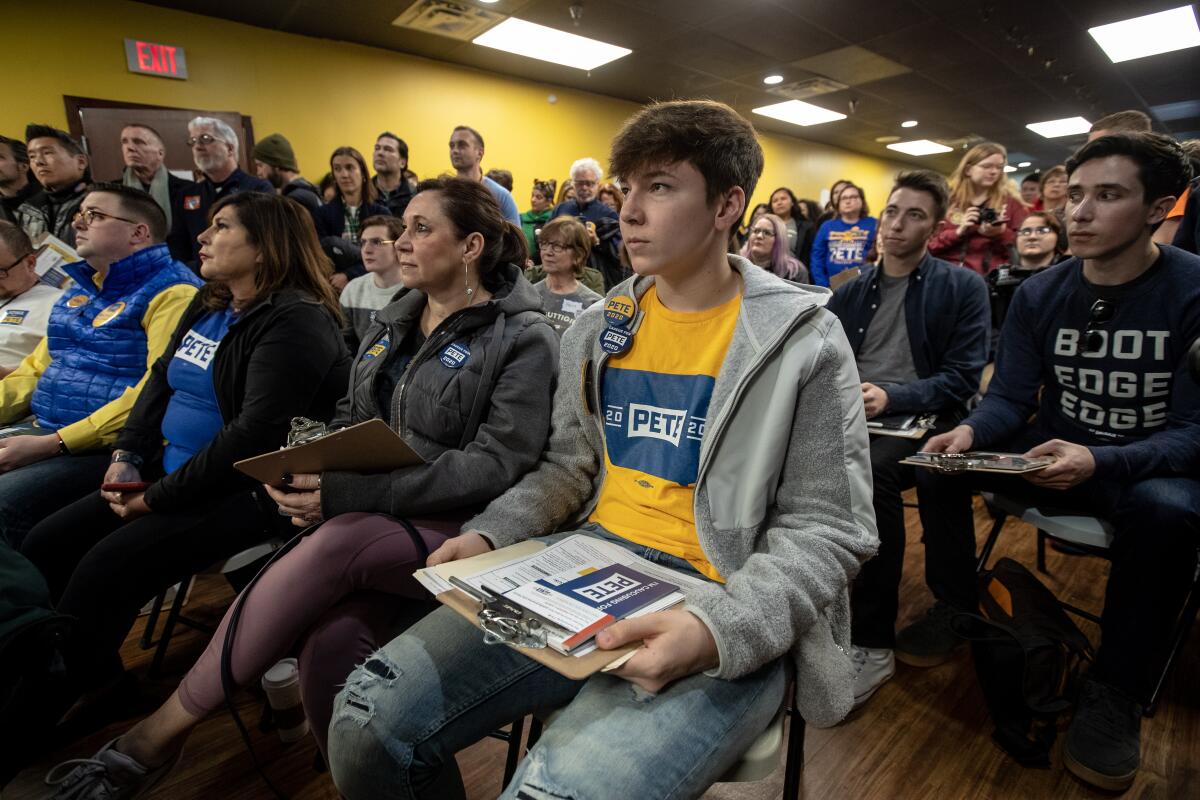
For all the attention Iowa’s caucuses receive, only a relative handful of voters participate.
Iowa’s Democratic Party leaders have said that the roughly 1,700 precinct caucuses around the state could see record attendance Monday night. That would mean breaking the mark set in 2008 when Barack Obama and Hillary Clinton competed for Iowa votes. That year, just short of 240,000 of Iowa’s Democratic voters showed up to caucus.
For comparison’s sake, that’s about the number of voters in a typical contested congressional election.
Since the Democratic race features multiple candidates — at least five of whom are likely to have significant support — Monday night’s winner could end up with as few as 50,000 votes, or about 8% of Iowa’s roughly 615,000 registered Democrats.
By contrast, about 5.1 million people voted in the Democratic presidential primary in California in 2016.
The fact that such a small group of Iowa voters has such a large influence on the shape of the presidential race perennially upsets many Democrats in larger and more diverse states. Critics note that not only are the numbers tiny, but they’re also not representative: Iowa’s population is only 4% African American and 6% Latino.
Only two other states besides Iowa will pick Democratic convention delegates through caucuses this year — Nevada and Wyoming. The number of states using caucuses, rather than primaries, has declined sharply in recent election cycles.
Defenders of Iowa’s first-in-the-process status — and the similar position of New Hampshire’s first primary — say the small size of those states allows lesser-known candidates to have a shot through sustained one-on-one campaigning with voters.
In bigger states such as California, running for office requires advertising on television, which requires money, which largely shuts out all but the best-known (or wealthiest) office-seekers.
The Democrats have taken some steps to reduce Iowa’s and New Hampshire’s influence by allowing South Carolina and Nevada, both of which have large nonwhite populations, also to hold nominating contests in February.
The biggest day in the nominating calendar is on March 3, when 14 states — including the two most populous, California and Texas — will hold primaries.
- Share via
The pressure’s on to woo Iowa voters, but Andrew Yang’s ‘having a blast’
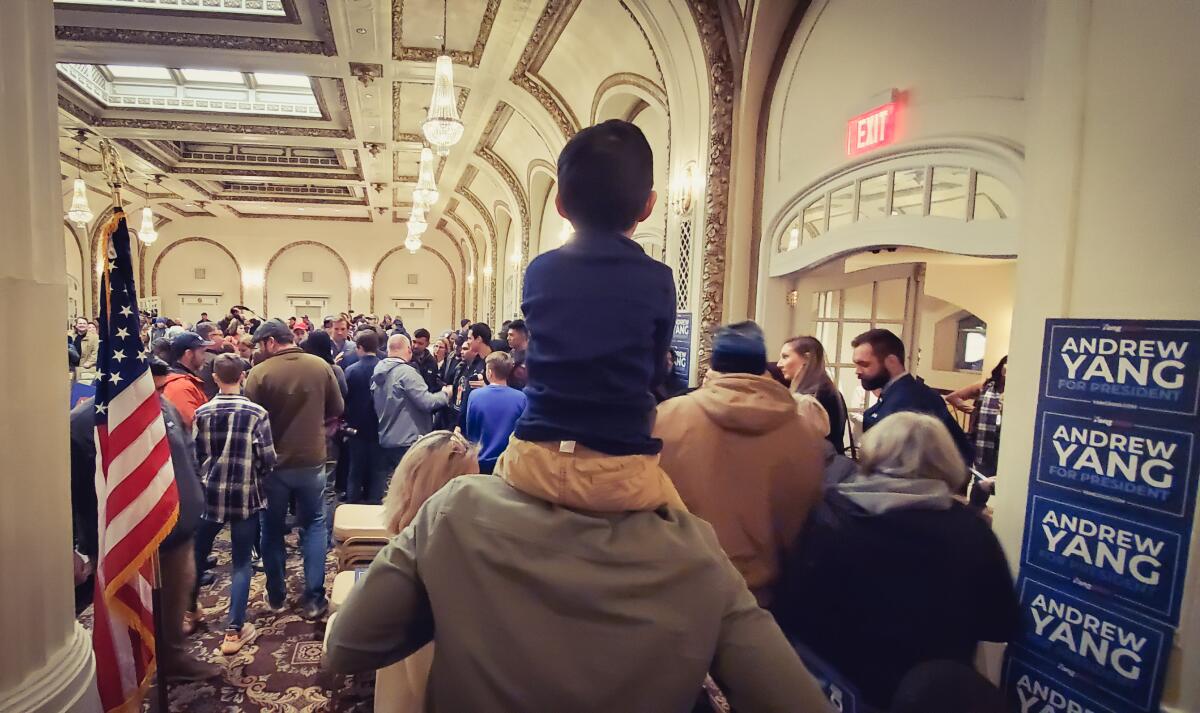
As Democratic presidential candidates reach a tipping point in Iowa — success in the state would bring an aura of legitimacy and viability in a crowded field — Andrew Yang is “having a blast.”
The L.A. Times’ Tyrone Beason spent time with Yang’s supporters over the weekend as Iowa voters prepared to make their choices.
- Share via
‘It’s overwhelming’: For Iowa Democrats, there’s nowhere to hide from this presidential campaign
Democracy. It’s a blessing and a burden, Iowans can tell you.
Ellen Thornwall’s eyes widened as she described what it was like to move from Colorado to Iowa in June, with the Democratic presidential primary already in full swing. She was getting half a dozen calls a night from those manning phone banks and was seeing only political advertisements on TV.
“We don’t have these things in Colorado,” Thornwall, a 64-year-old retiree from Slater, a small town north of Des Moines, said as she stood in line for a Pete Buttigieg campaign rally in the nearby college town of Ames. “It’s overwhelming.”
With the first-in-the-nation contest in Iowa on Monday — where a big victory could propel a candidate toward securing the nomination — the L.A. Times’ Matt Pearce spoke with Iowa Democrats who found themselves to be a little worn out from being, well, all-important.
- Share via
Iowa voters are bringing the caucus to California and beyond
When Dean A. Genth tries to persuade fellow Iowans at a caucus on Monday to join him in supporting Pete Buttigieg for president, it won’t be in his hometown on the icy Winnebago River; it will be in the balmy desert resort of Palm Springs.
Iowa’s Democratic Party usually requires registered voters to gather in a room near their homes and sort themselves into groups backing each candidate. But this year, it’s hosting satellite caucuses to allow Iowans who are out of state to vote in the contest that kicks off the race for the Democratic presidential nomination.
As many as 140 Iowans are expected to attend the California sites — one in Palm Springs and another at Stanford University. Then there are some who will be caucusing abroad in Paris, Glasgow, Scotland, and Tbilisi, Georgia.
The Times’ Melissa Gomez writes about the out-of-state gatherings that will run like regular precinct caucuses, with the number of allocated delegates weighted by total crowd attendance.
- Share via
Bernie Sanders takes first caucus precinct at satellite location
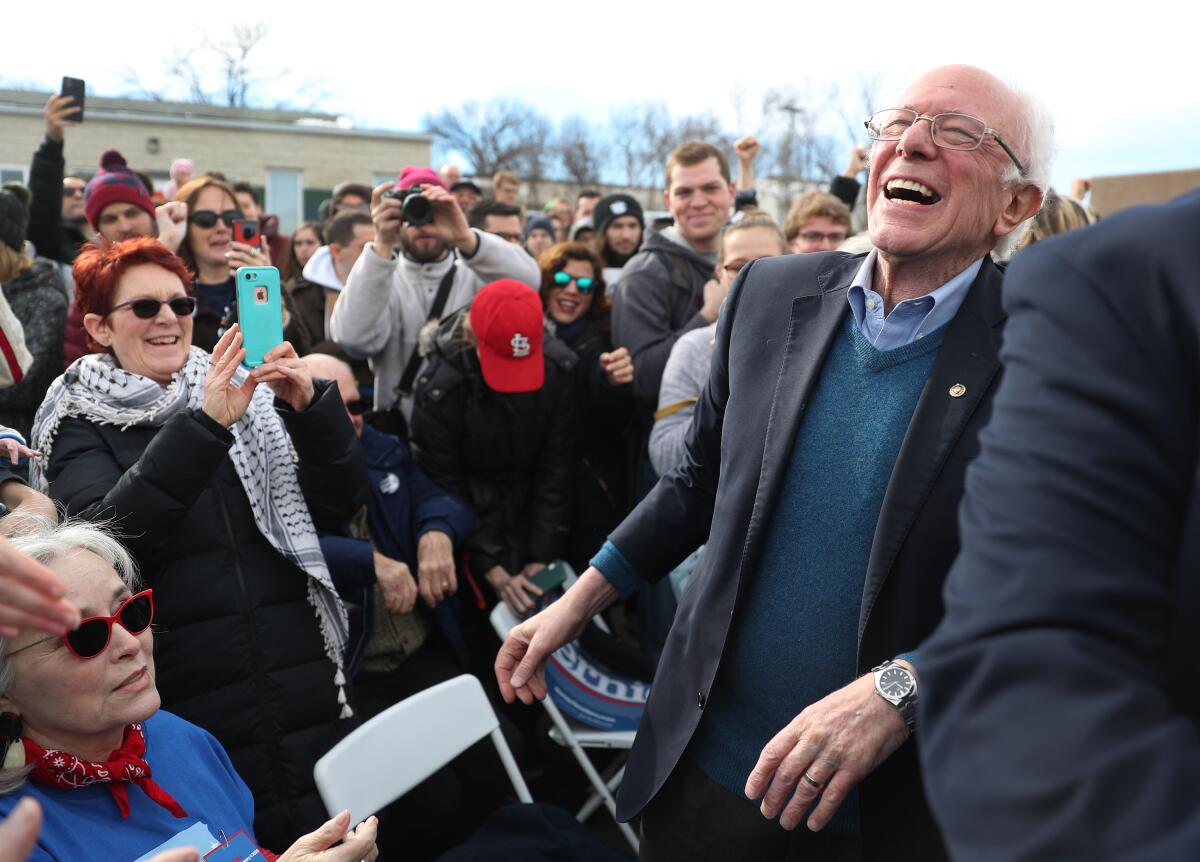
DES MOINES — Bernie Sanders decisively won Iowa’s first caucus precinct, a satellite caucus that drew food-processing workers who were scheduled for evening shifts in Ottumwa in southeast Iowa. Those voters otherwise would not have been able to attend Monday night’s caucuses, according to local media.
Of the 15 who caucused at the precinct, which was held at a United Food and Commercial Workers union hall, 14 of them backed the Vermont senator, and one supported Sen. Elizabeth Warren of Massachusetts, according to the Des Moines Register.
Because the single supporter did not bring Warren up to the 15% threshold of support necessary to make a candidate “viable” for winning delegates, she was given the opportunity to realign with the only other viable candidate — Sanders — and refused, the Register reported.
Most of the Iowa caucuses will take place later Monday night, but some satellite caucuses are being held for Iowans who can’t attend the evening events.
- Share via
The Iowa caucuses rarely pick the president. Here’s why they still matter
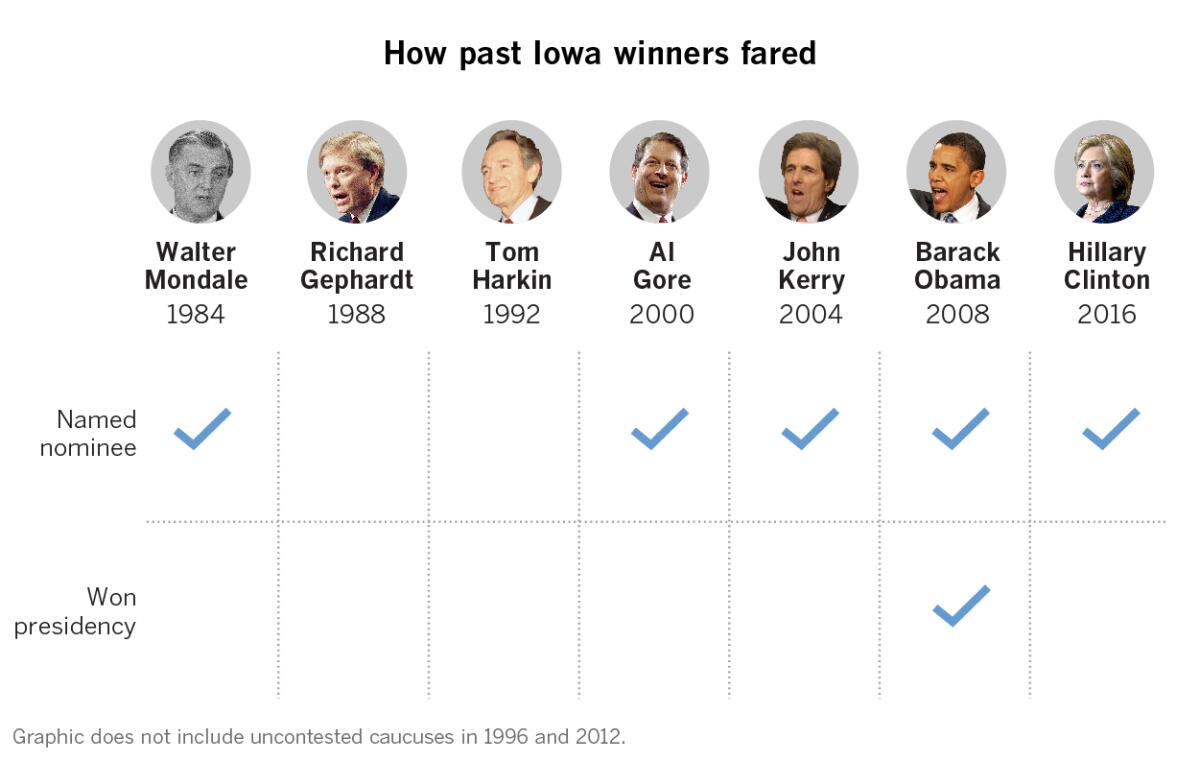
Iowa voters aren’t going to pick the country’s next president. But they will eliminate several possibilities.
The rap on the state, which begins the balloting with Monday’s caucuses, is that it is too small and rural to speak for the rest of America.
The state’s impact, however, is undeniable.
In the last seven contested races for the Democratic nomination, five candidates went on to become the Democratic nominee after winning Iowa. Three winners of the New Hampshire primary, which traditionally follows soon after, went on to claim the nomination.
- Share via
Some Iowans pine for someone more youthful than Biden or Sanders
MUSCATINE, Iowa — Cathy Doermann, a farmer who lives in Mechanicsville, Iowa, hesitated to say out loud why she would not support Joe Biden or Bernie Sanders in the Democratic presidential caucuses.
But with a little prodding, she let loose: “It’s time for the older generation to think about stepping back and pushing the younger ones forward,” said Doermann, 64, who supports 59-year-old Amy Klobuchar, the U.S. senator from Minnesota.
Conversations with Iowans in the days before Monday’s opening contest in the Democratic 2020 campaign made clear that, for a number of them, the fact that Biden is 77 and Sanders is 78 was a significant factor.
“I don’t want an older candidate — none of the ones in their 70s,” said Terri Foster, a 66-year-old retired Realtor who lives in Muscatine. “Their era has passed, and we need some younger blood.”
Foster was still torn between Klobuchar and Pete Buttigieg, the 38-year-old former mayor of South Bend, Ind. “I wish Pete was a little older and had more experience,” she said.
Karl Horms, 60, a structural draftsman who lives in West Liberty, voted for Sanders in 2016 but now thought the Vermont senator was too old, so he too is backing Klobuchar. “Sanders just had a heart attack a few months ago,” Horms said.
Dan Clark, 69, a retired foundation writer from Muscatine who was leaning toward Massachusetts Sen. Elizabeth Warren in the campaign’s final days, spoke with Biden for 15 or 20 minutes when he was a senator running for president in the 2008 race.
He liked Biden then, but now he thinks the former vice president is past his prime. “He falters a bit too much for me,” Clark said.
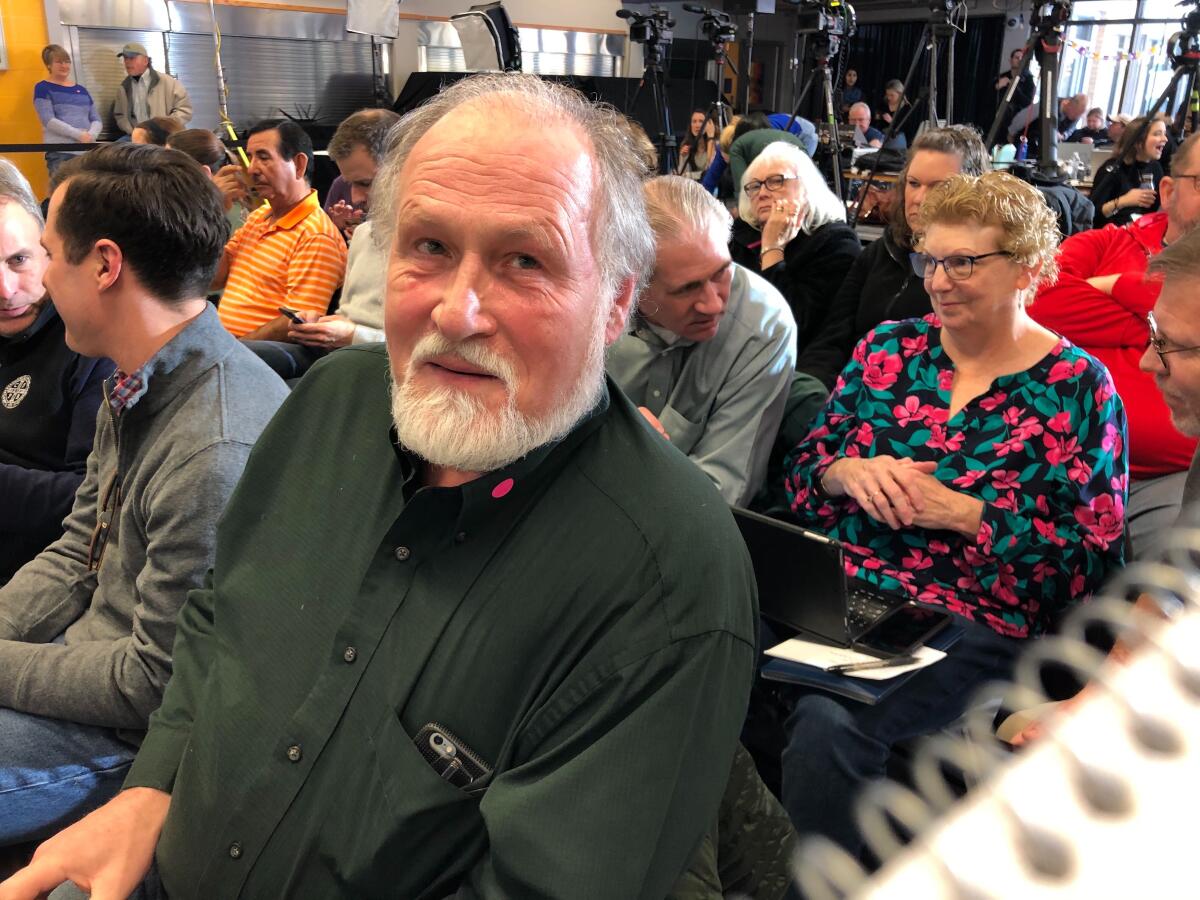
- Share via
Desperate to beat Trump, Democratic voters differ over who can do it and how
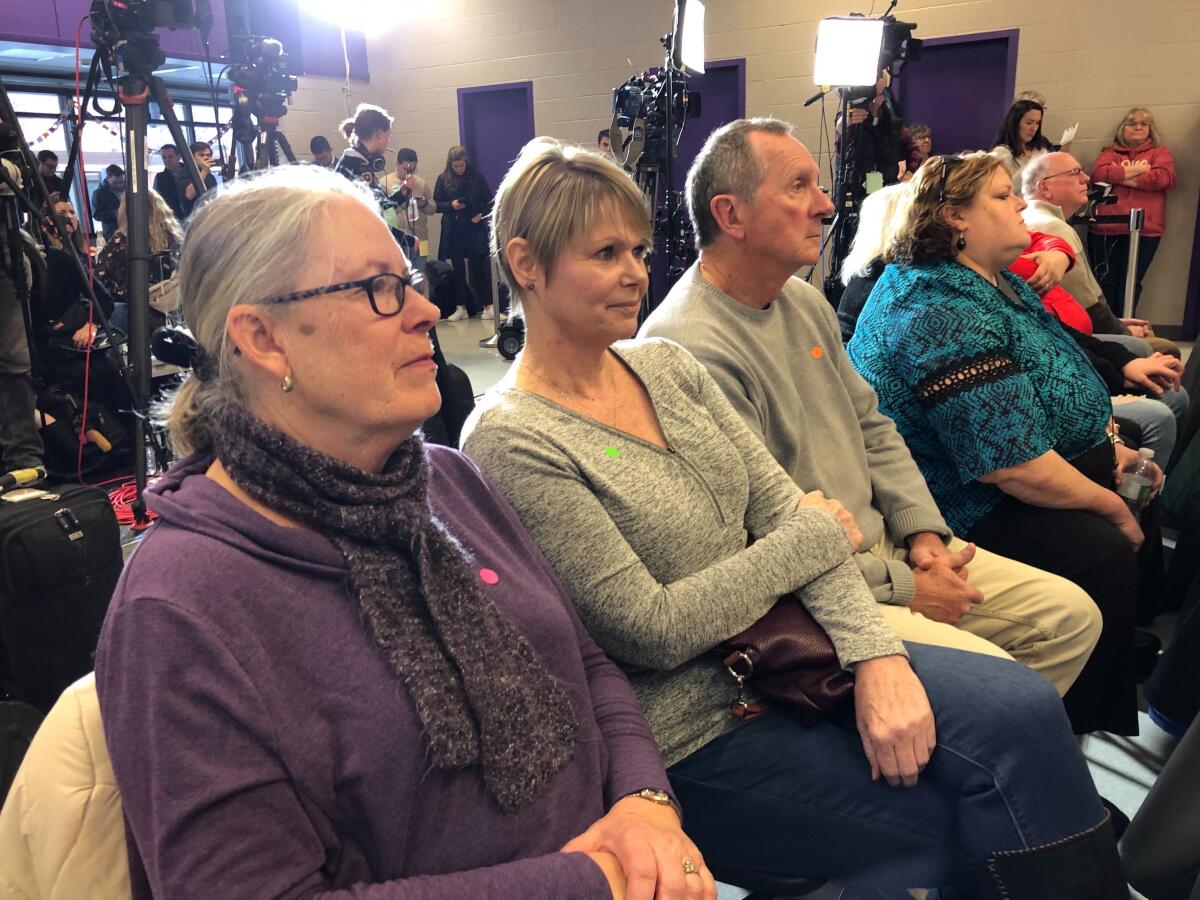
Democrats may be deeply divided ahead of Monday night’s Iowa caucuses, torn between a dozen candidates and cleaved along the traditional line dividing party moderates from more liberal voters. But if there is one overarching sentiment, a desire expressed over and over, it is finding the one candidate most likely to beat President Trump in November.
That, of course, is open to broad interpretation.
“I’m looking for someone who can stand up to him, who’s not going to fall for every nickname or tweet or nasty remark,” said Terri Foster, 66, a retired real estate agent in Muscatine, who is leaning toward Minnesota Sen. Amy Klobuchar or Pete Buttigieg, the former South Bend, Ind., mayor.
That may be just one person’s criteria, but she’s not alone in setting her priorities.
The Times’ Mark Z. Barabak took the pulse of Iowa voters on the question of electability, which has become a central theme of the 2020 campaign.
- Share via
Voter voices: From Booker to Biden
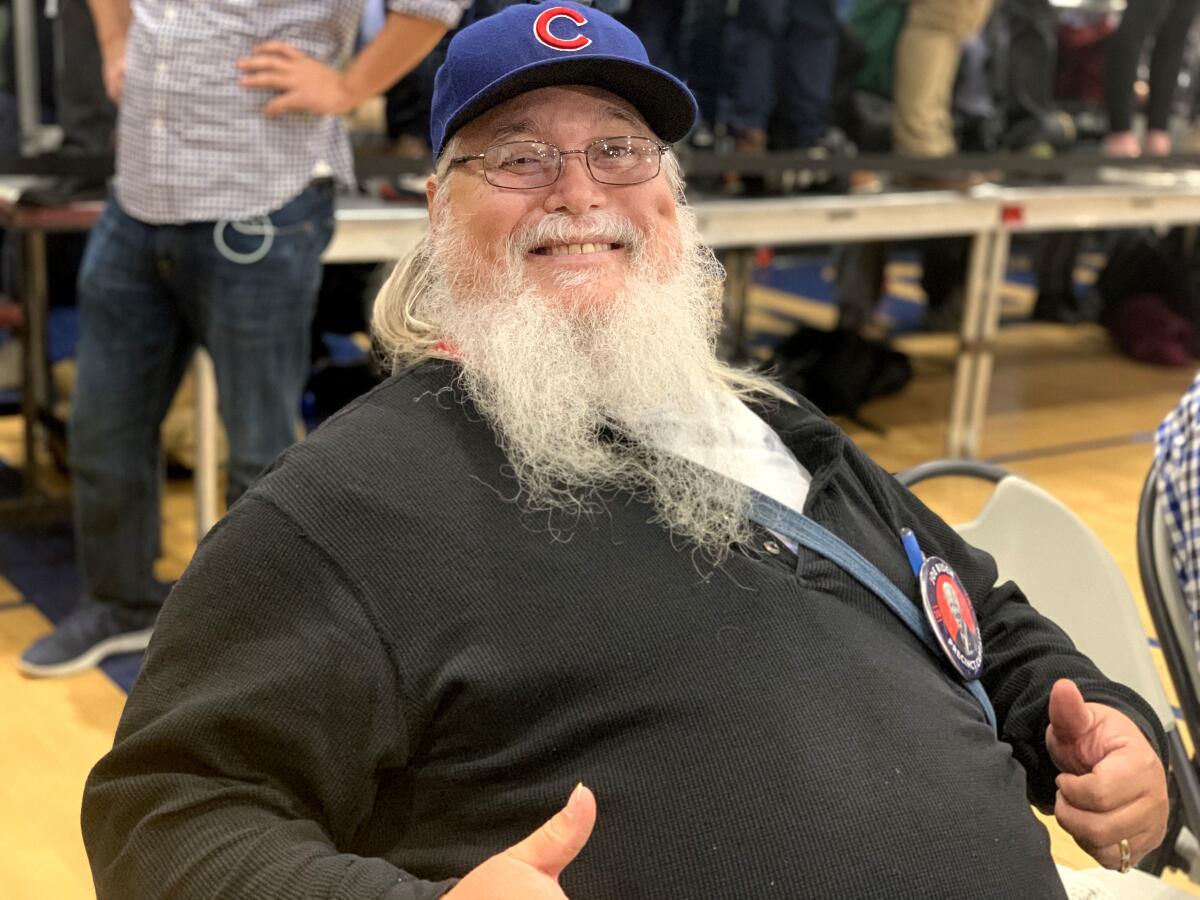
I’ve got a lot of mixed emotions over it because my original candidate, Cory Booker, dropped out a couple of weeks ago. ... I talked to Joe’s sister [Valerie Biden Owens] and our Polk County supervisor. And they just gave me the ‘most electable’ speech and convinced me.
— Jamie Lakers, 62, a retired federal government employee from Des Moines who will be caucusing for former Vice President Joe Biden
- Share via
At long last, the presidential race is in for a major shake-up
The candidates have made their closing arguments, the voters are exhausted, and the race for the Democratic presidential nomination is about to be shaken in a major way.
Iowans are heading to caucus Monday night, and the verdict they deliver will push some candidates to the front of the race and others right out of it. The stakes for Democrats have not been this high at the Iowa caucuses since Barack Obama’s victory there catapulted him toward the nomination in 2008.
The candidates head into the first vote of this nomination fight with four of them tightly bunched in a top tier and a large number of voters still wavering on whom to back. After more than a year of Iowa vetting the contenders, the nation is watching closely to see who they decide has the stuff to go the distance and take on President Trump.
A big win in Iowa turbocharges a candidacy. A poor performance there has crippled many campaigns. So many questions that have lingered through this race will begin to be answered on Monday.
Is the coalition Vermont Sen. Bernie Sanders has assembled durable enough to carry him to victory? Will former Vice President Joe Biden falter, opening a path for another candidate to move up in the lane he has dominated through the race? Is there room at the front of the pack for Massachusetts Sen. Elizabeth Warren, whose brand of progressivism has been overshadowed by that of Sanders recently?
Are voters comfortable that Pete Buttigieg, the 38-year-old former mayor of South Bend, Ind., has enough experience and grit to carry the torch? Is there room for a dark horse candidate -- maybe Sen. Amy Klobuchar from neighboring Minnesota -- to spring out of the state with the wind at her back?
The unknowns are abundant as voters head to caucus. The only thing that is clear is that this race will look very different by Tuesday morning.
- Share via
Photos from the 2020 Iowa caucuses
- Share via
Iowa gets ready to answer Democrats’ big questions
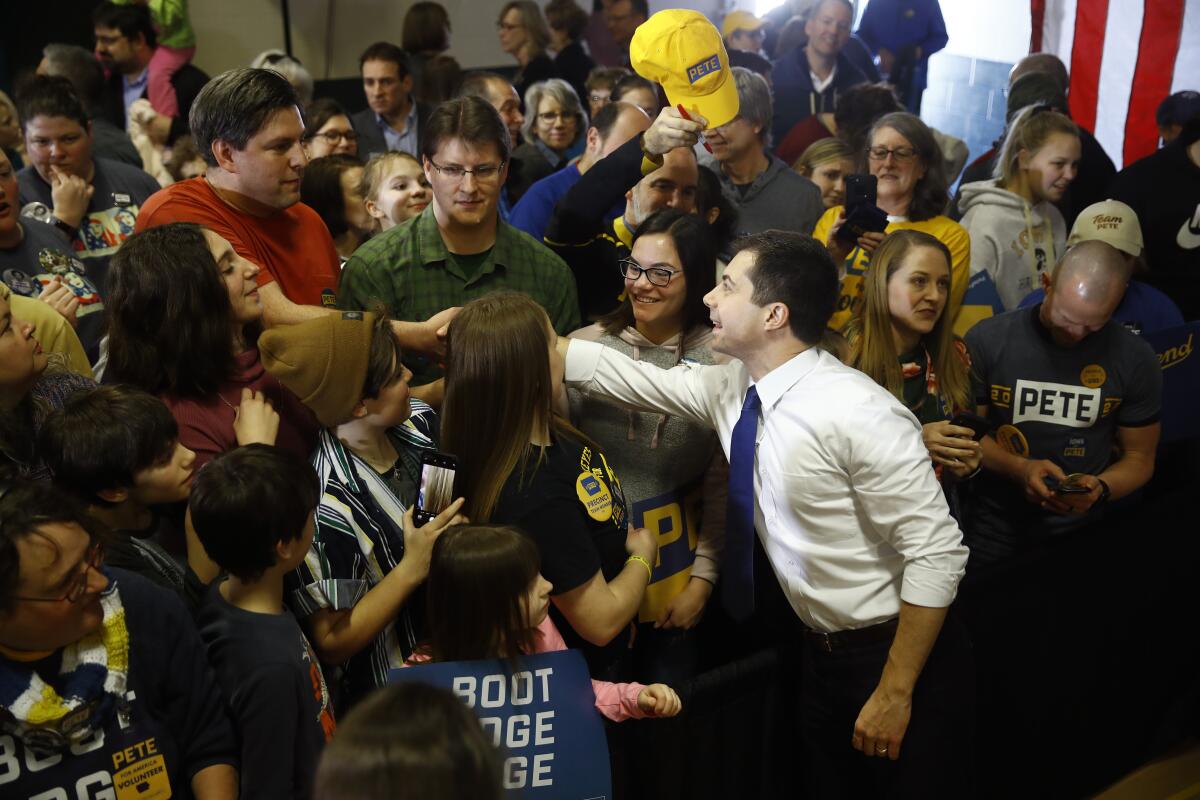
Democratic hopefuls raced Sunday from one Iowa campaign stop to the next, rallying supporters and making their final pleas to the still-undecided in a climactic finish to a presidential contest with no commanding front-runner and no obvious outcome.
Monday night’s balloting represents the first electoral test of strength between the party’s ideological wings and across its generational divide, the pivot points around which the contest has turned for roughly the last year.
It also will test whether voters reward consistency, the near-metronomic repetition of Joe Biden and Bernie Sanders, or prefer candidates, like Elizabeth Warren and Pete Buttigieg, who have been testing different messages and strategies as the campaign has worn on.
The two leaders in national surveys, former Vice President Biden and Vermont Sen. Sanders, finished their Iowa campaigns where they started, with arguments almost unchanged from the day they began seeking the White House — Sanders for the second time and Biden for his third.
The Los Angeles Times’ Mark Z. Barabak has the story.
- Share via
A nearly all-white Iowa town asked itself: Why do we hate?
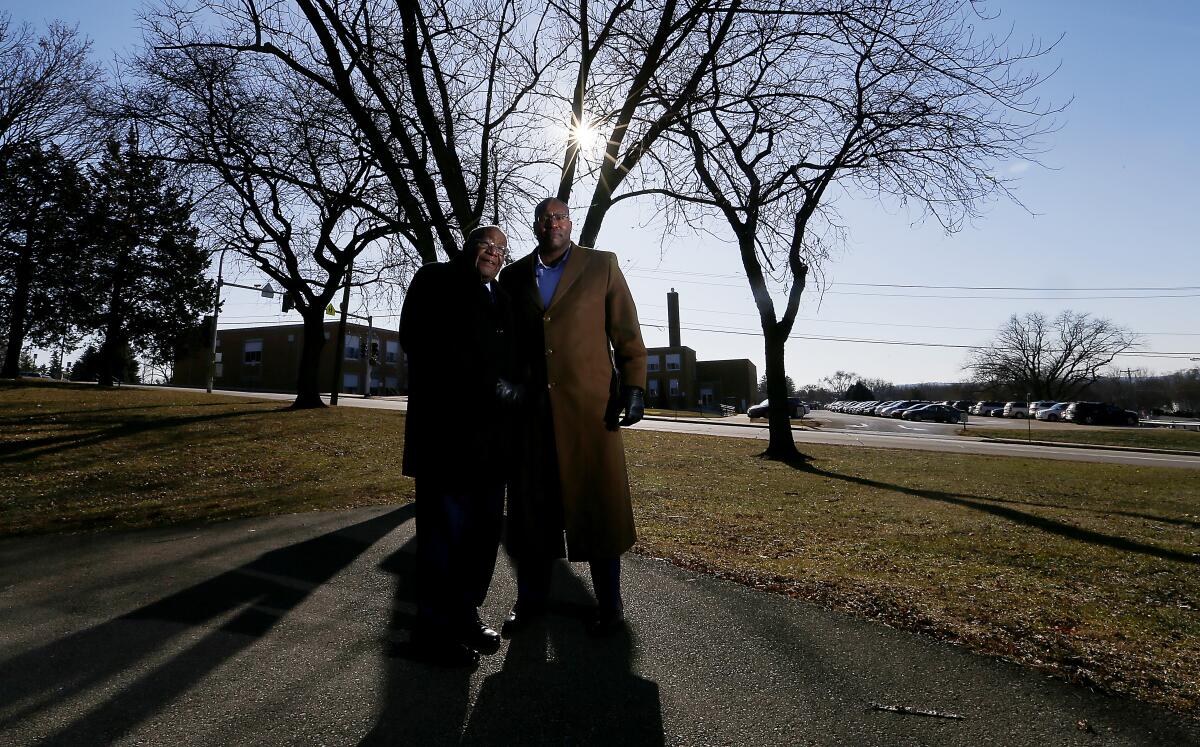
Jason Greer will never forget what it was like to be a black teenager in Dubuque when it tried to bring about racial healing after several hate crimes in the 1990s. The experience scarred him for life.
His father, Jerome Greer, had moved the family here from St. Louis after he was recruited to become Dubuque’s first black school principal in 1991.
Vandals burned crosses to show their disapproval, one within eyeshot of Jerome’s school.
On Monday night, Iowa will cast the first votes of the 2020 presidential campaign. Every four years, the state and its voters face widespread criticism that the place is too white, too rural and its residents too parochial to play such an outsized role. Iowa’s agenda, detractors say, doesn’t reflect what’s important to people of color.
But issues at play in this election — racism, justice, equality, empathy and a reckoning with America’s tortured history of enslaving blacks — are universal ones. They matter in many communities across Iowa, which is 90% white and has one of the highest incarceration rates in the country for African Americans.
The Los Angeles Times’ Tyrone Beason shines a light on the efforts to make Dubuque a welcoming place for people of color, the strides it has made, the struggles that remain and how much is at stake for people of color who live in communities struggling to make amends for bigotry.
- Share via
Senators swarm Iowa as release of a key caucus poll is canceled
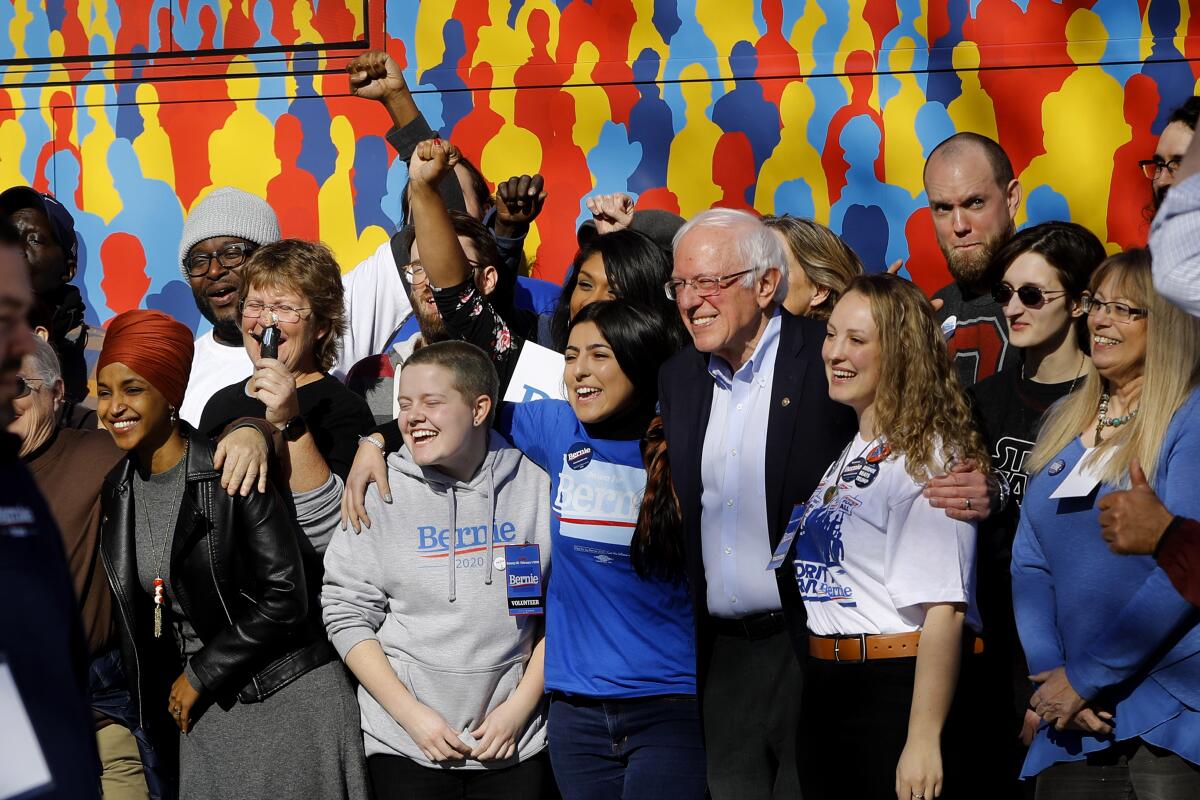
With a break in the impeachment trial of President Trump, Iowa was again awash in Democratic candidates on Saturday, as a flock of White House hopefuls traveled the state in a morning-to-night blitz of campaigning ahead of the first contest of the 2020 election. Three senators previously bound to their desks on Capitol Hill were exultant to be back, and Iowa seemed glad to welcome them; the sun came out and temperatures rose into the 40s after days of snow and cold.
Amid great anticipation, the Des Moines Register abruptly canceled release of its final poll before Monday night’s balloting, due to concerns about methodology.
The survey by Iowa’s leading newspaper has historically been a trusted bellwether ahead of the caucuses, which are typically hard-fought and unpredictable. The outcome will have a significant impact on the Democratic race by winnowing out some candidates while boosting others.
- Share via
What will Iowa Republicans be doing Monday? Caucusing, too
When President Trump traveled to Iowa last week for a big rally, it wasn’t just to troll the Democratic presidential candidates looking for a big caucus victory.
Trump has his own caucus to win Monday night — albeit one that will be exceedingly easy for him to crush. Like Democrats, Republicans also will be awarding delegates in Iowa.
Republicans who show up will be looking at a slate that includes Trump and two contenders who have been overshadowed by him through the entire campaign. Joe Walsh, a former Illinois congressman, and William Weld, a former governor of Massachusetts, never managed to whip up a groundswell of support for replacing Trump on the GOP ticket, or really even scant support. Despite a small but vocal chorus of influential “Never Trumpers” inside the GOP, the two candidates vying to loosen the president’s grip on the party never got off the ground.
But Trump is taking nothing for granted. His campaign is urging Republicans to show up on caucus night to make sure the results track with what is expected of a president facing only token opposition inside his own party.
- Share via
What are the Iowa presidential caucuses and why are they so important to the 2020 election?
Voters in Iowa take part in the first nominating contests in the nation that will shape the momentum of the race.
The results can provide a breakout moment for an unlikely candidate — or end a campaign. The caucuses are also complicated and controversial.
Most Americans, including Californians, take part in a traditional primary election, in which a voter casts a secret ballot by mail or at a polling place before or during set hours on election day. In Iowa’s Democratic caucuses, voters gather at churches, homes, schools or other community spots at a set time and publicly select their preferred candidate.
The Times’ Seema Mehta break down all of the ins and outs for you.
- Share via
On eve of the Iowa caucuses, Democrats play to voter excitement and fatigue
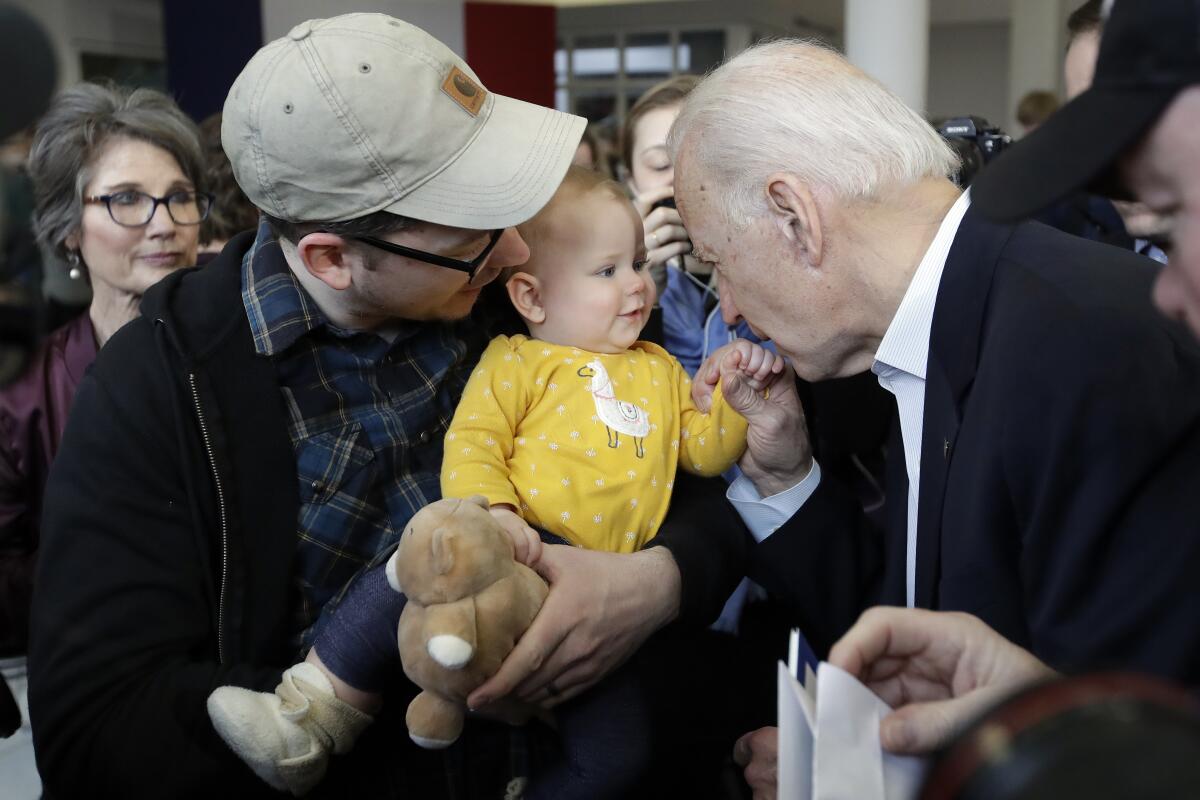
Democratic presidential candidates hopscotched across the state Sunday in their final day of campaigning before the Iowa caucuses, as jittery anticipation of the start of voting mixed with a bittersweet sense of the long buildup coming to an end.
The closing burst of politicking across Iowa marked the approaching finale of what has been an unusually protracted campaign season here. Iowans, who have been courted and cajoled by Democratic presidential hopefuls for more than a year, reported a mix of melancholy and relief that it all would soon come to an end.
L.A. Times reporters Matt Pearce, Tyrone Beason and Melanie Mason take you inside the last scramble to appeal to voters before the caucuses begin tonight.
- Share via
As Democrats dominate Iowa in the lead-up to the caucuses, President Trump asserts himself
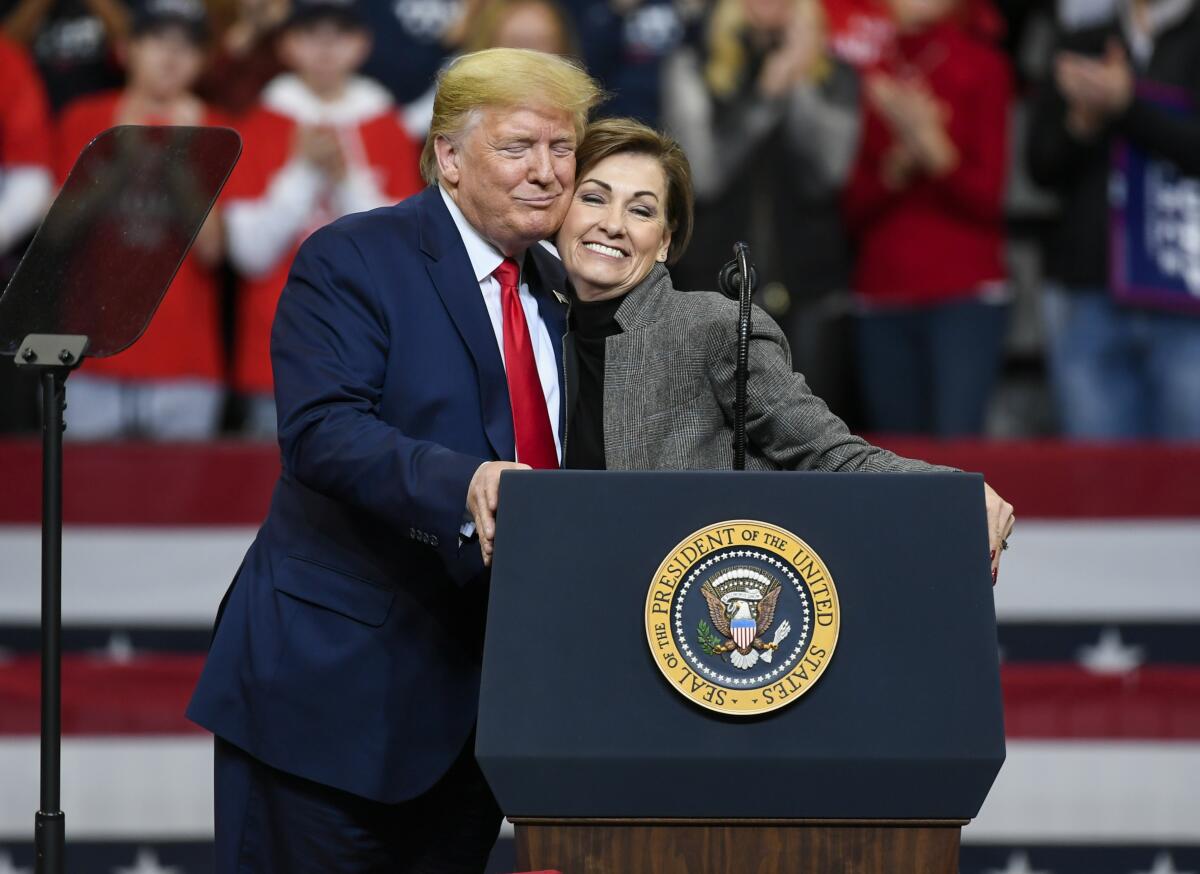
Democrats have dominated the political discourse in Iowa in the lead-up to the caucuses. But President Trump is planning a show of force here Monday, a reminder that the state that tilted in his favor four years ago could be competitive in November.
Scores of Trump supporters, including two of his sons and several members of his Cabinet, will fan out across Iowa ahead of the first-in-the-nation nominating contest. This comes four days after the president held a rally here, speaking for 90 minutes to thousands of people at Drake University’s basketball arena. Trump said the Democrats’ agenda would upend their lives.
- Share via
Joe Biden leads in national poll: Is it a firewall against potential Iowa, New Hampshire losses?
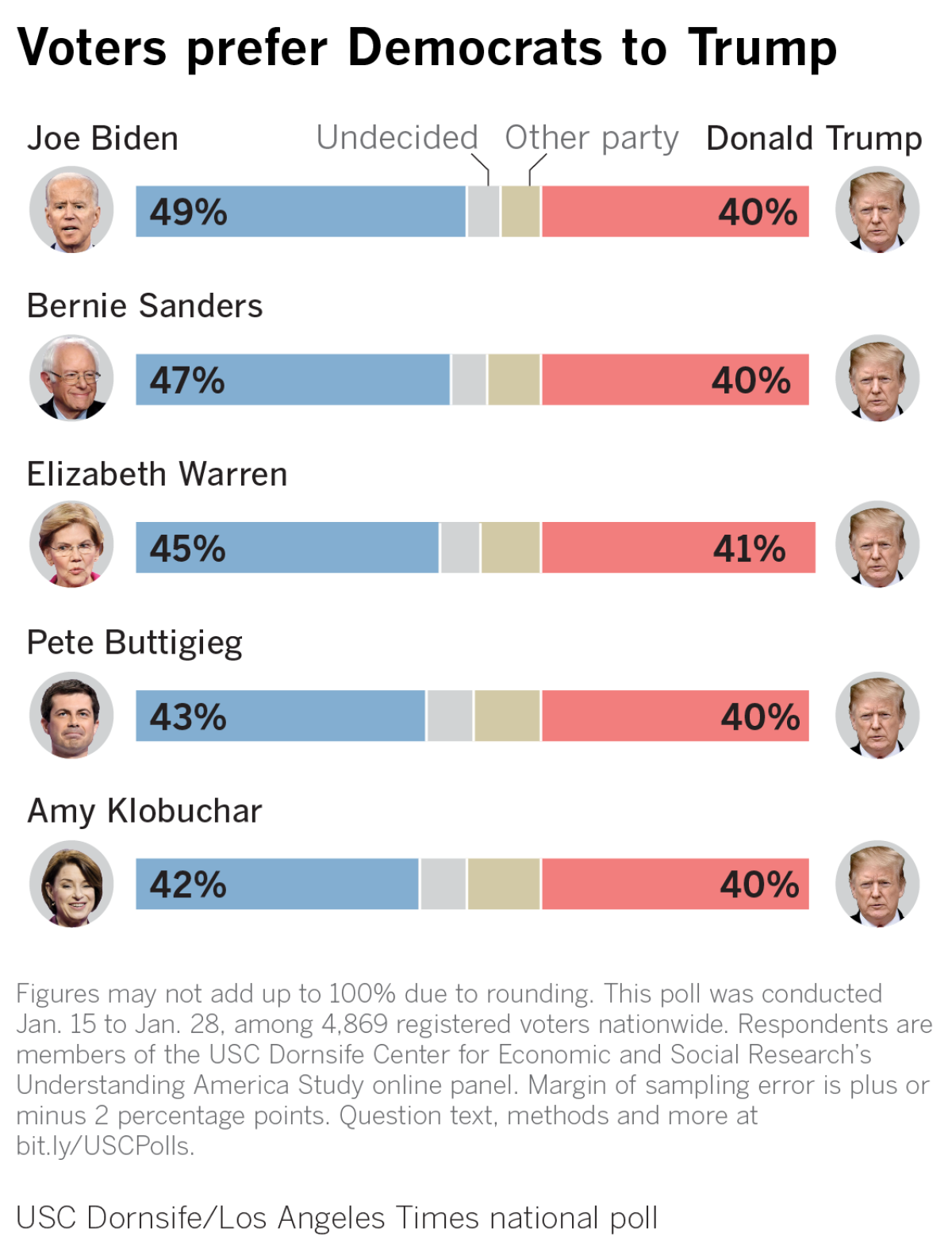
Former Vice President Joe Biden holds a substantial national lead over his opponents in the Democratic presidential campaign, buoyed by support among voters whose top priority is to beat President Trump, according to a new USC Dornsife/Los Angeles Times poll.
The nationwide poll comes just days before the first votes of the 2020 nominating contest are cast in the Feb. 3 Iowa caucuses, and many voters are agonizing over which candidate would be best equipped to beat Trump.
Looking ahead to the general election, when voters of both parties were asked to choose between Trump and each of five top Democratic candidates, the challengers all outpolled the president, but only Biden, Sanders and Warren did so by a statistically significant margin.
Biden fared slightly better than progressive stalwarts Sanders and Warren. Trump trailed Biden by 9 percentage points, Sanders by 7 points, Warren by 4 points, Buttigieg by 3 points and Klobuchar by 2 points, the poll found.
Those hypothetical matchups underscore the importance of gender in 2020: Women favor all of the Democrats over Trump by double-digit margins. Men back Trump, but by single-digit margins.
- Share via
Who are the Democratic candidates for president?
Eleven major candidates are competing to become the Democratic Party’s nominee for president. The nominating process kicks off Monday night in Iowa, and here are the eight men and three women aiming to face President Trump in 2020.
- Share via
Here are the key dates on the the 2020 presidential election calendar

The Democratic presidential nomination process is long and filled with events and key dates to remember.
We’ve created a curated calendar feed that you can subscribe to. The 2020 election calendar will contain key national events leading up to election day. We’re keeping close tabs on important dates and events in California, and will add important reminders for voters here.
We’ll point you to stories to help you understand how these events impact campaigns and the election.
